#the mind control work? directly? more like compulsion? does it change over time? how long did it take to break someone and make them an
Explore tagged Tumblr posts
Text

Me rewatching every Wednesday scene the lesser bad is in trying to figure out how tf I think Hydes work and what their motivation was for every single thing they did all season and if it was really 2 people in that head or just 1, or 2 early on but only 1 later in the season or-
#wednesday#wednesday netflix#I need LORE answers!!! like I have my theories and I could guess but I /cannot/ tell if there’s a switch. because the tells of one /are/#there? especially in the big reveal scene??? but they also proved they can act like fkn Dame Julie Andrews so it could /easily/ be more#performance but if so then what happened? is the original subsumed? buried? did they just /change/? THAT drastically that fast? what about#the questions of free will because it doesn’t seem to exist for a Hyde and that /by necessity/ HAS to have interplay with persona and#personhood. I have so many questions about the motive for so many actions. I have guesses but I want to KNOW. if there was no free will with#a master what happens to a Hyde with the master dead? does it keep following the last command forever? get a new master? become more free#and like a person again? it’s not that they don’t tell it’s that they make a /marked point/ of saying even the most knowledgeable scholar on#Hydes didn’t even know if they basically became a machine or not after the transformation. and that’s a HUGE deal I want to KNOW. how does#the mind control work? directly? more like compulsion? does it change over time? how long did it take to break someone and make them an#enslaved Hyde? does this change by individual? do they have to follow orders but after on their own volition when not already obeying a#command? what the hell could existence be like if not? why don’t they resent the master? or do they? /can/ they? I want LORE ANSWERS DAMN IT#wednesday spoilers#The name implies the original is still buried inside there and you’ve got two separate personas but that doesn’t /mean/ it’s how it works.#doesn’t mean it’s not either though. can they be cured? or learn control? or is it novel reminiscent and you off yourself or become the#monster forever? I need to know I need to know I need to KNOW#obviously most of the actions are mind-control in some form but how the hell does it specifically WORK. *hitting the wall with my black#sharpie so hard the ink goes eveywhere* TELLL MEEEEEE#rip go Wednesday but if I thought someone might have a normal perosna and one that might eat me I would try to figure out if they could help#vs themself in a fight since you don’t know it wouldn’t work and I would NOT chain them to a chair and torture them to try to draw out the#monster like yes u need proof but the ways that could go wrong are so /catastrophically/ wrong did you /read/ Frankenstein? love u girl but#think 18 steps ahead plan for the battle after this one too
1 note
·
View note
Text
A meta and analysis on Takaishi Takeru

Of all of the Tokyo Chosen Children, Takeru is lucky enough to get significant attention for two full series from beginning to end, and his character also goes through some drastic changes in the process, especially through Adventure and 02. There’s so much going on with him that it makes it hard to give a short answer to the question “what is Takeru like?” because there’s so much you could say about him at so many different times.
Fortunately, that’s what we’re here to talk about today!
Takeru in Adventure

At first glance, Takeru seems to be the “tagalong kid” -- the obligatory “little kid character” you have whenever you have a party in a fantasy story. Generally, these “obligatory kid characters” are the kind constantly struggling to catch up with the older ones. Adventure being a series that loves to play with tropes and expectations, though, very quickly says no to that.
Seki: ...We also mixed up the children’s ages, for a bit of variety. Kakudou: The oldest one would be the most unreliable, and the smartest one would be one of the third youngest. Just a little to throw you off the usual, conventional track. Seki: The youngest one would feel too much like a burden to everyone else, and conversely would actually have himself together.
Takeru “doesn’t want to be a burden” -- meaning his feelings on this issue are actually rather much like Hikari’s. Unlike Hikari, though, Takeru reacts to this compulsion differently -- instead of simply repressing things and pretending the problem doesn’t exist, Takeru’s reaction to his own negative feelings is to “have himself together” and act as if he’s got everything under control.
Or, more accurately, pretend he has it together and has everything under control.
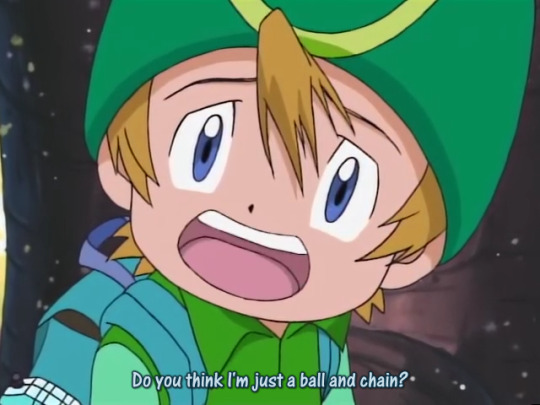
Takeru, for all intents and purposes, was not supposed to be on the camping trip the others were on, not having gone to everyone’s school -- he had to get special permission to go. Takeru’s family is very, very split harshly at this time, with his mother not even able to treat Yamato comfortably. Yamato deals with the familial estrangement badly -- alternating between approaching everyone awkwardly and exploding like an emotional fuse bomb -- but Takeru tries to take it as a sign that he needs to be “responsible”. A lot of his actions in Adventure are him basically exuding this aura of “I can take care of myself!”, and in fact he works very hard to “assert” himself as if he were yet another peer. We even see him make the complaint directly in Adventure episode 43 -- while he is correct in calling out Yamato for coddling him and him only while recklessly disregarding the others, the fact he specifically complains about Yamato approaching him as someone holding them back if he’s not protected reveals a lot about his own mentality regarding the situation.
One of his first major scenes in episode 2 is him offering his own food for the pile of supplies everyone has, even though it’s just snacks. Which is, probably, a pretty accurate summary of Takeru’s character at this point: on the surface he’s responsible, well-behaved, and capable...but, in fact, he’s still about as immature as an average eight-year-old child would predictably be.
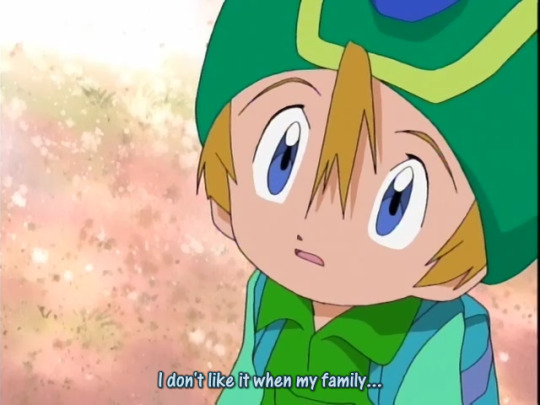
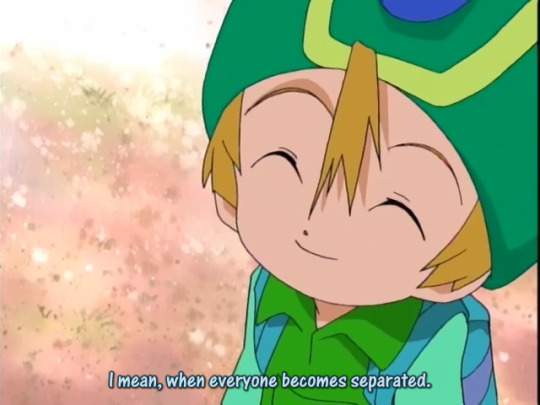
Yamato spends his Adventure character arc pretty openly angsting about his relationship to Takeru and how his family’s split has affected them, but throughout the entirety of Adventure (and, eventually, 02 as well), not only does Takeru rarely if ever touch on it, there are indications that Takeru deliberately tries to dodge the subject or not dwell on it too much. In Adventure episode 12, he actually outright lies to Patamon about his younger childhood memories, claiming he “probably doesn’t remember” anything about it despite the audience very clearly being shown that he very much did, and in episode 26 he comes very close to leaking his actual feelings about the group being separated being tied to what happened to his family, before quickly covering it up and trying to move on with the topic.
In other words, unlike Hikari, who knows exactly what she’s feeling but is compulsively unable to vocalize them, Takeru actively suppresses his negative feelings and tries not to dwell on them too much. Again, this comes from his desire to “not be a burden” on others -- he’s got this situation under control! Everything is fine!
And this has a very, very nasty payoff. While Yamato clearly deals with his emotional issues badly, tending to get very explosive about it, Takeru’s way of coping isn’t actually all that much better in the long run, because Yamato’s frustration and openness about his emotions at least lead him to being very straightforward about his feelings, incredibly self-aware and sometimes even self-conscious, and ultimately able to get at least some degree of catharsis from the situation. Takeru...not so much.


Takeru is a child, no matter how much he tries not to act like one, and it ultimately results in him reacting disastrously whenever something hits him too emotionally hard -- which results in Takeru suddenly becoming irrationally stubborn and even angry. We later see what it takes to actually break through Takeru’s facade of “totally having this together” in Adventure episode 22, which is also the first time he openly breaks down wailing in front of anyone besides Patamon -- and it��s, of course, when PicoDevimon convinces him that Yamato hates him. The interesting part is that this is so blatantly a lie that even Tokomon is able to quickly call bullshit on it, but Takeru, previously having worked so hard to maintain this facade of being responsible, falls for it completely with utter irrationality -- and it really does suggest that Takeru’s fear of losing yet another member of his family, and being a burden to Yamato, runs so deep that it causes that entire facade to shatter in one blow.
Which is where the problem lies: Takeru’s habit of suppression is so bad that once one of his triggers is hit, he completely loses all sense of rationality and blows up, and it becomes nearly impossible to reason with him because he locks down on becoming stubborn. It’s also dangerous because even he isn’t particularly self-aware of what he’s doing when he blows up like this; at least Hikari was very consciously aware of her suppression problem, but Takeru never really seems to have any awareness of the fact that his covering up of his feelings is directly related to some of his worst moments. We see it cause problems between him and Patamon again in Adventure episode 33, when Patamon asks a rather innocuous question about the brothers, and it hits Takeru’s trigger so badly that he snaps at him, resulting in the fight that kicks off the plot of the episode.
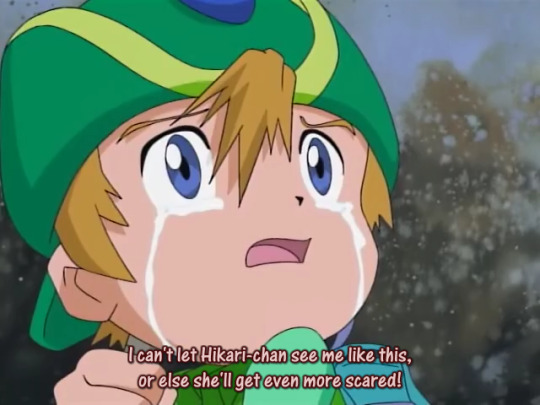
Adventure episode 52 is basically a major test for Takeru as to whether he really can hold himself together in a situation where everyone else older than him is gone, and “having himself together” is something he has to actually do instead of just have the surface facade of. He does, ultimately, pass, and this is why the Crest of Hope glows this episode -- but it’s also made clear that it wasn’t quite as easy for him as he would normally pretend it is. Of course, it also helps that Piemon is genuinely the scariest threat they’d faced during that time, but it also reveals that, yeah, ultimately, Takeru is an eight-year-old child who still has to struggle to put on a brave face so that Hikari doesn’t get impacted by his own fear.
For all it’s worth, although we get a ton of depth into his background and mentality, Takeru does not actually change that much as a character over the course of Adventure. This incident is probably what changes him the most in terms of him gaining a more solid core, and he also learns to accept the inevitability of fighting after his stubborn refusal to engage in it all the way back in Adventure episode 12 -- but for the most part he still does remain a bit naive about the world at large, and, more importantly, his issue with trying to cover up his problems with a confident smile never really gets addressed. At most, he’s willing to admit his grief over being separated from Patamon in Adventure episode 54, but even that is something Takeru tries to bounce back from quickly, much like with the first time he cried with Patamon in Adventure episode 12. But there’s nothing to indicate that his problem with emotional management isn’t going to continue being a problem from here on out if left unchecked.
That problem ends up taking another three more years to get addressed.
Takeru in 02
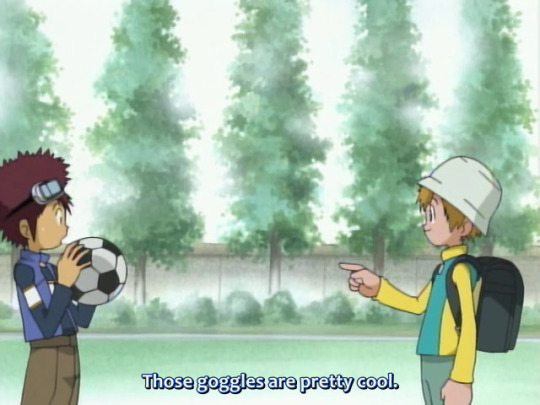

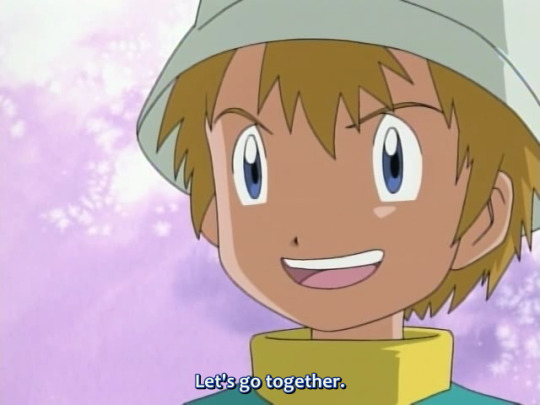
Takeru is one of the first people we meet in 02 (for reasons that end up revealed in the final episode), and right off the bat we learn that he’s a bit...evasive. He leaves a cryptic line to Daisuke about his goggles without coming even close to what we all know is the full extent of what’s on his mind (that the goggles specifically remind him of someone important to him), and later just...deflects Daisuke throwing accusations at him with a mild dismissal. In fact, even though Takeru pretty clearly understands very quickly what’s going on with Daisuke and how touchy he gets with the Hikari issue, he keeps dodging the question and constantly saying things that are evasive about it and therefore never truly helps his case until episode 17, when the circumstances between why Hikari and Takeru knew each other are finally properly clarified to Daisuke and he stops getting on their case about it on his own.
There were multiple points in time before this -- especially in episode 7, when Daisuke is practically at his worst in regards to approaching Takeru -- when Takeru could have easily said something to at least attempt to get Daisuke to stop bothering him, but Takeru never even asks him to cut it out! He simply continues to handle everything with a “yeah, okay, sure! :)” attitude, which of course confuses Daisuke (who’s rather allergic to people not being straightforward) rather thoroughly, and you wonder if he’s practically enjoying seeing Daisuke’s antics to the point he’s just enabling it further.
As a point of aside trivia, the official 02 website adds the fun detail that apparently he's popular with the girls at school but doesn't show much interest in them himself, and the Animedia audio commentary CD for Armor Evolution to the Unknown had his voice actor even express the opinion that he saw Takeru as someone who wasn’t really the type to think about romance at this age (adding in a separate interview for the 02 DVDs that he felt Takeru was respectful of girls primarily due to having been taught by his single mother to be such). The latter part of course isn’t something that comes from the writing, but given the website trivia I’m inclined to personally agree with it -- and, more importantly, the implication is that Takeru is at least aware of these kinds of things, but actively chooses to not think about it and deal with it when the time comes.
So in other words: That part about how Takeru actively suppresses things that are negative or inconvenient to think about, all for the sake of keeping a smile plastered on his face? Yup, still there.
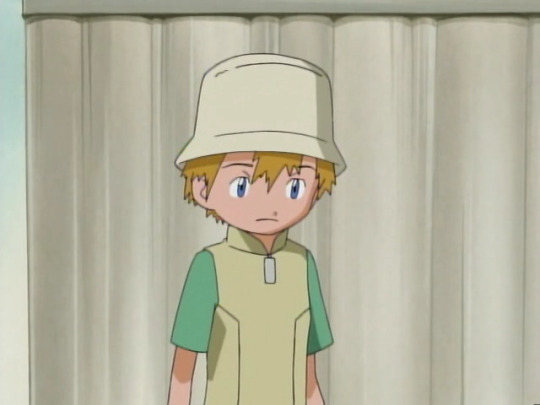

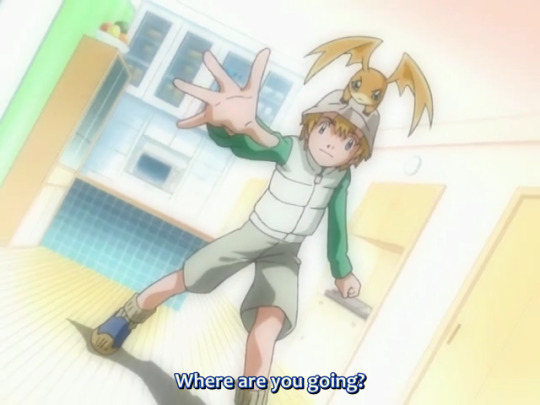
In fact, a blink-and-you’ll-miss-it moment from 02 episode 17 implies heavily that, even with their parents having developed a more cordial relationship after the events of Adventure, Takeru is now emotionally dealing with the aftermath of his parents’ divorce worse than Yamato is, since Yamato is at least able to speak about it casually and even joke about it openly, whereas Takeru keeps his mouth shut and the framing of the shot heavily implies he’s still extremely sensitive and unable to vocalize his feelings on it. Takeru never brings this up as something eating away at him for the entire series -- but BelialVamdemon uses it against him in episode 49, revealing that, yes, this is a problem that’s still tearing away at him, and yet he’s refusing to be open to anyone about it, even to Yamato himself. (Especially since, again, Yamato seems to be doing a great job trying to move forward; why kill his mood and thus be a “burden” to him?)

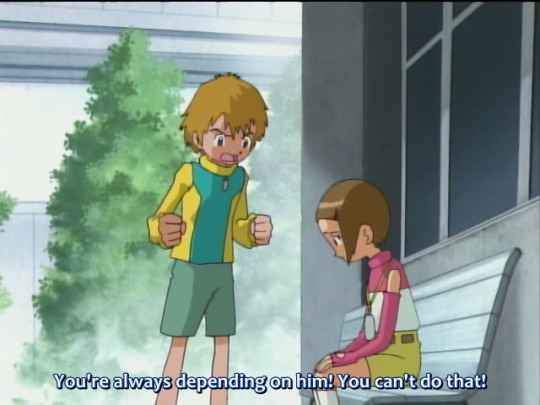
Even so, Takeru is very different in 02 partially because his circumstances are completely different. Adventure had him as the youngest in a group of older kids, so in terms of “being a responsible child”, that naturally meant being deferential and polite to everyone due to standards of propriety. 02 is where we learn a lot more about how Takeru interacts with peers his own age and people who are outright younger than him, when he has a bit more leeway to be more assertive.
On top of that, back in Adventure, Takeru was a young child who had a very small “range of periphery” -- as a young child still rather naive about the world, his emotional investment in things primarily pertained to loved ones and the people around him. But now that he’s a bit older, he’s gained a certain degree of strong feelings about “what’s the right thing to do”, and now has very strong opinions on it.
These things ultimately manifest in, unfortunately, Takeru losing his composure much more often than he did in Adventure, and for reasons that pertain to much wider things than just his brother. Still not having recovered from the trauma of losing Patamon back in Adventure episode 13, Takeru starts physically fighting Daisuke in 02 episode 11 because he perceives Daisuke as not doing enough to prevent Patamon from potentially becoming a slave to the Kaiser, and in 02 episode 13 he lashes out at Hikari in frustration about her refusal to do anything about her situation (which he of course ends up deeply regretting later in the episode).


Takeru’s infamous scene of suddenly switching modes on the Kaiser and punching him out in 02 episode 19 is basically the pinnacle of this -- because, yes, the Kaiser really did deserve it, but this really is not a good thing for Takeru either. This is Takeru getting the closest we ever see him to being a genuine sadist, and it’s basically everything to do with his emotional stuntedness coming out at once -- blowing up in anger out of nowhere with a passive-aggressive demeanor, succumbing to the weight of his trauma in the worst way possible, and mixing the ^^ front he puts on with his tendency to blow up angrily at anything that cuts him a little too emotionally close.

And for the first time, we see someone actually acknowledge how bad this is. Iori, one of the most consciously perceptive of the group, witnesses, for himself, the sheer jarringness of Takeru seeming to only really have two modes between “all smiles” and “unreasonably angry”. Sure, Takeru had shown a penchant for getting active as soon as there was something he needed to protect, but the moment it got personal, Takeru suddenly blew up in front of his eyes and almost turned into a completely different person. (Perhaps he’s not that different from Yamato after all...)
This is a very important moment because it sets up the base for what ultimately becomes the Jogress arc between Iori and Takeru. Daisuke ended up reaching out to Ken because Ken was someone who needed someone to accept him and teach him to move forward instead of drowning in the past; Miyako ended up reaching out to Hikari because Hikari knew herself to have a suppression problem but had difficulty doing anything about it, so the extremely in-your-face and aggressive Miyako could go in deep. But with Takeru, since his personality is genuinely volatile, and because Takeru goes out of his way to hide the fact he’s having emotional problems, personalities like Daisuke and Miyako wouldn’t help much because they’re too straightforward for someone like this who’s a bit unpredictable -- whereas Iori, who’s assertive but also methodical and thinks through everything consciously, is eventually much better able to reach out to him.
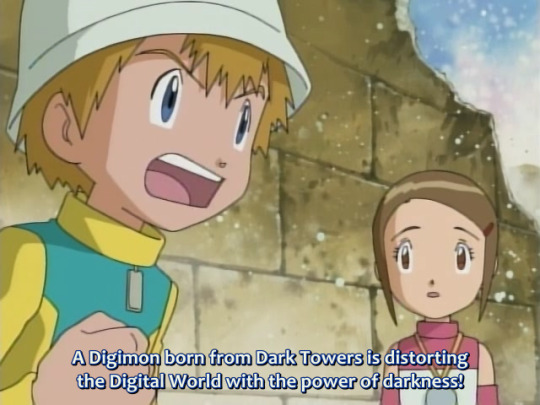
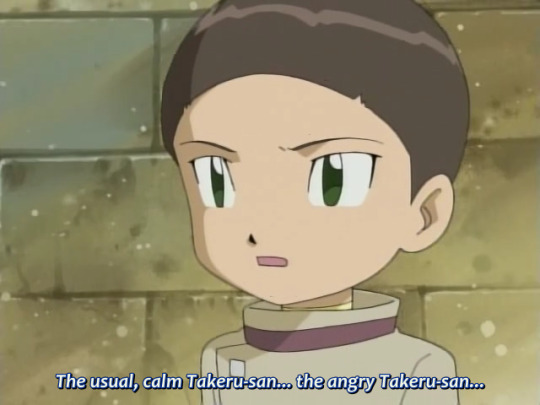
Once the relevant arc kicks in, in 02 episode 34, Iori continues to observe Takeru, and quietly notes the many “contradictions” in Takeru’s behavior -- since, after all, Takeru starts to sometimes violate what you’d think would be common sense whenever he gets too emotionally compromised. The fact that ostensibly one of the outwardly “nicest” kids in this group suddenly blows up in certain circumstances and basically goes “absolutely nope, needs to be killed!” in the midst of a few moral debates over killing sentient Digimon disturbs him deeply, and really, it’s not even about the killing part (after all, it’s later established in 02 episode 43 and after that Takeru and Hikari have a certain degree of acceptance of the inevitability that the others don’t) as much as Takeru’s being pretty gung-ho about it. Not “I don’t like it, but we have to” like he said earlier, but NOPE, GOTTA DO IT.
Iori refers directly to the duality of Takeru that he doesn’t quite understand multiple times in this episode (including in regards to the incident back in 02 episode 19), and it continues to torment him until the end, when Takeru only gives a very cryptic “clarification” that he doesn’t necessarily hate the darkness per se.

Iori, too intimidated to ask Takeru about it directly, goes to ask Yamato in 02 episode 35, and Yamato finally clarifies the background that we as the audience knew but Iori didn't: the story behind Takeru's trauma regarding the loss of Angemon back in Adventure episode 13. Yamato also makes a conjecture about why Takeru has been acting so ambivalent towards Ken -- you'd think he'd still be under Takeru's scorn after the events of 02 episode 19, but in fact Takeru's judgment of him in episode 25 was simply that he was certain something had changed, yet he couldn't tell what he was thinking (really rich coming from someone who refuses to tell anyone else what he's thinking himself!). Yamato guesses that Takeru is inclined to be a bit more forgiving of Ken due to understanding the feeling of losing a partner -- and the ultimate conclusion here is, basically, that Takeru's behavior is contradictory because he's acting based on what's personal to him, not necessarily via principles that make sense. After all, back in Adventure, it was clearly demonstrated that Takeru isn’t exactly rational when things hit too close to home.
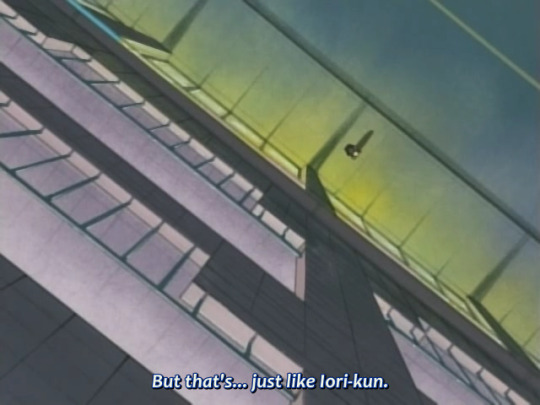

The other important thing that happens this episode is that Takeru learns that Iori is actively trying to reach out to him, when Yamato drops him a line informing him that Iori asked. Despite complaining that Iori could have just asked him directly, after Takeru witnesses the face-off between Iori and BlackWarGreymon and a demonstration that Iori is clearly trying his best to make sense out of this entire mess, Takeru actively reaches out to Iori and says something to comfort him -- “a life is beautiful simply by existing.” It’s still cryptic as hell, but it’s not something he would have said in the midst of his anger in prior episodes.
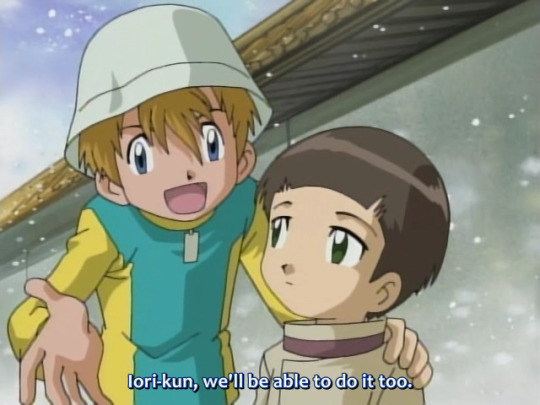

It would be one thing if it were simply that by itself, but the following episodes further push the idea that Takeru really is starting to change after witnessing all of this. 02 episode 36 has him explicitly acknowledge what Iori’s been doing this whole time in trying to understand him for the sake of their Jogress, and, finally, during their meal later that episode, he says, very openly and honestly, that he thinks they’ll be able to do it now. After two instances of Jogress, these kids are very aware of what that entails -- so this is basically Takeru consciously acknowledging to Iori “yes, I understand that you’re trying to reach out to me, and I accept it and want to understand you.” Because Takeru is such a convoluted sort of person, this “understanding” ended up being something that didn’t span a single magical moment as much as it took several episodes and a diplomatic, conscious affirmation on both ends -- but it’s a fitting way to go for someone who had always indicated some pretty poor conscious awareness of where his feelings were taking him.
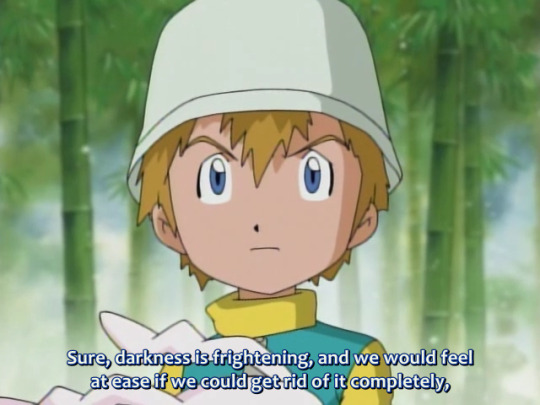

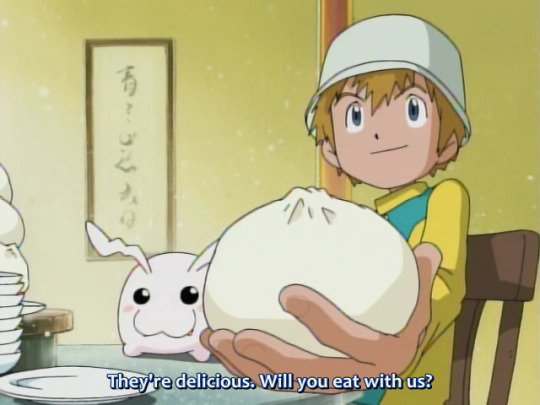
This is especially because, in 02 episode 37, his statements to comfort Ken are in pretty significant opposition to the sort of anger he’d displayed in earlier episodes, and are now a more pragmatic view of the issue in light of Iori’s efforts and everything he’d just witnessed with BlackWarGreymon -- and to drive the point home, the episode has, at the very end of it, Takeru making his first true explicit show of goodwill towards Ken after having been a bit touchy with him for so many episodes.
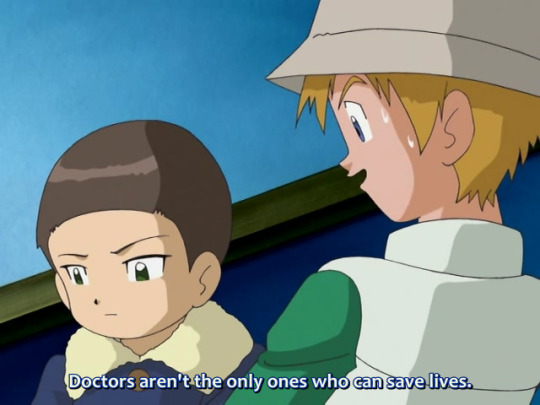
Iori himself, being the youngest of the 02 group, still has a lot to learn, and so Takeru, who had previously been one of the youngest in the Adventure group himself, now has his role inverted to effectively be a guiding mentor to Iori as he finds his own way. Basically, Takeru becomes responsible for the welfare of this young child, and so his way of treating Iori is markedly different from the more detached and playful way he would treat others from here on out. This is especially because, earlier, Yamato had informed him that Iori had taken a very roundabout way to help understand him better, and so Takeru probably understands that he scared the hell out of Iori earlier and needs to do better. While the Takeru of 02 episodes 38-50 still has a way of being playful, and while he still isn’t completely straightforward about his intentions, he is definitely much better about being open with the others, especially Iori, instead of doubling down on his “everything-is-fine” mode.
And perhaps this is what the other meaning of “hope” thus became in this situation -- learning to be forward-facing even in the midst of truly knowing and understanding everything that’s wrong with the situation.
Post-02
Although Takeru’s Spring 2003 track is addressed to no one in particular, meaning that it’s the most likely reason he’s so willing to be open about it, Takeru outright admits he’s having problems with his emotions -- especially those pertaining to Angemon’s death. We do, however, learn that Takeru’s started writing the early, early drafts of what’ll eventually end up becoming the novels he writes as a future career.
This being only a year after the events of 02, Takeru’s position is interesting. His decision to start writing is that he wants to have a record of everything before it’s forgotten -- because these things are very personal to him -- but he’s not emotionally ready for the huge task of finalizing everything in words, to the point he still hasn’t told his mother he’s started writing yet. After all, this is a book we eventually find out takes upwards of twenty years, and so this is the presumable reason why -- being able to get this down in a rational way that’s not emotionally compromising is going to be an upwards battle for him.

Even come Kizuna, there’s still a long way for him to go, because an actual line (in a very fast-paced movie) is dedicated to establishing that he’s still uncomfortable with his novel progress to the point he won’t even let Yamato see it. His official character profile and background details are revealing, too -- although he’s currently taking language classes in university and is even part of a children’s literature club, he still hasn’t actually decided on what to do with his future, meaning that he hasn’t determined that he’s going to be a full-time novelist with these yet. That means that even though he’s clearly still clacking away at his novel (multiple indications in the movie are given as such), his memoirs are still at the level of being so deeply personal, and not something he feels comfortable telling well, just yet.
I’ve pointed out before that despite not appearing directly with them in the movie, Takeru and Hikari have more in common with the others in the 02 group than they do with their Adventure seniors, and this is fully codified in the drama CD when Takeru is content to basically just “do whatever” with the rest of his friends instead of having any particular concerns about his future. And as someone who has a tendency to kind of just let his emotions take him wherever they’re going, this isn’t too surprising. Although he approximates as the closest to level-headed during most of the group’s antics during the CD, he’s still completely guilty of enabling them full-force, after all...
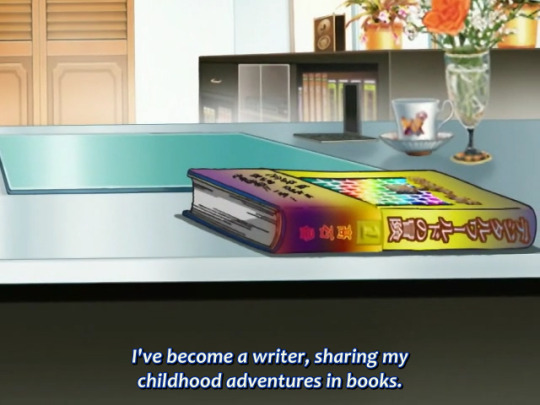
So, with the 02 epilogue, we get the massive meta reveal that the entire series was Takeru’s novels the whole time. This was planned to be the ending for Adventure before recording for the first episode had even started, but was postponed to the end of 02 when the second series was greenlit -- and if you’d followed the Japanese version, there are a ton of meta hints scattered around from day one:
The narrator of the series is Hirata Hiroaki, who played Takeru and Yamato’s father, and is revealed in this episode to voice him as an adult as well;
Episode 12 of Adventure is named “Adventure! Patamon and Me” and is the only episode title in Adventure or 02 to use a first-person pronoun -- and it’s of course a Takeru-centric episode, with the episode title using Takeru’s boku;
02′s first episode kicks off narrated by young Takeru opening the story, with Takeru himself suspiciously omitted from the opening vignettes;
02 episode 18 suddenly has the narration cut in when discussing Takeru’s trauma from Adventure episode 13, with the younger Takeru even filling in part of it himself;
02 episode 49′s “next episode” preview for 50 suddenly also starts using “we”, which also includes Takeru’s boku;
Finally, Takeru starts narrating right after Oikawa’s death, which fades into what’s revealed to be his adult voice.
In the context of Adventure, Takeru was “the youngest child”, so the idea makes sense that “the littlest one” would be the one to grow up and reflect on all of the adventures they had as kids -- and once 02 was added, it practically made sense that Takeru would be the one to recap both adventures, being the one person who was there to completely witness both (it also explains why Takeru and Hikari’s character arcs remain somewhat unresolved by the end of Adventure compared to others, since by this time it was apparent their story would be continued in the second series). So on a meta level, Takeru is, in a certain way, one of the most important characters in both groups.
On a level relevant to his personal character arc, on the other hand, the point here is that Takeru finally managed to put together his book and story in a way that he was comfortable telling the entire world about, to the point of choosing to make his entire career into it. That’s something that requires a lot of coming to terms with what happened, how he feels about it, how others feel about it, and everything about the whole ordeal in general, without compromise or (too much) bias.
And in the end, that’s really a lot!
299 notes
·
View notes
Text
The Demon You Know
Day 1 Urban Fantasy AU | Magical/Supernatural Creatures | Time Travel
So, something a little off the grid for my first day of DickTim Week 2021. Special thanks to my wonderful babe @vellaphoria for the beta and the incredible peeps on the Capes and Coffee discord (looking at you @themandylion, @strawberryjei and others). Also need to show my undying love for @chippon because babe, we are making it work.
**
When the sun creeps up over the sky in Gotham, then it’s time to GTFO. Capes in the daytime aren’t the usual for the city, and Red Robin has been playing it too late, staying out far past O’s warning to bring it in for the night. So, really, he’s only got himself to blame.
His penthouse perch has seen more use in the last few months since, welp, Gotham and the fact he likes to get away from the team mentality sometimes, like to return to his roots and run the rooftops like when he was still that Robin. His trips to the Manor had become more frequent since B was back in the cowl and things in the family seemed to be returning to some semblance of normal.
Well, as normal as it could get, really.
But all that goodwill and positivity is literally ghost. Red’s hands are shaky and his inner calm is absolutely blown. He’s ducking into his perch to throw his suit off, grab his duffle bag full of sundries and fake idents, then he’s going to hit the airport as fast as he can get a flight the hell out of town, away from the terrifying sight.
(He should just call Bart or Kon or Cassie, tell them he needs an out faster than he can arrange it himself, he needs to get away from–)
He knows he fucked up when the slight sounds, small and metallic in nature, make it past his pulse thumping in his ears.
Like a horror flick, he slowly turns as the front door gives a groan and is pushed open by a very familiar palm.
Dick’s blue eyes fall on him like a ton of bricks, on Red Robin’s feet frozen to the floor, his suit only half on, and no way he can get far enough to throw himself out a window.
Fuck.
“So,” Dick keeps his voice soft, footsteps easy as he steps inside Tim’s penthouse and closes the door behind him, “you finally found me out.”
Keeping his mouth shut in times like this has really saved his ass before, so Red doesn’t say a word, keeps every muscle in his body ready to spring for the right second –
Watching the would-be robber struggle in Dick’s grip, watching the light show brighten overwhelmingly, seeing what had to be-had to be feeding.
“I figured it would be you if anyone, actually, so I’m not really surprised, just… disappointed.” Dick continues softly, only in jeans and a t-shirt since Nightwing was oddly missing from the patrol roster last night.
And Red is apparently the only one that knows why.
“But that doesn’t mean I can just let you go, Timmy,” Dick isn’t stopping, his whole body lax while Red is wound tight, backing away from the man he thought he knew. “I really wish you hadn’t found out like this. I...I had other plans.”
Whirlybirds and pellets aren’t going to help him here. Hand-to-hand and martial arts, aerial acrobatics, none of it is going to make a difference.
His throat goes dry when Dick’s eyes get more and more blue, when his former mentor doesn’t stop advancing, and Red Robin is running out of room to back away.
“I tried to save you, Timmy. I tried so hard to get you away, out of Gotham, even if you went because you thought you had to find Bruce, I’m the one that gave you the compulsion to leave.” The low laugh is edged with something desperate, “why the hell couldn’t you stay away?”
“This is my city, just as much as Batman’s. You taking my fucking cape wasn’t enough,” Red Robin bites out, back thumping against the kitchen counter, realizing Dick had backed him into the corner. “How did you keep it from him? Constantine, Zatanna, all the magic users he has on speed dial and he never figured you out? No one in the JLA or Titans did?”
That makes Dick pause.
“He never had to. He knew what my parents were before they ever died, Timmy. Haley’s Circus came to Gotham regularly. Bruce always knew.”
The information blast hits him painfully, that Bruce didn’t bother to tell him and look at where they are now.
“And he didn’t try to help you?” Red, Tim, gapes at the still silhouette that used to be someone he thought he knew like he knew himself. Someone that’s always had this secret. “He didn’t try to –”
“Cure me?” Dick’s mouth lifts in a semblance of a smile Tim knows. “There is no cure for this, Timmy. It’s what I am. What my parents both were, the curse of the Romain Bababiljos. It’s unfortunate for me both of them were cursed, that just makes the...the hunger two-fold.”
And it’s just a few more steps, a raised hand that makes Tim flinch back, but only a fingertip taps the edge of the domino, makes the whiteouts raise.
Automatically, with everything he’s learned, studied, experienced about supernatural creatures, he ducks his head so he isn’t looking directly into those eyes. That doesn’t stop Dick from bracketing Tim in, both hands on the counter, their bodies a breath apart.
Dick laughs softly, close enough for Tim to feel the breath on his face. “The Titans...I never had to tell them. By then, I could control myself, at least mostly. The JLA? I’m one of the Batman’s proteges. I’ve been fighting crime since I was eight. They believe in me. There was never a reason for any of them to look too deeply past the surface.”
“Wh-what do you mean mostly?” Tim’s heart slams in his chest, “how many people have you killed, Dick?”
“Do you have any idea how awful the hunger is?” And the lower Dick’s voice goes, the harder Tim’s heart starts to pound. “Surviving on hugs and family affection is tantamount to starvation for someone like me. It’s so easy to kill someone during sex because the hunger is so much I can’t control it sometimes. Anyone I’m with is in danger. That’s why I couldn’t stay with Babs, she’s too human. The one time I came close–”
Dick breathes again and all Tim looks at is the span of throat, thinking of the soft, vulnerable parts, anything he can use to get the fuck away.
“–but I didn’t. I have...willpower sometimes. I drained her so close, though. She was-was so fragile, Timmy, and I was so hungry. I’d been starving for so damn long. She was hospitalized for longer than she’d been when the Joker shot her, and I said never again. But Wally and Kory were...different. I could go further with him without killing them, I could get more full than I’d been in a long time. It was still dangerous for them, but I was so far gone by the time...”
“They’re both still alive. Babs is still alive. Does she–?”
“Remember? Of course not. None of them do. I made sure of that, Tim, so none of them would be afraid of me.” And the air changes when Dick gets closer, his eyes get brighter, and Tim almost chokes with the almost touch to his body under his suit. “But, you are going to be different, aren’t you? I’m not going to be able to convince your mind that what you saw was a dream.”
“So what? You’re going to make me “disappear”? You’ll give Bruce some sob story about how I got tired of the vigilante life and left for college or some shit? Going to bury me where no one will ever find me?” He isn’t looking at Dick’s face, can’t see his own end coming, can’t believe he’d put all his faith and belief in this man only to have it all come to this.
Tim laughs wetly, blinking rapidly, and everything suddenly comes together. “He won’t ever come looking for me anyway. You made sure of that when you made Damian your Robin. Nice plan, Dick. No one is going to give a shit if I’m never seen again anyway.”
And it’s stupid not to at least try, not to duck and kick out, trip up whatever Dick really is, to break a window and fucking run, try to get Bruce, Clark, Kon and Bart and Cassie, to get anyone to listen to him about what Dick really is, to try to save himself.
(If you’d never figured out Dick was Robin, if you never put yourself in front of him, you’d be safe now. Miserable but safe.)
Even if it’s his own brain pan spitting this out, he knows it’s bullshit.
If he’d never approached Dick Grayson with proof Batman was losing his mind, Tim Drake wouldn’t have reached twenty-one. The way his life was going, he would have probably hung himself long before getting to this stage in his life. If he’d never had Bruce or Alfred or Dick or Steph, if he’d never had Robin, never had Young Justice or The Titans, if he’d never had the Clench, never felt the rumble under his feet as Gotham had fallen, if he’d never had the agony of losing everyone in his life, if he’d never had the drive to prove his adopted father was alive…
The civilian Tim Drake wouldn’t have had the strength to make it through life alive.
So if this is the way he goes out, if Dick is the one that ends it for him–
There’re worse ways to go.
He’s not going to be the Joker’s next victim or Ra’s al Ghul’s heir with a mix of Lazarus Pit crazy. The HIVE, the Light, the mass of aliens he’s fought, any number of Rogue Gallery thugs, none of them will be the ones to take him out.
But this?
His career as Robin started out with Dick Grayson, so maybe...maybe it’s fitting this is the way it all ends.
He sucks in a breath and finally tilts his head up, looks up into those electric blue eyes, and lets his breath out so so slow.
Because Dick is looking at him with watery eyes, with a grimace, with something Tim can actually recognize.
But those eyes light up in his penthouse perch, take on a supernatural glow, Dick snatching his wrists in bigger hands, pulling Tim closer, the heat getting through layers of Kevlar and Nomex. And just like that, he can’t pull away, can’t pull back.
There’s no way to defend himself when Dick pulls him in, when he expects to get his throat ripped out, his neck snapped, something important crushed, for the darkness to take over and his heart to slow down to a sad, weak pitter patter.
He can’t defend himself when Dick kisses him, opens his mouth, and stuns him into going completely slack.
“I told you,” Dick growls softly when he pulls back, bends enough to get Tim laid out over his shoulder, “I had other plans.”
But Tim can’t reply, can’t do anything other than lay across Dick’s back as the Romani love deamon strides down the hallway and kicks open the bedroom door.
**
And if Tim Drake survives until morning, shocking the hell out of the both of them, staring up at Dick’s surprised face and glowing blue eyes, if the soft touch to his jaw contrasts sharply with the bruises and red marks blossoming all over his body from an intense night with his supernatural mentor and best friend, if Dick doesn’t whisper, “finally, finally, my mate,” before kissing him.
If the power Dick drains from him doesn’t kill him, doesn’t do more than give him the most amazing span of unending multiple orgasms to ever happen, if Dick isn’t fully satisfied for the first time in his life. If Dick doesn’t call them both off patrol for the next three nights, carts Tim back to his apartment, refuses him clothes and computers and tech, tells the Titans they’re taking a break from crime fighting while Tim is tied and gagged in his bed, sated enough to listen hazily with half-mast eyes.
If Dick doesn’t hand feed him while he’s getting feeling back in his legs (finally) and give him the full run-down about his parents. If the strange mark on his abdomen doesn’t get warm whenever Dick’s hand is on it, fingers tracing the edges, making those blue, blue eyes dilate in possessiveness. If Tim doesn’t eventually escape with his sanity intact and a little terrified how much his body craves only to have Dick chase after him with single-minded purposes to convince him they’re meant to be.
Then only the man with cameras all over Gotham, waiting and watching with bated breath and fear for his Robins, unmitigated relief when his theory proves true, would be able to give all the details.
125 notes
·
View notes
Text
Tattooed
[ao3] Eddie Brock/Venom 5.9k words
Eddie.
“Hmm.”
Tell me what this is.
Eddie shifts in bed and blinks himself awake with a groan. Venom is at his right hip, tendrils like small streams of water passing curiously over his skin. Eddie used to wear pajama pants and a t-shirt to bed each night, but his temperature runs hot with Venom inside him so he started wearing just a pair of gym shorts instead, and now he’s regretting it.
“Venom. I’ve told you this. Stop waking me up for stupid shit.”
The tendrils press insistently into Eddie’s skin, which tickles a little bit. You slept long enough.
“That’s not the—what are you even doing?” Eddie props himself up on his elbows and looks down at where Venom is pressing into the tattoo on his abdomen. “Oh. It’s a, uh—I got it after I proposed to Anne. It says ‘til I die AW,’ which, you know, in hindsight, is, uh…”
A long silence passes before Venom says, What do you mean you “got it”?
“What—what do you mean what do I mean? It’s a tattoo.”
Venom spreads out over his body, crawling itself up over the tattoos on his sides, chest, arms and back. Are these also called “tattoos”?
“Can’t you read my mind, man? You’ve been inside me for several weeks, you’ve gotta know what a goddamn tattoo is by now.”
That is not how it works. Explain to me what a tattoo is.
Eddie groans in frustration. He sits up on the side of the bed and grabs his phone from the nightstand, checking and deleting emails like he compulsively does each morning. He is going to lunch with Anne today, but other than that, his schedule is free.
Eddie.
“Look, I’ve actually been thinking about getting another one, so, uh, maybe I’ll make an appointment and then you can see—”
Anne’s skin is not like this. Do only some people wear tattoos as part of their bodies?
“Um, hmm. Well, yeah, only some people have them. But they’re permanent. Once you add them to your skin, they stay there.” Eddie stands up and stretches his back out before heading into the bathroom for a shower.
He can feel Venom still exploring his tattoos, the symbiote moving its liquidy strands in such a meticulous way like it’s tracing each tableau: the wolf on his left forearm, the numbers near his right clavicle, the corvid over his left pec, and so on until Eddie is so mesmerized by the feeling that he spends several minutes in the shower just standing completely still as cold water pours over him.
Venom nudges him out of his trance, merging itself with the muscles of Eddie’s legs to get him to move and sending hunger signals to his brain.
“Hey, no taking over without my permission, how many times do I have to tell you?” Eddie says, annoyed as he awkwardly jerks his legs in a fruitless attempt to regain control.
This is our body, Eddie.
“No. No, there’s my body and there’s your body, and whichever one of us is driving is the one in control.” Eddie stops and tries to work out what he means. “That’s me most of the time, in control.”
A tickle runs through Eddie’s whole body, which means that Venom is laughing. Even so, it cedes leg muscle control back to Eddie, allowing him to get dressed before going to the kitchen.
I keep you alive. If I left your body, you would die very quickly.
“Yeah, well, so would you, so I’m not sure what your point is.”
Venom pulls part of its body out of Eddie and floats its head directly in front of his face. The first few times it did this, Eddie felt terrified and found Venom repulsive. Now, he feels a begrudging fondness for it. He thinks it probably has to do with the kiss they shared in the woods, but in general he tries not to think too hard about that.
You do not know the things I do for you, Eddie, Venom says, slowly.
Eddie blinks. “OK. Uh, I don’t really—don’t give me more information than that, please.”
Venom just smiles with all its teeth in response, then it turns toward the fridge and coaxes Eddie into making a heinous breakfast.
Eddie tries to get some writing done before his lunch with Anne, but Venom is more active than usual as it continues its ministrations of his tattoos, so Eddie impulsively calls the artist he always goes to, Marie, and asks her if she can fit him in by the end of the week. She tells him he can come in later that afternoon if he wants, since she had a last-minute cancellation. Eddie has been going to her for years, so she has several of his designs ready and waiting.
Eddie meets Anne at an Indian restaurant across town, one of their favorite date-night joints when they were still together, and the only difference now is that they don’t sit on the same side of the booth anymore.
Anne greets Eddie with a hug and comments on how warm he feels.
“You say that every time,” Eddie replies with a small laugh as they break apart. He removes his leather jacket before taking a seat.
“Well, you’re just always feverishly warm. I don’t know how it doesn’t bother you,” she says as she sits across from him.
“I mean, it does bother me sometimes. I only take cold showers now. And I sleep mostly naked.”
Anne raises her eyebrows at him. “Mr. I-have-to-shower-and-change-into-PJs-immediately-after-sex sleeps naked now?”
He smiles at her. “Yeah, alright, I deserved that.”
A server comes by to take their drink order. Anne makes a face when Eddie orders water.
“You never drink water.”
Now he’s the one making a face. “That’s not true. I used to drink water, uh, sometimes.”
“So what else is he making you do besides drink water?”
Eddie shifts in the booth. “Nothing. He’s just, um, mostly just irritating.”
Venom rumbles and slithers uncomfortably inside Eddie, clearly angry with his assessment.
“He’s been asking me about my tattoos today. He definitely doesn’t understand what they are.”
Anne laughs. “Does that happen a lot, him not understanding something basic?”
The server returns with their drinks and asks if they are ready to order, and just as Eddie is about to say no, Anne orders for both of them.
Eddie pouts at her.
“What?” she asks after the server walks away. “We’ve been here a million times, I know what you like.”
She doesn’t know what we like.
“Yeah, uh, you know Vee’s appetite is a little different.” Eddie clears his throat. “Which means, um, my appetite’s a little different, too. It’s OK, I’ll just have to order more food. We eat a lot.”
“Are you sure you’re OK, Eddie?” She drops her voice to a whisper and leans across the table. “He’s not torturing you or anything, is he?”
Eddie imitates her, leaning across the table and narrowing his eyes as he says, “He’s inside me, Annie, so getting closer to me and whispering doesn’t mean he can’t hear you.”
Anne bats playfully at Eddie’s shoulder before leaning back again. “I’m just trying to make sure you’re safe, that’s all.”
Venom moves and twists its tendrils through Eddie’s body, coming closer to the surface of his skin before burrowing back down into Eddie’s muscles. It was an annoying sensation the first few times Venom did it, but now Eddie thinks of it like a cat repositioning on his lap—which, to be fair, was also annoying when Mr. Belvedere deemed Eddie worthy enough to sit on, but even so, thinking of Venom like a pet makes the alien seem like less of a nuisance.
“Yeah, Annie, I’m safe,” Eddie responds softly. “We’re still, uh, just trying to figure out living together. It’s annoying, sometimes, but we’re working on it.”
“Is ‘living together’ the right term for it, though? You’re just...together. It’s kind of a big commitment, if you think about it.”
Eddie laughs and scratches the back of his head. “Yeah, which is why I don’t really think about it. But, you know, I don’t really have that much of a choice. If he leaves, I die.”
Venom moves in a way that feels like it is tightening inside Eddie, like all of its strands are taut, which Eddie’s body responds to antagonistically: he relaxes.
“OK, so if you knew you wouldn’t die if he left, would you want him to leave?”
Venom simmers, angry.
“No,” Eddie answers honestly. “I mean, there are definitely things I would change, but…”
“You like the power.”
Eddie looks around, irrationally embarrassed that someone might overhear them. He nods shyly then takes a drink of water.
“Oh, Eddie, you’re so predictable.”
“What?”
“You don’t like having your own power, you just like taking it from other people. Or, in this case, an alien.”
He leans back in his chair and defensively crosses his arms over his chest, tucking his hands under his armpits. “What are you talking about?”
“Your career. And now this.” She shrugs. “I just hope you sort it all out with Venom, is all. You’re irritable, like you were the first couple weeks after you moved in with me. Remember that?”
Eddie rolls his eyes. “Yes, I remember because you won’t let me forget. This is different though. I’m not—um, I’m not in a relationship with Venom.”
“Aren’t you though?”
Yes.
Eddie swallows. “Not—it’s not—I can’t think of it that way, it’s too weird.”
“Yeah, probably. But it’s something you're gonna have to deal with eventually.”
“Yeah, I guess.”
Eddie changes the subject after that, asking Anne about her work and about Dan. When their food arrives, Eddie immediately orders another entree and an appetizer and tries not to feel embarrassed about it. He could actually eat way more than that, but he won’t in front of Anne. Venom complains in his head, insists their bodies are still hungry, swirls its strands frantically around Eddie’s midsection to make its point, but Eddie just sets his jaw and ignores it.
When Eddie tells Anne at the end of lunch that he has an appointment to get a tattoo, Anne just laughs and says, “Still the same old Eddie.” She pays for the meal, Eddie leaves a cash tip, and they walk out to his bike together.
Feeling relaxed and brave, Eddie gives Anne a kiss on the temple as they hug goodbye. She doesn’t acknowledge it.
On the drive over to the tattoo shop, Venom asks, How long will it take to win her back?
Eddie hates when Venom talks to him when he’s driving because although Venom can hear his voice no matter what volume he speaks, he can’t hear himself over the sound of the engine and the wind. “I told you, it’s not happening.”
But we like her.
“I know we like her, but she’s with Dan and you and I are, uh, kind of fucked up.”
I don’t understand.
Eddie sighs. “Anne’s right. Like it or not, you and I are together—a package deal, so the chances of me having any kind of human relationship with anyone is just out of the question.” Realizing how depressing that is, Eddie tacks on, "Right now."
But Anne likes us. I think she would like being with both of us.
Eddie doesn’t respond. Surprisingly, Venom doesn’t push the issue.
At the tattoo shop, Eddie is greeted by one of the artists, Solomon, with little more than a curt nod and a waiver slapped down on the counter, which Eddie signs without reading. He then takes a seat out front to wait for Marie.
Your pulse has quickened. You’re beginning to sweat.
“Yeah, well, that’s because the guy that just helped us is my ex, and it did not end well,” Eddie whispers through gritted teeth.
Oh, like Anne?
“Stop playing dumb, you know what an ex is.”
Eddie watches as Sol greets another client. Despite having dated nearly a decade ago when Eddie was only in San Francisco for a six-month temporary gig, Sol still acts like it was just yesterday that Eddie chickened out on their relationship and told him he had to get back to his “real life” in New York. Not his best choice of words.
Sol looks bigger every time Eddie comes to the shop. He is older than Eddie, has to be in his 50s by now, but he clearly still lifts as evidenced by the broad muscles of his back and the thickness of his tattooed biceps. His muscled chest tapers into a soft torso, his belly significantly more pronounced than when they dated. His beard looks thicker, too, a few fuzzy gray hairs mixed in with the black, and he is bald—has always been bald—and richly dark-skinned and six inches taller than Eddie.
You are still attracted to him.
Eddie clenches his fist against his thigh. “He’s still attractive.”
You are attracted to Anne, too. But Solomon looks very different from Anne.
“I don’t know if now is the best time for me to explain race and gender and sexuality to you.”
Anne is small, so I assumed you preferred someone smaller than you. But Solomon is—
Eddie ignores the rest of Venom’s sentence as Marie comes out of the back office and waves Eddie over to her workstation. Marie is rail thin and only ever wears baggy tank tops and baggy ripped jeans, and nearly every inch of visible skin is covered in colorful tattoos.
“Did you pierce more of your face since the last time I was here?” Eddie teases as he takes a seat.
She swivels toward him on her stool. She has piercings everywhere: eyebrows, nose, lip, tongue, all over her ears, and a barbell through her sternum. “I’m sure I have, since you haven’t been here in forever, buddy. I was wondering what the hell happened to you.”
“Yeah, uh, I’ve been going through some stuff, you know how it is.”
She pulls her long black hair up into a bun on top of her head then grabs a stack of drawings off a table as she says, “My aunt told me you ate a dude in her store.”
Venom vibrates through Eddie’s entire body.
“You know no matter how many times you tell me, I’m never gonna remember you’re Mrs. Chen’s niece.”
Marie holds out three drawings for Eddie to pick.
“Ah fuck, they’re gorgeous, Marie,” he says as he leans forward to get a better look. He points to the one in the middle, a partial skeleton of a rib cage and pelvis held together by nuts and bolts. “Let’s put that one on my left side.”
“You got it, bud.”
As Marie prepares everything, she says casually, “So you gonna tell me about the dude you ate, or?”
“Oh right, um, I have a parasite.”
Venom constricts inside Eddie, making the muscles in his arms and legs jump.
“It’s, like, an alien,” Eddie continues lamely.
Marie’s face doesn’t change. “Take your shirt off. So, can I see it? The alien? My aunt said it’s gnarly.”
Eddie pulls at the hem of his shirt and asks, “Do I have to take it all the way off?”
“Aww, poor little Eddie doesn’t wanna expose his cute body when his ex is right over there.”
I like her. I’m going to say hi to her.
“No, Vee, wait—”
It always feels like Eddie’s face is being sucked into a vacuum when Venom takes it over.
Hi, Marie. Eddie and I are Venom.
Marie blinks. “OK, so. I think I understand why you ate a guy.”
Venom sticks its tongue out then relinquishes control back to Eddie.
“Goddamn it, I hate when he does that shit,” Eddie says with a nervous laugh, looking around the shop to make sure nobody noticed anything.
“You, like, straight up have an alien inside you, bud,” Marie says. “But for real, take your shirt off.”
Eddie complies, then turns over to his side so Marie can get started. She presses her gloved fingers against his skin and asks exactly where he wants it, how big he wants it, then she cleans the area.
Venom stirs inside him, concentrating much of its mass in Eddie’s rib cage, where Marie is touching. What is she going to do to us?
“You’ll see, buddy, just be patient,” Eddie replies.
“Who you talking to, Eddie? Your alien?”
“Yeah, he talks to me. Constantly.”
Marie stands. “Ooh, sounds like that’s annoying. I’ll be right back.”
You think I am annoying.
“Yeah, we’ve established that already.” Eddie flips over to his back and crosses his arms over his bare chest. He has no qualms about his body, usually, but he does not like feeling exposed around an ex.
I don’t think you are annoying. I still think you’re a loser, but I like you.
“Can you just—can we put a lid on this until we get home, please?”
Venom’s tendrils bury deeper inside Eddie before going still, which Eddie interprets as Venom doing its best to leave him alone.
Marie returns a moment later with a stencil, and Eddie turns back to his side without having to be asked. With the stencil in place, Marie leads Eddie over to the full-length mirror.
As Eddie looks at himself to make sure he likes the placement, he spots Sol in the mirror, managing equipment at his own workstation across the room and stealing a glance at Eddie. Eddie flushes, but not with embarrassment. More like pride.
We can eat him if you’d like.
“No, Vee, we really can’t.”
He is looking at us. Do you think he still wants to be with you, Eddie?
“Why are you so nosy? Seriously?” To Marie, he says, “Looks perfect. Sorry I’m talking to myself.”
“What’s he talking to you about?” Marie asks as they walk back to her workstation.
“Sol.”
“Oh, that’s awkward.” Marie sits on her stool and puts on new gloves. “If he’s in there with you all the time, how the hell are you supposed to have any privacy?”
“I don’t.”
Eddie, what is that? Why does she have needles?
“Calm down, buddy,” Eddie placates even as he feels Venom’s tendrils pull as taut as strings of a guitar inside his body. “This is what getting a tattoo is like, and we trust her.”
Marie laughs.
She is going to hurt you.
“It’s OK.” Eddie’s entire body is rigid. “Can you please—loosen up a bit, Vee.”
It takes a moment for Eddie’s muscles to relax.
At the sound of the tattoo machine, Venom stirs but does not constrict again.
“You ready?” Marie asks sweetly, machine poised over Eddie’s rib cage.
“Yep.”
At the press of the needle, Venom turns to liquid inside Eddie, concentrating into a single point and numbing his side completely.
“Hey, hey, hey, no,” Eddie says.
Marie immediately stops. “What, what’s wrong?”
“Sorry, not you. Hold on a second.” Eddie flips to his back and looks down at himself. “The pain is OK. Don’t try to heal me.”
But it hurts you. She’s hurting you.
“I know that, but sometimes pain is...good. Just—hang out until she’s done.”
Marie doesn’t say anything, just waits for Eddie to give her the go ahead. She looks a little apprehensive as she presses the needle back to his skin.
After a few minutes, probably less than five, Venom swirls watery soft around Eddie’s ribs again, soothing the burned skin.
“Goddamn it, you’re doing it again.”
Marie stops. “Thank god I know about the alien, or else this would be a very strange experience for me.”
I don’t like feeling your body get hurt. I like your body.
Eddie sits up, groans, scrubs a hand down his face. “Venom. I am fine. Look at my body. This is how I got all the rest of the tattoos you love so much, by going through this pain. It’s not permanent, and it’s not even that bad. Please stop trying to fix it.”
Venom is quiet for a moment before saying, But why would you want to be in pain when I can fix it for you?
“I like this pain. I want to feel it. I’ll tell you what, if it gets to be too much, I’ll let you fix it. Deal?”
Fine.
Eddie lies back down on his side.
“My god, Eddie, what the shit?” Marie asks.
“He should be OK now, you can go ahead,” Eddie replies.
Marie clears her throat and tentatively presses the needle against Eddie’s skin. The pain is a single small point, constantly moving, burning, tickling, unlike any other type of pain imaginable. Eddie relaxes into it.
“So, the alien likes your tattoos, huh?” Marie asks after a few minutes of silence.
“Yeah. He likes pretty much everything about me.”
“Well, that sounds totally healthy and normal.”
Venom moves the bulk of itself into Eddie’s shoulders and neck and settles there. I can feel that you enjoy this pain. I think I understand.
“Anne said he and I are in a relationship,” Eddie says quietly.
“Gross, dude. He’s an alien living inside you, you can’t be in a relationship.”
“I mean, I get what you’re saying, but it’s not like I can be in a relationship with anybody else either. Kind of hard to be intimate with another human being when an alien is always talking inside my head and moving around inside my body.”
You don’t want to be in a relationship with anybody but Anne, though, and Anne understands us.
“Huh,” Marie says. “That kind of sucks, buddy.”
I don’t know how many times I’m going to have to tell you this today.
“Hmm?”
We should talk to Anne.
“He’s talking to you now, isn’t he? You’re not listening to anything I’m saying.” Marie stops the machine and wipes the wound. “What about sex? Like, if you tried to have sex with someone, would he pop out your face and get in on the action?”
That might be fun. We could try that.
Eddie’s heart drops to his stomach. “Um, let’s not—can we not talk about that right now.”
“Oh my god, are you talking to me or to him? What did he say?” Marie asks.
“Nothing.” Eddie laughs nervously. “And I’m not discussing sex with you, Marie, you’re, like, 20 years younger than me.”
“You dork, it’s not like you’re my dad.”
Does sex make you uncomfortable, Eddie?
Eddie buries his face in the crook of his elbow. His body wants to squirm, to escape this situation, but he has to remain perfectly still on his side.
Venom doesn’t say anything else to him, but it spreads itself evenly across Eddie’s body and holds him in place, immediately turning Eddie’s embarrassment into a quiet calm.
The tattoo takes another two hours for Marie to finish. It’s not very big, just about the same size as the Buddha up and to the right of it, but it is intricate and beautiful in a way that makes Eddie stare at it in the mirror for a solid minute and a half before Marie asks if he likes it or not.
“It’s gorgeous, Marie, thank you,” he says softly.
Marie pulls out her phone and presses a hand to Eddie’s side to make him turn toward her so she can snap a picture. Venom moves swiftly against the touch, pressing through Eddie’s muscle tissue and pushing out through the surface of his skin exactly where Marie’s hand is.
“Oh geez, what’s that?” Marie asks as she snatches her hand back.
“I don’t know, he’s never done that before. Vee, what’s the deal?” Eddie touches the spot where Venom still lingers.
Just testing something out.
“OK,” Eddie says, annoyed. “You’ve got to communicate with me, buddy, you can’t just randomly touch people.”
Venom rumbles through Eddie’s entire body in a long-suffering sigh.
“Why does he want to touch me anyway?” Marie asks.
She’s been touching us for hours, I was curious.
“He was, uh, curious,” Eddie repeats.
“About what?”
Venom rumbles again.
“I don’t know! I don’t know, Marie, he’s an alien.” Eddie glances around the shop and catches Sol’s eye before Sol quickly looks away. “Can we just—how much do I owe you?”
Marie doesn’t ask any other questions about Venom even though Eddie can tell she wants to, and she doesn’t say anything when he leaves her a much bigger tip than usual, but she does roll her eyes as she takes the cash. Eddie heads quickly out of the shop and is standing by his bike about to strap his helmet on when a familiar voice calls his name.
“Oh, hey, Sol,” Eddie says sheepishly, moving his helmet to his right hip and avoiding eye contact as Solomon walks up to him.
Stand up straight, Eddie. You look weak.
“Seems like Marie was giving you a hard time,” Sol replies, his voice deep and smooth. “You doing OK, Ed?”
Eddie scratches the back of his head. Stop fidgeting. “Yeah, I’m alright. You?”
“Your phone number the same?”
Stop moving.
“What?”
Sol tilts his chin down, making himself slightly more eye-level with Eddie. “I still have your number, if it’s the same. I’d like to use it.”
Eddie involuntarily laughs like an idiot. “OK, um, yeah, it’s the same. But, uh—”
“Good. See you later, Ed,” Sol says as he walks back into the shop.
Why did you let him talk over you? Why didn’t you stand up taller?
Eddie feels heat creeping up his neck, into his ears, as he recalls his and Sol’s relationship: there was rope sometimes, and Sol teasing Eddie about being a brat, and Sol always being the one in control even when they were out in public together, and Eddie enjoyed every bit of it.
Although Eddie is pretty sure Venom can see his memories when they flare so vividly, he still says out loud, “I didn’t wanna stand up taller. Not with him.”
You are a loser.
“Nah, this is different,” Eddie replies as he gets on his bike. “Sometimes it’s a choice to let someone else have, uh, control. Willingly giving up your own control, you know, that kind of thing.”
Like willingly feeling pain when getting a tattoo.
“Yeah, actually, kind of,” Eddie shouts over the roar of his bike as he pulls out of the parking lot and onto a main road.
Or willingly letting me take over your body.
Eddie grips the handlebars tighter and doesn’t respond.
He stops by Mrs. Chen’s before going home, letting Venom pick out whatever it wants (two bags of frozen tater tots, a gallon of chocolate milk, three different kinds of chocolate candy and a family-sized bag of salt and vinegar chips) and enjoying Mrs. Chen’s reaction when Eddie shows her his new tattoo.
“My niece is very talented, but I still think most of your tattoos are silly.”
“Thanks, Mrs. Chen.”
Back at their apartment, Eddie sits on the couch and reads the news on his phone while Venom eats all the food with its head and two arms protruding out of Eddie’s right side. Venom shares the chips and one of the candy bars with Eddie.
Eddie.
“Yeah, buddy.”
Your side hurts.
“Well, yeah, it’s gonna hurt for a while. Tattoos are like burns.”
Venom recedes back into Eddie’s body and slithers to his left side, swirling several small tendrils around the new tattoo. Is it still the good pain?
Eddie thinks about it for a moment before answering, “No, actually, it sucks.”
Venom soothes the pain immediately. Eddie closes his eyes and drops his head back against the couch; he didn’t realize just how much his side had been hurting. He reaches his hand down to cup his rib cage, and Venom responds by pulling tendrils out of his skin and lacing them with Eddie’s fingers, directly over the new tattoo.
“What are you doing, buddy?” Eddie asks even as he squeezes Venom’s inhuman fingers.
Marie called you ‘buddy,’ and now you’re calling me ‘buddy.’ It’s annoying.
“Oh good, something annoys you. Now I’m not the only one in this relationship that’s annoyed.”
Relationship.
Eddie clears his throat but still keeps his fingers tightly wound with Venom’s. “You know what I mean.”
Internally, Venom pulses near Eddie’s rib cage like a deep pressure concentrated against his bones. I think I can recreate the pain of getting a tattoo.
“What?”
You like the pain of the needle marking your skin. I can imitate it.
Eddie feels tense, his body rigid. “But—but why?”
Why not?
Eddie blinks. He can’t come up with a reason why not. He lets his fingers slip out of Venom’s grasp as Venom narrows one of its tendrils into an impossibly small point and presses Eddie’s side, gently at first and then speeding up as Eddie relaxes against the couch cushions.
“What the fuck, Vee, that’s so weird,” Eddie says on an exhale.
You enjoy it.
“Yeah. It’s weird as shit, but yeah, I do.”
Maybe we would be less annoyed with each other if we did more things that we enjoyed.
“Hey, I basically let you do whatever you want.”
Venom stops poking him. I’d like to eat more people.
“Oh yeah? Well, I’d like to have some privacy every now and then.”
Privacy? What do you need privacy for?
“I don’t know, like maybe if I had someone over and wanted them to spend the night.”
Venom moves up Eddie’s chest and wraps the bulk of itself around Eddie’s shoulders. You want to have sex.
Eddie runs a hand down his face then settles both his hands on his knees. “Yeah, well, a man has needs, and my needs aren’t exactly being met right now, so.”
Venom creeps up Eddie’s neck. I can help meet your needs, Eddie.
“I don’t know if—I’m not sure that’s a good—you know, I just—”
You want this. We can do whatever we want, Eddie. What’s stopping you?
“Well, um, for starters, you’re an alien. I don’t even know how we would…”
Venom materializes in front of Eddie, massive and solid, deeply black and muscled with a nearly fully-formed body connected to Eddie directly at his hips. It places one hand on Eddie’s side, near the tattoo, and its other on his shoulder. This body is close to what you humans look and feel like.
“No, um, not really, Vee.” Eddie puts his hands on the couch, not daring to touch Venom even though it is taking up so much space in Eddie’s lap that it feels against instinct not to put his hands near where its hips would be if it had them. “Do you even know or, like, understand what sex is? Is it something that you want?”
Venom grins and then sticks its tongue out, moving it slowly from one side of its mouth to the other. Yes. And yes.
“What? For real?”
Definitely for real.
Eddie sucks his bottom lip between his teeth and looks up and down Venom’s body, considering. “When you kissed me in the woods—”
Yes, I wanted to. Venom moves its head forward, its sharp teeth an inch from Eddie’s face. I want to now.
Heart hammering in his chest, Eddie relents and puts his hands on Venom’s sides. They almost feel like hips, but Venom’s body is more like liquid and string than muscle and bone. Eddie digs his fingers in. He tilts his chin up tentatively, presses his nose against Venom’s face before pulling back, looking at the alien curiously, then he turns his head to the side and slots his mouth against Venom’s.
Eddie tries to move his lips like a normal kiss, but Venom’s tongue fills his entire mouth, and it somehow suctions Eddie’s mouth against its own, and it’s too much, not enough, and Eddie’s arousal stirs in him so quickly that he would laugh if he could. The most he can do is make strained noises in the back of his throat.
After a minute or so, Eddie loses all sense of control and begins bucking his hips up, but there is nothing for him to buck against since their bodies are too intertwined in his lap. So he scrambles for one of Venom’s hands while simultaneously undoing his fly, and Venom gets the gist and wraps its weird malleable fingers around Eddie’s cock without breaking their kiss.
Venom’s hand morphs around Eddie’s cock, stretching and folding and weaving threads together until it feels like Eddie is actually fucking into a hole—not quite human, so not possible to define as any type of genitalia—and while Eddie thrusts his hips up, Venom constricts and relaxes around his cock in a steady rhythm all while continuing to fuck its tongue down Eddie’s throat. Then, impossibly, tendrils are everywhere, snaking around Eddie’s balls, caressing his skin, kissing his nipples, pushing into his ass—Eddie comes early.
Venom unwinds itself from around Eddie’s cock and releases his mouth. Eddie takes a deep breath, choking a bit as he realizes just how far down his throat Venom’s tongue was. Venom rumbles a laugh, licks Eddie’s face, then noses at his jaw as it fuses its mass against Eddie’s skin like a moving blanket. There is a feminine quality to Venom’s movements, which Eddie struggles to rationalize with his skewed view of the alien as a hulking beast that rips and bites people’s heads off. He decides it’s time to stop assigning gender-specific qualities to his alien.
I liked that.
Eddie tangles his hand in the tendrils of Venom’s neck. “Yeah, me too. Fuck.”
Is this the part where you freak out?
“Uh yeah, I guess I should. Fuck. That just, um, it felt really fucking good. Really good.” Eddie tries to bring Venom’s face toward him for another kiss, but Venom resists.
So if you’re not going to freak out, then we should talk.
“What? Why?”
That’s what we are supposed to do. Our relationship has been nebulous and undefined, and it has made you irritable and difficult to live with.
“Hey, you never said I was difficult to live with,” Eddie replies, feeling irrationally hurt.
I’m saying it now.
“OK. Fine.” Eddie tries to remember when he had to have this exact same conversation with Anne two weeks after he moved in with her. He thinks she may have approached him in a similar way, after sex, curled up close to him and soothing him with her touch. “It’s difficult for me to adjust to having you inside me, not because I don’t—it’s not that I don’t like you, it’s just that it’s, uh, different. You’re a fucking alien. There’s no human experience that could’ve prepared me for…” He points between their connected bodies. “This.”
I was not prepared either, Eddie.
“What do you mean?”
Venom kisses him. I did not expect to like you this much.
Eddie automatically smiles, then tries to downplay it by rolling his eyes. “OK. So. A relationship then? Do you even know what that entails?”
I hope it entails a lot more sex.
Eddie laughs. “Yeah. But it’s also, I don’t know, taking care of each other and—”
We already take care of each other.
“—And communicating our feelings, and spending time together.”
We spend all of our time together.
“Yeah. Um. I’m not sure you’re really understanding what I’m saying, and I’m pretty bad at this, too, so it’s probably gonna be different than, like, my relationship with Anne.”
Venom grins wide, showing every one of its teeth. Good. She can help us.
[read the rest on ao3]
#venom#symbrock#eddie brock x venom#venom fanfic#literally how do i tag stuff lm ao#whatever man if you see it you see it if you don't you don't!#my fics#sciapod#tattooed fic
297 notes
·
View notes
Text
Of Blood and Static
Chapter 1: Let me begin with saying that nothing much has changed.
(AO3) (Previous) (Next)
Word Count: 1061
////
The Lady is aware of the loops. She knows there's an odd part of her that tugs with the familiarity of the Maw, of how she already knows each nook and cranny of the ship. She knows that she's done this a hundred or so times before, sometimes with venom, sometimes with fondness. Perhaps it was because of this awareness that she presses her hand against the screen and smiles when it turns on. The screen is warm to the touch and buzzes lightly as a greeting. Ah, so the last loop must have ended with fondness. The silhouette of a man appears on the screen, familiar yet unfamiliar at the same time. The same man who had kidnapped her and trapped her in that tower all those years ago.
How will this loop end?
Words appear on the screen just underneath where the man sits.
"Six? Or should I call you the Lady now?"
She hums and remembers how she looked upon Mono's face before letting him go. "That depends on how you react."
"React?"
"I know what question you'll ask next." She smirks behind her mask as the figure tilts his head. "Why did I let you go?"
"You're remembering more and more." A pause. "I'm not sure if that's a good or bad sign."
"It's a sign for sure." Better memory means a better chance for survival. Again, that need for survival makes itself known as she goes through every scrap of memory she has. It's a feeling she knows well by now. The loops keep them alive, and she needs him to persist and continue these loops until there's nothing more to repeat. "So would you like to know why I released your hand?"
She can see the weary sigh that leaves him. "Can I make a few guesses first?"
“You already have guesses?”
“Just from prior iterations.” He shrugs as if the knowledge of all their previous loops doesn’t bother him which. She knows him better than to take his nonchalance at face value. But if this is what he wants to do, then she’ll play along for him.
"Alright then, you may."
"Was it because I broke your music box?"
There was no rage when she released him this time. "No."
"Then was it because my older self kidnapped you?"
There was no recognition when she released him this time either. "No."
He pauses, the obvious answers now exhausted. "Alright then, was it because of your hunger?"
"Oh great." She could practically hear his grumble in her head. "You're going to tell me a ridiculous reason, aren't you?"
Her Hunger pains hadn't begun until she left that accursed tower through the screen, so she shook her head. "No."
"It's not a ridiculous reason," she argues, though she is glad her mask hides her grin. "All reasons are serious."
"If this is about all those times I shined the flashlight directly into your eyes, I'm still sorry."
"It's not, although it is a close second." She can't help the giggles that escape her and wonders which iteration of herself gave him that reason. "It's something else."
"...Something new?" His words feel tinged with hope. As if there was some other lifesaving reason she could be providing. "Why did you let me go?"
"Hmm, well." She taps her chin, trying to spin up a reason. Why had she let him go this time? When she had looked down to his young face, so hopeful and trusting, she had wanted to pull him up. But something had stopped her. It wasn't anger, or fear, or hunger. It was... a compulsion. Like she had to let him go. Like it was necessary. It was a battle between her wants and necessity. Survival? What about Mono would lead to her survival, when all he had done was lead her into danger all around the Pale City?
Was that what made her let him go?
Maybe the loops were affecting her more and more as they continue their habitual song and dance over and over again. Repetition leads to routine, and repetitive routine becomes a natural habit. She had wanted to pull him up, but instead she dropped him like it was the natural course of action, a no-hard-feelings sort of release.
(Just how long have they been doing this?)
She let him go - just because, it seems like. But she can't tell him that. She needs a reason for letting him go. So she hums and speaks the first reason that comes to mind.
"Your hand was clammy."
"...My what?"
"Your hand." She removes her hand and points to it. "It was sweaty and slippery, so I yanked my hand out of your grip to wipe it dry. By the time it was wiped clean, you'd already disappeared into the darkness."
"...You're kidding." His figure slumps in disbelief on the screen. "Really? That's your reason?"
"I'm sorry." She shrugs and smiles behind her mask. "Maybe don't be so sweaty."
"I can't control what my body does,�� as a child no less!"
"Stick your hand out here." She taps on the screen as though it'll coax him forward. "I want to prove to you just how clammy your hand was."
"You're being ridiculous."
"Please, Mono?" She watches as he straightens from the use of his real name. "Just this once."
"...Alright." He disappears from the screen as it fills up with static. Slowly, from the static, a single hand is pressed up to the glass until finally it breaks through. His hand is large, ridiculously so if she may add. She remembers his hand being a little bit bigger than hers as a child, but nowhere near this large and stretched out. This must have been the work of the Tower.
Still...
She gently grips his hand in hers, holding it tight and firm. Despite the pale, sickly tone of his skin, his hand is... oddly warm. Familiar. It feels like her childhood comfort, something she could look for readily and have it available always.
(Until it wasn’t.)
She wraps her other hand around his and squeezes it tightly. He squeezes back, and she smiles gently behind her mask.
"See?" She says softly. "So very clammy."
The loop ends with spastic glitches and torn flesh, but despite it all, there’s still a touch of sweetness that she finds in her end.
#little nightmares#little nightmares 2#ln lady#ln thin man#ln six#ln mono#if you squint very hard#you can still see the humor i was trying to go for#see you guys next week!#i've tried to fix the links in this#dumb dumb dumb DUMB CHAPTER#for SO LONG#IT BETTER WORK NOW
14 notes
·
View notes
Text
Lots of words, lots of meanings Pt. I
This entry is intended to bring a little educational understanding to those who are unsure of what all the different terms mean in the world of people with drug/alcohol/behavioral issues. For the sake of discussing the individual, he/she/they are known as such and will be in active use, active recovery, or active wellness (complete remission, perhaps). There are those that will state that one cannot be cured and there is only a state of recovery because the individual is never not addicted to whatever caused problems. I contend that an individual can achieve active wellness which would include complete abstinence and a life without psychoactive substances and/or other excessive repetitive patterns know as behavioral addictions (e.g., gambling, sex, shopping &c.) in healthy, sustainable, and satisfying ways.
Yes, if someone who has been in the throes of chemical dependency or behavioral disorder return to the substance and/or behavior, the cycle begins where it left off for many biological reasons. The point is it is absolutely possible and very much achievable to never return to that way of existing. If you follow medical orders after realizing a high blood pressure diagnosis, the problem becomes completely manageable. If you get your blood pressure down then revert back to a lifestyle which caused it to increase then guess what, it will return with a vengeance. Same exact thing.
I’ll step off of my “You can live well” pulpit and get into the terminology because the layers to wellness are many, deep, and worthy of their very own post(s) .
What is drug addiction, and should we use the term or its derivatives?
According to the National Institute of Drug Abuse (NIDA, 2019), it is “a chronic disease characterized by compulsive, or uncontrollable, drug seeking and use despite harmful consequences and changes in the brain, which can be long-lasting”. Note how it is considered a medical disease by the established medical community. This gets some people in a tizzy and those are often heard exclaiming, “You did this to yourself!, It’s not a disease!, Cancer is a disease!”, &c. The number one cause of death in these United States is heart disease caused largely by; you guessed it, the sufferer (Weatherspoon, 2019). Smoking, diet, overweight, sedentary, all contribute significantly to this problem. Those previously mentioned anger mongers will often retort “Yeah, well it is also genetic!”, and so is chemical dependency (Johns Hopkins, 2021).
Whether or not the term is used or not is always up for debate, and only time will determine its existence. Addiction as a term is fairly straightforward and accurate; however, the term addict is filled with negative connotation, stereotype, and stigma. I can assure you that easily half of everyone I have ever treated looks and behaves just like every other citizen walking around in any neighborhood anywhere. Rich, poor, elderly, young, and all points in between describe people with substance use disorders and behavioral addictions, many of whom you would never guess. I have also known many straight edge folks who the average American might easily mistake for someone who abuses drugs based on appearance alone.
How does someone get diagnosed?
Well, it must be done by a licensed and qualified medical professional who has spent many years in study and has the student debt to prove it. Or you can generally ask someone who is suspected of having a problem with drugs, alcohol, or circumstance and they will know if it can be controlled or if help is needed. This does not take into account those in denial or fear of losing something by the very nature of the question (like safety, shelter, liberty, &c). In the case of the former, the Diagnostic and Statistical Manual of Mental Disorders Fifth Edition (DSM-V) by the American Psychiatric Association (APA) uses the following criteria to determine whether a problem exists and/or the degree of severity if present (APA, 2013):
A. A problematic pattern of [insert substance or circumstance] use leading to clinically significant impairment or distress, as manifested by at least two of the following, occurring within a 12-month period:
1. [insert substance or circumstance, e.g., alcohol, opioids, gambling, &c.] are often taken in larger amounts or over a longer period than was intended.
2. There is a persistent desire or unsuccessful efforts to cut down or control [insert substance or circumstance] use.
3. A great deal of time is spent in activities necessary to obtain the [insert substance or circumstance], use the [insert substance or circumstance], or recover from its effects.
4. Craving, or a strong desire or urge to use [insert substance or circumstance].
5. Recurrent [insert substance or circumstance] use resulting in a failure to fulfill major role obligations at work, school, or home.
6. Continued [insert substance or circumstance] use despite having persistent or recurrent social or interpersonal problems caused or exacerbated by the effects of [insert substance or circumstance].
7. Important social, occupational, or recreational activities are given up or reduced because of [insert substance or circumstance] use.
8. Recurrent [insert substance or circumstance] use in situations in which it is physically hazardous.
9. Continued [insert substance or circumstance] use despite knowledge of having a persistent or recurrent physical or psychological problem that is likely to have been caused or exacerbated by the substance.
10. Tolerance, as defined by either of the following:
a. A need for markedly increased amounts of [insert substance or circumstance] to achieve intoxication or desired effect.
b. A markedly diminished effect with continued use of the same amount of an [insert substance or circumstance]. (Note: This criterion is not considered to be met for those taking [insert substance or circumstance] solely under appropriate medical supervision.)
11. Withdrawal, as manifested by either of the following:
a. The characteristic [insert substance or circumstance] withdrawal syndrome (refer to Criteria A and B of the criteria set for [insert substance or circumstance] withdrawal).
b. [insert substance or circumstance] (or a closely related substance) are taken to relieve or avoid withdrawal symptoms. (Note: This criterion is not considered to be met for those individuals taking [insert substance or circumstance] solely under appropriate medical supervision.)
NONE – Presence of 0-1 symptoms
MILD – Presence of 2-3 symptoms
MODERATE – Presence of 4-5 symptoms
SEVERE – Presence of 6 or more symptoms
Questions? Anyone? Let’s keep moving. Now with this information held firmly in your mind, you still need to be properly credentialed in order to affix a legitimate diagnosis to anyone, so this is for informational purposes only. Here are a few more terms to add to your lexicon though:
1. Drug Intoxication. This is elusive because many people with a substance use disorder(s) have been using for so long that their strange and erratic behavior has become accepted traits. Often the presence of intoxication is a sudden change in demeanor, i.e., one moment a person is restless and anxious, they go to the bathroom and after emerging proceed to pass-out after sitting down anywhere (opioids). Or an individual is nervous and even a little shaky but after a few moments alone returns happy, smooth in gait, and chatty (alcohol). Perhaps a loved one is lethargic and grumpy, but after returning from the bathroom is full of energy and talking a mile a minute (cocaine, methamphetamine). Of course, there are many indicators, but you get the point.
2. Drug Abuse. The continued use of a psychoactive drug or behavioral patterns despite the knowledge that it is causing social, occupational, psychological, or physical problems (APA, 2013). Put simply, doing something to excess where the consequences outweigh the benefits; An ice cream cone is great, a half-gallon makes you vomit (in most cases).
3. Drug Dependence. Maladaptive pattern of use resulting in significant impairment or distress, as shown by compulsive use, increased tolerance, withdrawal, and obsessive thoughts about it (APA, 2013).
You know, the word withdrawal has been presented several times in this post and it deserves its own little section because it is this experience alone that keeps more people in active use than any other single precipitating factor. The human mind is in a constant state of seeking homeostasis or normal acceptable functioning. All people, not just those with drug/alcohol issues seek the avoidance of pain. Ok, somewhere there is a body builder claiming no pain no gain but let that pain be a sciatic or tooth nerve and he/she is reduced to a tower of gelatin seeking immediate relief.
This next sentence is a value statement directly from the horse; withdrawal is an exquisitely harrowing experience engulfing the entirety of the human experience and reducing it to the most detestable overall sensation of prolonged living death. The only relief which is desperately sought and despised simultaneously is more of the substance that caused it. I really don’t know a better way to explain it. I know of septuagenarian Rockwellesque grandmothers who have sold themselves for heroin because their medical provider overprescribed opioids for years and due to pressure from governing authorities cut them off, just to avoid withdrawal. People question this but its sadly true, and not even the worst of the stories.
If you ever want to chat with me about this or anything else related to relief from substance and/or circumstance please contact me here or at the clinic. Feel free to click on any of the links provided for more reading. Thanks for taking the time, enjoy.
- Edesepam
References
American Psychiatric Association. (2013). Diagnostic and statistical manual of mental disorders (5th ed.). https://doi.org/10.1176/appi.books.9780890425596
Johns Hopkins. (2021). Substance Abuse / Chemical Dependency. Retrieved from https://www.hopkinsmedicine.org/health/conditions-and-diseases/substance-abuse-chemical-dependency on 2021, June 30.
NIDA. (2019, January 17). Treatment Approaches for Drug Addiction DrugFacts. Retrieved from https://www.drugabuse.gov/publications/drugfacts/treatment-approaches-drug-addiction on 2021, June 30
Weatherspoon, D. (2019, March 29). What Are the 12 Leading Causes of Death in the United States? Retrieved from https://www.healthline.com/health/leading-causes-of-death on 2021, June 30.
7 notes
·
View notes
Text
Of Gods, Monsters, and Men
“Man is by nature a social animal [...] Anyone who either cannot lead the common life or is so self-sufficient as not to need to, and therefore does not partake of society, is either a beast or a god.” - Aristotle
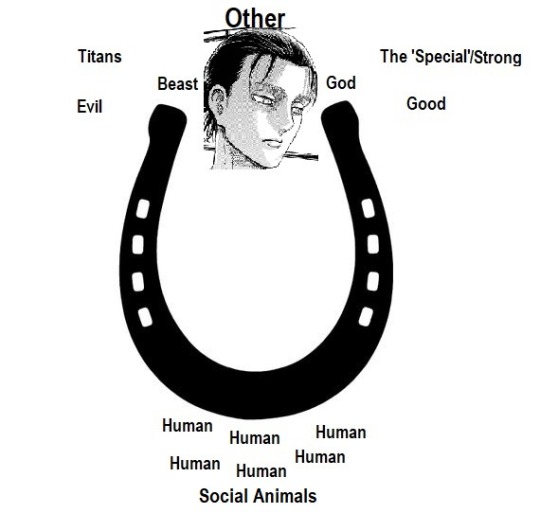
This diagram will make sense, I swear.
Part 1 - Humans, Gods, and Beasts
Aristotle’s tripartite system is profoundly embedded in the world of SNK.
Humans, the social animals, are the ordinary people who do not seek to make an individual mark on history, but instead live communal existences as cogs in a machine. The most important thing to them is usually the well-being of themselves and their loved ones.
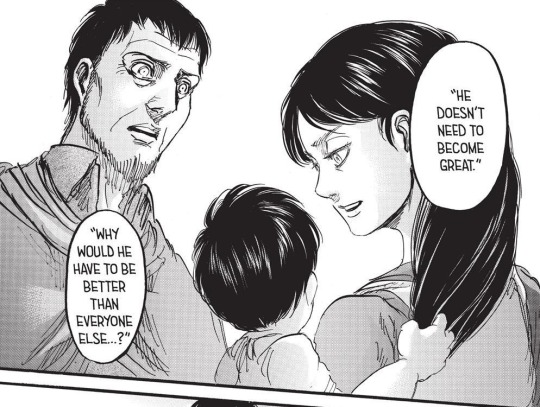
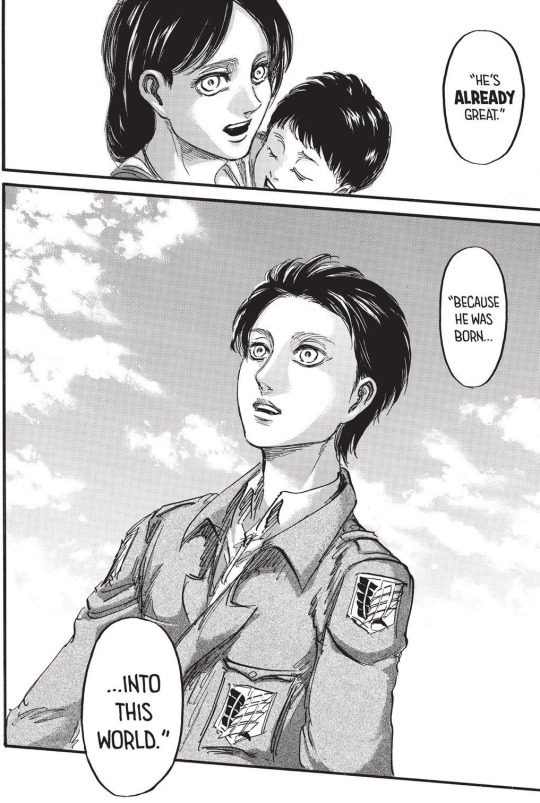
They are considered weak as they do not struggle against the flow, but these very attributes are what make them human.
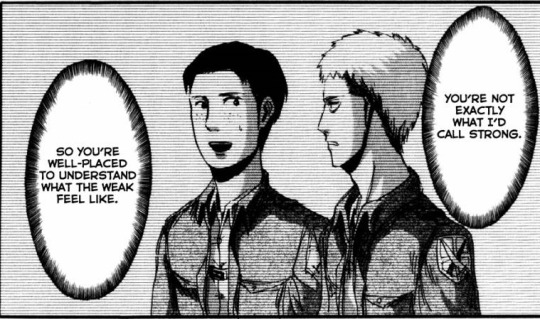
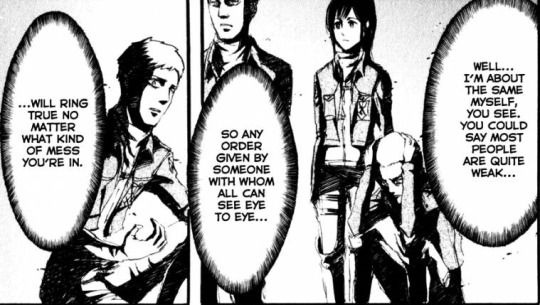
The vast majority of the human race fit into Aristotle’s definition of ‘social animals’, as that is the only way in which society can function. The existence of those ordinary humans, then, is worth preserving.
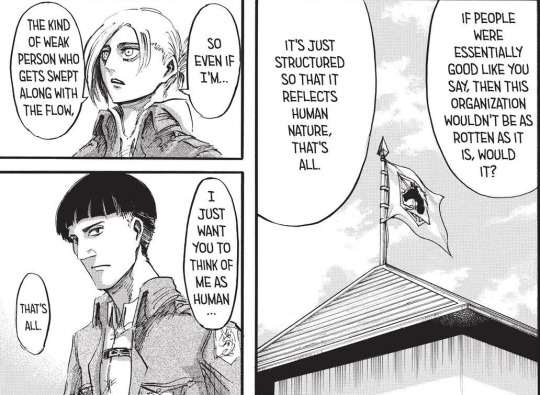
Those who are not social animals, but rather lead highly individual existences with the power to leave their own unique mark on the world, are Gods when viewed positively and Beasts when viewed negatively. Because they go against the flow and disrupt the status quo, they are demonised by those happy with that status quo and lionised by those who are not. In either scenario, they stand out from the crowd.
Gods are considered to be strong and special.


The apex of this specialness is symbolised in the series through its pseudo-Gods, like Ymir Fritz, and those with godlike powers like the Ackermans and titan shifters, especially Zeke and Eren.
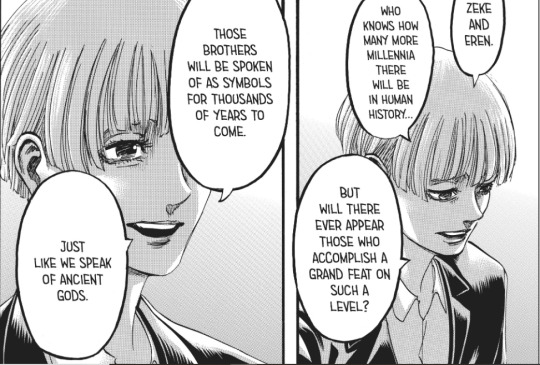
The entirety of the Eldian race, by virtue of the power to turn into titans, can also be considered special and so are lionised as gods by the Eldian nationalists.
However, they are considered Beasts by the rest of the world because of that same uniqueness. The apex of beastliness in the series is in the titans themselves, the ultimate ‘Other’. Nothing can be as estranged from the human social community as they are, as uniquely disgusting, uniquely powerful creatures.
With this tripartite system established, however, the series deliberately complicates all three of its boundaries. To begin with, let us examine the disintegration of the boundary between Beasts and Gods.
Part 2 - The ‘Other’
Beasts and Gods are ultimately the same thing - they are an ‘Other’, defined by their lack of dependence on their community and, consequently, their status outside of it. This separate status makes them an unsocial animal, and therefore, not human. Whether this inhumanity is a good thing or a bad thing - godly or beastly - is only a matter of perspective.

There is no better proof of this than the personage of Eren Jaeger.
From the start, Eren has had no desire to be a ‘social animal’. He never catered to the opinion of the populace, and held them in outright contempt.

He wanted to accomplish everything on his own, without relying on others.

He stuck to his dream of joining the Survey Corps no matter what anyone said, and won people round to his views instead of struggling to fit theirs.
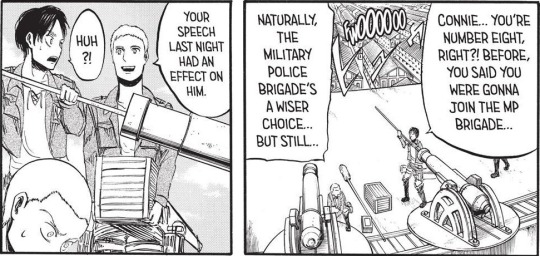
Acting this way gained Eren a reputation as either a total idiot, as in Jean’s eyes, or as an example to be followed, as Connie, Sasha and the others saw him. When Eren’s titan power was unveiled, this dichotomy escalated: where Erwin saw humanity’s greatest hope, the Military Police saw an enormous threat to peace inside the walls.
He is seen as a beast or a god, but even before his titan powers were revealed, he would never let himself be considered a nobody. The values he nurtured - independence and the strength to go against the present flow - were part of his desire to become inhuman.
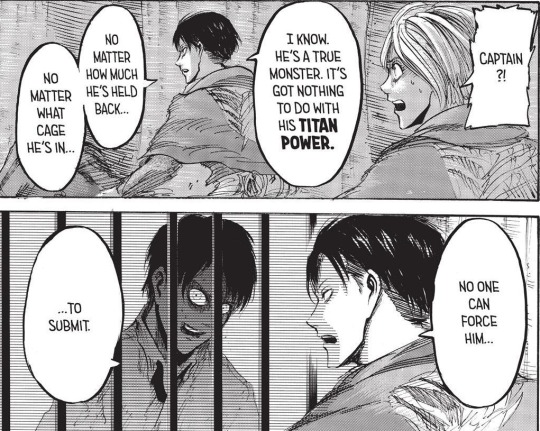
It is therefore thematically appropriate that someone so fixated on the inhuman should become a titan. In his efforts to become a god, he becomes the beast he sought to vanquish. For they are one and the same - and this goes for the titans, too. Their status as an Other, not merely as a beast, is what makes them the natural enemy of humanity.
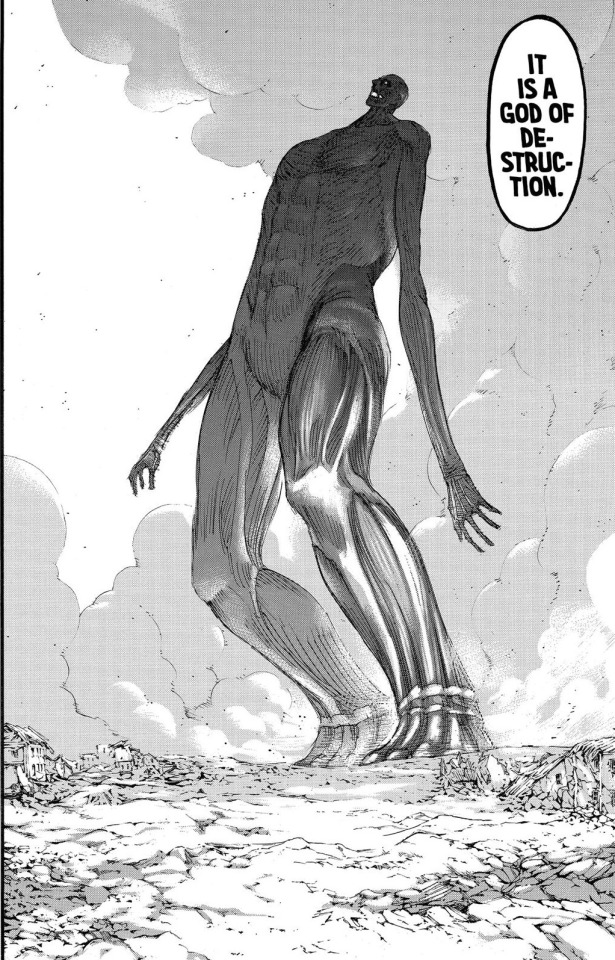
Moral doctrines that try to sort beasts from gods and drive a hard wedge between them only serve to obscure the truth.
The Church of the Walls is the best example of this exercise in futility. It reviles the titans as beasts and worships the Walls as gods for protecting them against such beasts - but the Walls themselves are titans too. The distinction between beasts and gods is thereby revealed as nothing more than a sham by the authors of public morality to keep the public in line. Indeed, how often is it the case that the devil of the new religion is the god of the old?
Like the Church of the Walls, both those who respect and revile Eren in the Final Arc observe the same truth about him in different lights: he is an Other. And they fight to the death to decide what kind of Other - a god, or a devil:

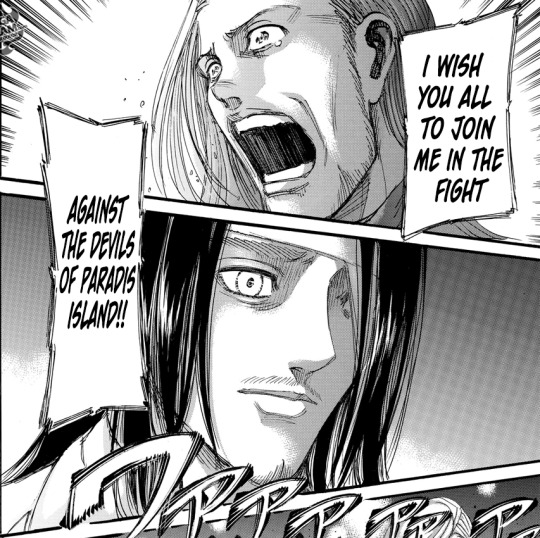
A murderer, or a messiah:
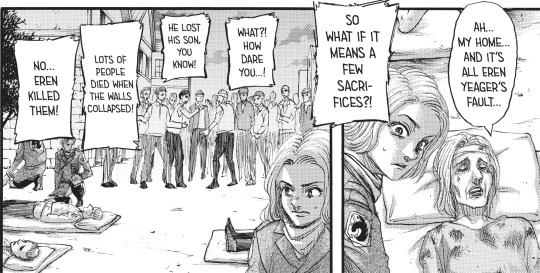
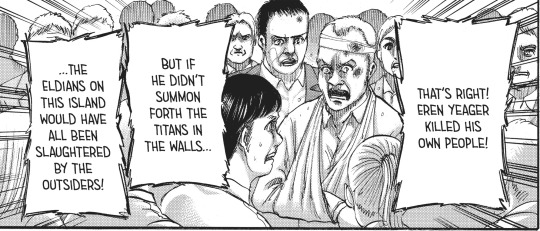
Gentle, or savage:
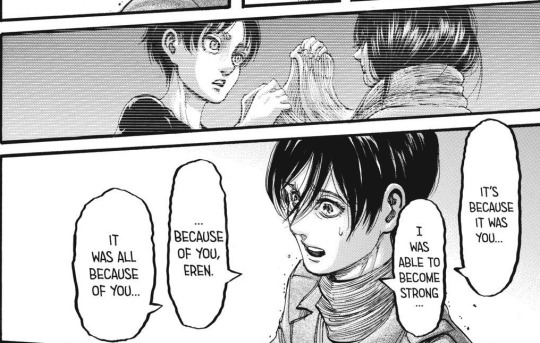
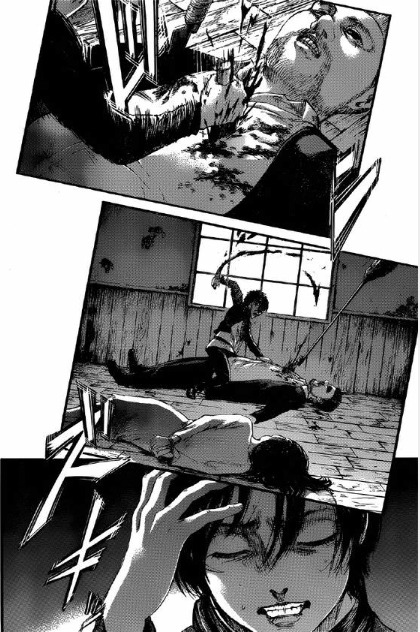
The fandom is no less divided over him than the characters are, each side assured of their rightness. He is either an incorrigible child or an enlightened superhuman, the most free or the most enslaved, unchanged or the most changed of all, a pit to be avoid or a height to which we might aspire. Eren is the circle that completes itself, both the best and the worst, a beast and a god. But whatever he is, he is nothing in between, nothing mediocre. He occupies extremes alone: that is what makes him special.
Eren is fundamental proof of the failure of our value systems. He is a thought experiment who manages to sit at both ends of the spectrum while neglecting the middle altogether. At this point, we may return to our diagram.

A horseshoe works much better than a straight line for our purposes. Eren sits between god and beast, good and evil, special and titan, but a world away from the multitude of humans at the centre of the horseshoe.
However, he was not always this way. His compulsion to move away from the herd is the same as ever, and that is likely what he means when he tells people he has never changed: but there was once a time when for all his efforts, he could not quite escape being a social animal.
The significance of this fact is monumental. Eren proves that the special and the human are not distinguished from birth, but that there is in fact a pathway between them. This leads us to our third part: the disintegration of the boundary between the Human and the Other.
Part 3 - The Philosopher
Like love, specialness is something you find when you’re not looking for it. Eren’s journey towards the special first began with his acceptance of his own normality.

Beforehand, behind his play at independence he longed for recognition and approval from others.
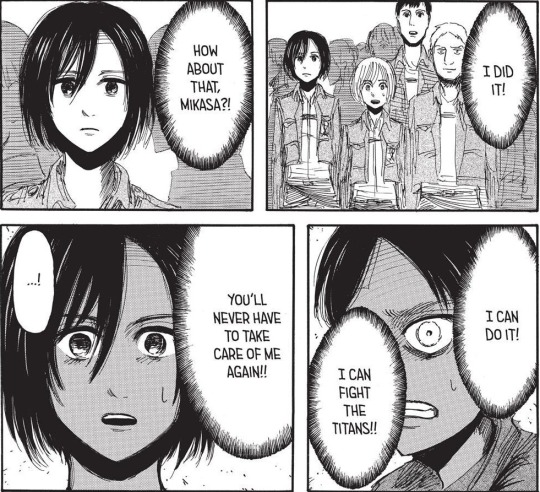
He was tired of never being taken seriously - by his neighbourhood bullies, by Mikasa, by Jean. They all dismissed him as either crazy or weak and in need of protection. He was so prone to flying out in a rage at this because they touched on his greatest insecurities - that he was really a nobody after all, and that he’d never amount to anything.
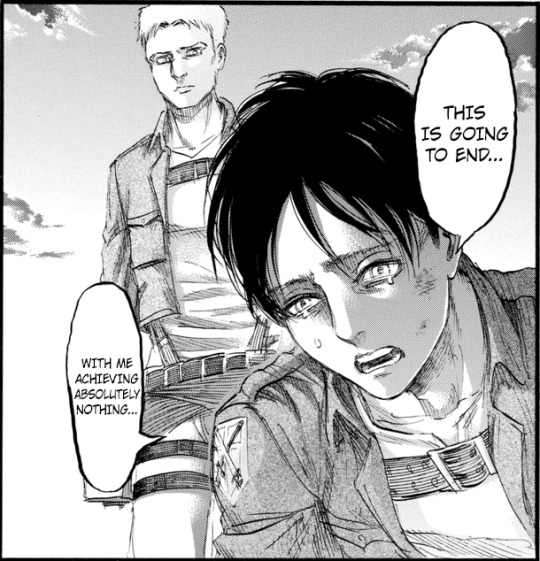
In this regard Eren had a great deal in common with Keith, who wanted above all else to prove that he was better than the rest and worthy of being admired.

This was why Keith’s story had such a big impact on Eren, and why it was placed at the end of the arc where he learns to accept being only human. One cannot become special for the sake of the approval of others. So long as you have that objective in mind, you will never be anything more than a social animal and therefore human.
It was only once Keith abandoned any hopes of being seen as special that he actually became so, when he committed the ultimate sacrifice away from the eyes of anyone living. He acted with his own conviction in his heart, and not the approval of anyone else.
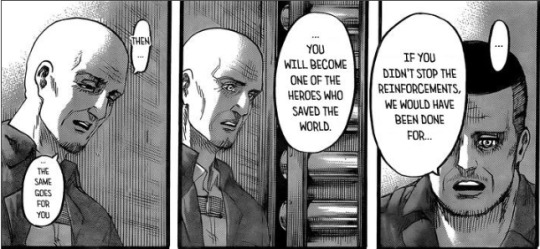
So he can finally receive the title of hero - one he clearly did not expect to hear. And it is a compliment he extends to Magath, no longer feeling the need to raise himself above anyone else.
In Eren’s case, he first learned the true virtue of self-sufficiency in the crystal cave, where he saved his friends’ lives by choosing to trust in his judgement and power over everyone else’s.
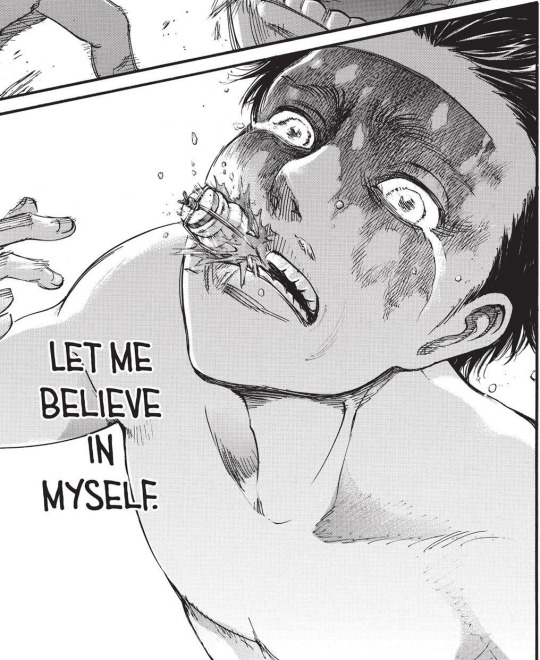
Eren is shocked after his success, and the lesson does not fully sink in at first. But such sentiments as the one below...
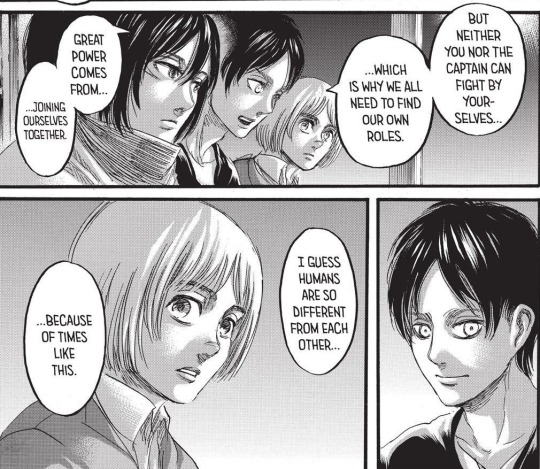
...quickly evaporate in Eren’s next moral trial, the Serumbowl. He can no longer accept peaceful co-existence between people with different beliefs because their decisions directly threaten the lives of the people he loves. This is the moment he redirects his focus to the protection of his and his own, and in doing so renounces his care for the wider world. The revelation that he will crush that outside world into ashes reinforces his belief in this conviction as the only solution.
Thereon out, Eren embraces self-sufficiency. He chooses not to trust in his comrades and builds his power to the point that he no longer needs to take orders from anyone else. Any help he does employ - from the SC or from Zeke and his followers - is achieved through manipulation, where he is firmly in control.

He becomes self-sufficient to the extent that he even moulds the conditions of his own upbringing. It cannot be said that he is a social animal any longer. His independence allows him to surpass his humanity and become both beast and god - walking on heavenly planes in the one moment and rampaging as a skeletal monstrosity the next.
Eren passes from ordinary into special through his self-sufficiency and self-orientation. This rigid self-discipline, this self-transformation, is a practice which we might call - philosophy.
Eren?
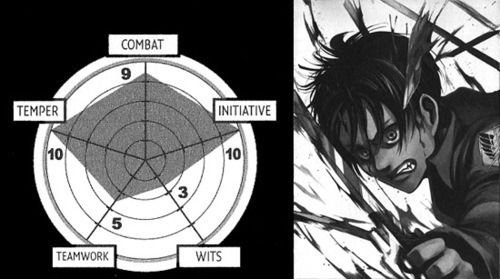
A philosopher???
Yet this is the only way a human might become a beast or god. The philosopher Friedrich Nietzsche, whose works synchronise beautifully with SNK, added one crucial modification to Aristotle’s equation:
“To live alone one must be a beast or a god, says Aristotle. Leaving out the third case: one must be both - a philosopher.”
And when one really thinks about it, is the idea of Eren as philosopher so ridiculous? Summarising a philosopher as ‘one who seeks the truth’ - who has accessed more of the truth of the world than Eren? The Attack and Founding Titans give him access to literal worlds of understanding beyond the scope of any other. And although Eren is dense at the start, he grows increasingly introverted and soul-searching as the series progresses. I think it is by no means a stretch to claim that Eren has come into his own jaded sort of wisdom.
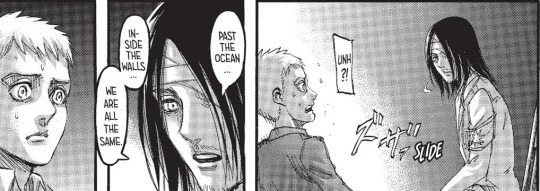
Furthermore, Eren’s restless striving for freedom, his ‘Will to Power’ in Nietzsche’s words, is so powerful that he became stronger than Mikasa could ever hope to be and hatched a plan that even Armin couldn’t predict. It is his force of will that has always allowed Eren to overcome his weaknesses. So too psychologically - his wanderlust has taken him beyond the pale of morality and so made him the series’ only real philosopher in Nietzsche’s sense of the word, as a creator of new values.
It is the drive for freedom, then, that can turn a human into a philosopher and by that means become special. The divide is that simple, that fragile. And so the monstrous Other is simply human: all too human.

Eren’s words to Ymir Fritz are the definitive illustration of this theme. Ymir, who possesses the heights of power as a pseudo-divinity, who lacks a shred of power as a slave, manages to still be human. What unites all three aspects, what allows them to co-exist, is that freedom to choose. The drive for freedom that turned Eren philosopher is what allows humans to roam into the territory of beasts and gods.

So, rather than a horseshoe, this process is best represented as a fishhook, where a pathway exists between the opposite ends of Human and Other. Through philosophy, through the discarding and creation of values, through the drive for freedom and the Will to Power, this gap can be bridged.
It is at this point we come back to the words of Eren Kruger, and consider the full weight of their meaning:

Whether an Other is a god or a beast is merely a matter of perspective - but so is the ability to become an Other in the first place. The titans of history, its movers and shakers, were not a species above and beyond. They were anyone, as human as you and me, only ones who embraced their freedom and made a courageous choice.
This is the purpose of the titans being revealed as humans. This is the purpose of the whole concept of titan shifting, where even such social animals as Reiner and Annie are elevated to the level of the special. This is the reason why mere humans are able to successfully combat the titan Others through their own skill and ingenuity. This is why our heroes possess such manifold weaknesses and flaws, to remind us that even people as average as Eren, as scrawny as Armin, and as cowardly as Jean were able to become special by choosing the Survey Corps - that is to say, by choosing freedom.
The world we inhabit is a sordid one. It’s sickening seeing the levels of cowardice people exhibit in all aspects of their lives. “I would help you, but...I would stand up to them, but...I would do something about it, but...” etc, etc, and people make excuses to run away from their problems every time. It’s enough to hate the world and everyone in it.


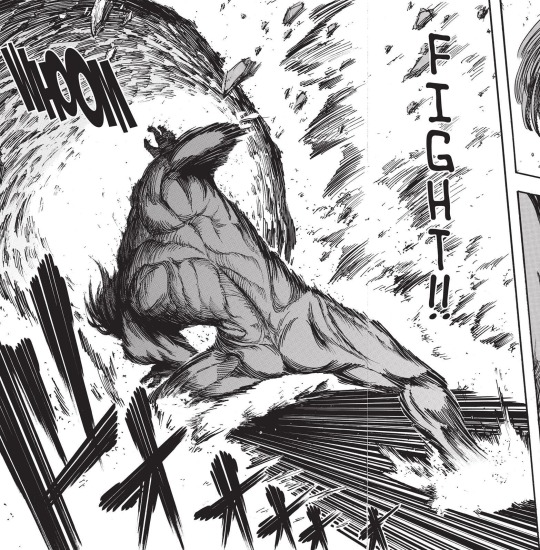
The message SNK delivers is able to restore this dwindling faith. Because no matter how disgusting human behaviour can be sometimes, in others and in ourselves, within every single human is the potential to become as beautiful as the characters we admire - to become someone special. A little bit of courage is all it takes.
That, to me, is what makes humanity worth something. Because it is through that metamorphosis into the special that we fulfil our function as human beings: creatures which have the choice to remain within their humanity or transcend it. Just possessing that potential is enough to make humanity a gorgeous species - and so, before accomplishing anything, Carla could value Eren simply for being born into this world. He doesn’t have to be better than anyone else, because it is a power we all possess.

This human potential to become both god and beast is what prevents the world from boring us to death. The beasts make it cruel, and the gods make it beautiful. And with gods and beasts being one and the same, there can be no world that is beautiful without cruelty, or cruel without beauty.
#shingeki no kyojin#snk meta#eren jaeger#eren yeager#friedrich nietzsche#aristotle#keith shadis#carla jaeger#reiner braun#annie leonhart#eren kruger
94 notes
·
View notes
Note
Peace! It's nice to meet you, fellow mbti person! I'm so glad to have stumbled upon an ISTJ who is into typology! I have a request. I typed Elsa from Frozen in a post (I'll tag you) and I argued that she is not an ISTJ. I wanted to know what you thought, particularly if I made any mistakes in understanding the ISTJ personality type. Thank you so much in advance! I hope it's not too much of a bother. I'm an INTP btw.
Hi,
I want to start out with the following: for anyone reading, do not make a habit of having me analyze your posts about fictional characters. I am happy to help you type yourself, or answer questions about MBTI. However, in case it was not clear from the fact that I have only typed fictional characters in response to direct questions, that my answers have typically been very brief, and that I’ve repeatedly directed people to blogs that specifically focus on character typing, I’m not really interested. I should note: I had fun because I love picking up my metaphorical red pen and writing “wrong” over every other sentence, but it did also take me like an hour and a half and it’s over 3 pages long, and I don’t have time to do that regularly.
With all that said, the post had sufficient issues with both basic logical argument structure (I would very strongly recommend you revisit that INTP typing of yourself and look at something with high Fe instead) as well as understanding of MBTI that, because you asked directly, I will go through said issues. I want to make it very clear: this is going to be harsh. For both that and for the length I’m putting it below a read-more such that if you were looking for a brief thumbs up or down and not for extensive criticism, you are welcome to ignore it, block me, or whatever is best for you.
Basic argument structure: you open repeatedly with the most subjective arguments - that she gives off Fi and Ni vibes and you don’t see the Si in her. This will convince no one but yourself.
This argument is also mostly focused on “other people think this, but I don’t” which I find is only useful in a process of elimination argument. We’ll get to the final typing eventually but it is generally stronger to argue in favor of what you believe and then address potential disagreement rather than the reverse; by the time you get to ISFP I’ve read so many incorrect assumptions and subjective asides that I’ve long since stopped valuing the analysis of the work.
Issues with the ISTJ argument
(note: I have, and continue to type Elsa as an ISTJ so this will be the longest section in that I’m both pointing out flaws and arguing in favor of ISTJ; the rest will be solely focused on MBTI misconceptions or logical fallacy).
While it’s true people often mistake trauma for Si, this argument seems to equate trauma with being stuck in the past (people can just be stuck in the past without trauma for whatever other reason - it’s not healthy but it does not necessarily indicate literal trauma). There is also a false opposition here: It’s absolutely valid to argue that Elsa is traumatized, but that does not preclude her having Si, merely removes one argument in favor of Si.
You define Si (gathering concrete details to understand what to expect) but don’t actually argue why Elsa doesn’t do this. I’d argue, in opposition to the statement later in this paragraph, that she does. She is aware from the past that her abilities can harm her sister. She is aware from her past that when she avoided Anna, Anna was safe. She hasn’t been happy with the “conceal don’t feel” line, but it has achieved her goals and her expectation is that she’ll hurt someone if she stops following it.
If you’re referring to an Si-Fi loop (wallowing in self-pity), it doesn’t use Te since that’s how loops work. You don’t explicitly say this is in the context of looping although you introduce looping in the second sentence, but if you are referring to a loop this is incorrect. It’s true that ISTJs are often likely to use Si (preference for familiar/existing structures) and an Fi understanding of morality to direct their energies when they wish to change something (ie, they will change things through existing channels) but the focus on speaking out about injustice here is much more in line with enneagram 1 - a very common enneatype for ISTJs and an enneatype that’s rare for any non-TJ types, but not the enneatype I’d give Elsa nor an inherent ISTJ trait itself.
The part about self-discipline is mixed - a lot of ISTJs are very disciplined in certain areas (particularly professional/familial) but can neglect the self (not getting enough exercise/not eating well, not addressing burnout or more emotional issues) and I’d argue again, Elsa shows this: she’s not addressing the fact that she’s lonely and miserable, but she’s highly disciplined with regards to concealing her abilities and avoiding Anna even though it’s the very thing making her lonely and miserable.
I don’t necessarily think Let It Go is indicative of an Ne grip, but one can make changes outside of a grip, so this isn’t a useful argument, as it argues why an Ne grip is wrong, not why ISTJ is wrong - I would merely argue she’s not gripping at that time. Which is a general issue here: the argument you provide in this paragraph isn’t arguing against ISTJ, it’s arguing against other people’s arguments for ISTJ, which is an important distinction.
The final paragraph of the ISTJ section has numerous issues: ISTJs are not rebellious. They are not as resistant to change as stereotypes indicate, but even a healthier version of ISTJ Elsa would be unlikely to rebel and rather try to understand her parents’ argument, research other options, or look for a way to gain control over her powers while still working within the normal hierarchy. I addressed self-discipline (I should add: I don’t think a child/young woman having difficulty controlling magical powers with no training is an argument against self-discipline; my argument for self-discipline is that she stays in her room and away from her sister despite clearly hating it). It is also, to be blunt, mind-boggling that you (correctly) argue that trauma responses are not inherently Si but then refer to obsessive-compulsive behaviors as Si when that’s also a medical disorder completely divorced from the MBTI framework. Finally, her continuing to follow an order from her parents after they die is first, quite literally the definition of self-discipline (she’s the queen; no one else is going to discipline her for it, after all) and second, entirely in line with Si (this is what she has always done and it’s not great but it works) and is, arguably, if not medically obsessive-compulsive, an obsessive need to follow a compulsion. To be clear: this isn’t healthy ISTJ behavior, but since you’ve acknowledged grips and loops here I think an unhealthy interpretation of the type is very much on the table. You say her behavior is more in line with F types; it’s not and you don’t explain why.
If I may it seems as though, much in line with the argument here being against other arguments but ultimately not debunking the typing, your arguments against MBTI stereotypes focus on what’s incorrect but they tend to merely swing the pendulum to the opposite side (eg, that ISTJs are likely to rebel, in opposition to the stereotype that they’d mindlessly follow orders) rather than find the more nuanced middle ground of how people of a type or with a certain function behave.
Issues with the INFJ and INFP sections:
Ne users can and frequently do go out into the world; simply because Ne can be engaged without external physical stimulation doesn’t mean it never is. I’m also not really a fan of reading being classified as a strictly introverted pursuit; that’s falling into a pretty significant stereotype trap. Going out and exploring is a thing anyone can do but if anything I’d either associate that more strongly with high sensing (either Si or Se) or with extroversion.
My biggest issue here is the implication that searching for a meaning for existence or a purpose is in itself an indicator of Ni. This is just the human condition. If you’re going to argue that Si users are driven to rebel against injustice I don’t see how you can miss that that might in turn be driven by a belief that this is their purpose. Perhaps Si-Ne users aren’t as invested in having a single purpose, but wondering why you are on this earth and what it is you are here to do is just being a person, and to be blunter than I have been, I am struggling to understand how there has been so much effort made earlier to push away from stereotypes to the point of overcompensation in the opposite direction and then when it comes to the idea that only Ni users have a desire for meaning in life you just accept it without question.
Issues with the ISFP section:
At this point I’ve probably covered most of them though I’d like to point out that I don’t think there was an argument ever made explicitly for introversion; while the structure of the earlier arguments and focus on debunking was, as stated, flawed, I would at least round it out by eliminating ESFP as an option.
The argument here rests heavily on Let it Go, which is interesting because most of the terrible arguments for Elsa being an intuitive also rested squarely on that same brief if admittedly pivotal section of a full movie; in attempting to differentiate itself from those arguments it has in fact replicated the most significant flaws. Anyway, I’ve addressed that I don’t personally think Let it Go being indicative of a grip is how I’d argue for ISTJ, so that becomes invalid; I’ve tried to focus more on issues with logic MBTI than the contents of the movie but I’d add that “she was happy” is open to interpretation and her emotional state was probably fairly complicated. Relieved, sure, but she’s still ultimately isolated. (Also while mentally singing Let it Go, I realized that here’s that rebellion you were asking for in the ISTJ section).
You also outright say that when Elsa tries to reassert control it’s through Te. Yeah. That’s what a high Te user does. An ISTJ in a grip would indeed use Ne, but in quite literally any other circumstance (looping or just existing as an ISTJ not in a grip or loop) would reassert control via Te, so again, your argument does not sufficiently eliminate that Elsa is an ISTJ, just that she’s not a gripping ISTJ, which I’d agree with.
“She acts out when she is stressed and makes bad decisions” is also the human condition (and why I’ve frequently on my blog argued very strongly against typing via stress behaviors, because in the end most people...act out and make bad decisions when stressed), so this isn’t useful as an argument for anything.
In conclusion: multiple misconceptions about Ni and Si; no argument that I could find presented for high Fi, just Fi in general; inconsistency regarding whether or not Elsa rebels, and an overall reliance not on making a new argument but on arguing why other arguments were wrong. Given the title of the post you asked me to analyze I have to (admittedly this is extremely cynical of me) wonder if there was an underlying goal to come up with a typing that was different from commonly accepted arguments, rather than to simply type for its own sake.
19 notes
·
View notes
Text
Dhawan!Master Character Analysis
A look at Confused motivations, externalized anger, performance, self-destruction, boredom, and trauma
Confused Motivations:
Something I find interesting is that The Master’s motivations are not understood by himself. He professes it’s because he is angry that The Doctor is a key part of who he is and the “specialness” being The Timeless child gives her, but this is no way the whole story.
A more complete read of the motivations:
A biological concrete aspect has been added to the vacillations of feeling less than and better than The Doctor causing anger.
A compulsive need to control The Doctor and make them the same by putting them on the same “level”
Anger at being even more of a tool and creation of the Time Lords and loss of autonomy & control thereof.
Anger that they hurt The Doctor
Boredom, apathy, impulse control deficits and general control issues informed by trauma.
I doubt he is aware of all of these layers, and I believe The Doctor in the story and us as spectators will choose the one they believe is the “real” reason, but it was never just one. The Master flattens these motivations and explains it to The Doctor as almost all disdain for her, and blind rage, both actively in his emotions, and subconsciously to himself.
We know The Master has been used by the Time Lords their whole life (longer if the child in the flashbacks is Baby!Master) and has their autonomy stripped to be used as a tool of the aristocracy. He is dealing with having the Time Lords who have taken his autonomy directly on a physical level via The Doctor’s DNA. Just like the drums and resurrection during The Time War, we have direct physical meddling by the high council.
The Master has always felt that The Doctor and he are the same, that she is better than him, and that he is better than her in turn. This vacillating perception of her and their dynamic with each other is something we can see tracing through their relationship. This comes into play where they are used as foils and mirrors to each other. The Doctor Pointing this function of being the same while opposed to each other:
Twelve: “He's the only person that I've ever met who's even remotely like me.”
Bill: “So more than anything you want her to be good?
An interesting way we can see this change how they refer to each other sometimes using the present tense and past tense of the word friend.
Ten: “A friend, At first” [Ten spends most of the time focused on them being ‘the last’ over a real relationship, but offer a hand]
Thirteen: “The Master was one of my oldest friends. We went very different ways.” [Thirteen is intensely emotional about the master, more so then we have seen her at almost any other point, but shows mostly anger and exhaustion]
Twelve: “Of course she's not dead. She's a friend of mine. I may have fiddled with your wiring a little bit.” [Both Missy and Twelve focus heavily on their friendship and fall heavily on their intimate history]
The Master also changes the description of their relationship
Missy:“friendship older than your civilization, and infinitely more complex.”
Dhawan!Master: “I'm her best enemy.”
We see how the Fifth Doctor has an almost apathy to The Master, Seven takes the time to give him a proper burial, Ten and Twelve both seek out their respective Masters dreading the loss. The Master also does this being open about wanting attention, playing lower stakes dreams, being truly murderous, and abjectly cruel. The Master's self-perception shits as well; playing god on Gallifrey, making a personal army, putting her on a pedestal, dragging her down, and a suicidal streak. I think this helps illustrate the behaviour throughout the whole season.
The Doctor and The Master compulsively try and get the other’s attention. The obsession is something pointed out by multiple other characters namely; The Brig, Jo Grant, and The Rani. We can see this in him taking the time to play at being O and in how even when he yells about wanting her dead he also always knows she will live why else would he leave a note for her that would show when she got to Gallifrey. The Master will get none of the sought after catharsis and compulsion to involve The Doctor if she actually died. In their Eiffel Tower confrontation;
Doctor: “When does all this stop for you? The games, the betrayals, the killing?”
Master: “Why would it stop? I mean, how else would I get your attention”
His involvement this whole season is only about The Doctor, even the side operations of working with the baddie on earth, committing genocide and paling with the CyberMen are all about The Doctor and his need to exert control over both of their lives.
The Master is angry that The Doctor was hurt. The Master has always had a kind of “Only I can hurt The Doctor” mentality. And considering he knows how it feels to be used and manipulated, I don’t think he wants The Doctor to suffer in that manner by the Time Lords. I don’t think it’s contradictory to want to hurt everyone else and also be angry The Doctor was hurt. Because of the obsessive thoughts around The Doctor, it would alter the thought patterns, The Master is not working based on logic.
A real empathetic connection to The Doctor is present in the way someone who is in a toxic relationship will have. This goes both ways we can see this in the way they have all of these periods of differing extreme emotions, especially if you look at Simm->Missy->Dhawan. There is love there when they had a healthier relationship back when they were friends/crushes, but over time it’s been compromised through each hurting each other (whatever you pick/know of canon this still holds true) becoming toxic for most incarnations. I also don’t think this hot empathy for The Doctor would contradict not even having a cold empathy for the innocents slaughtered on Gallifrey (The at least 2.4 7 billion kids did nothing wrong)
In general, I believe after going fishing in the matrix either on a whim or not the act of burning Gallifrey was likely an impulsive act. But after this, I think planning came into it, along with building the blocks for performance. He can formulate an elaborate game to play with The Doctor, The Matrix, live on earth, and The Cybermen to stave off boredom and attempt to integrate trauma and it will fulfil his rumination on The Doctor and the high council. I’ll talk more about trauma and boredom later.
Externalized & Cyclical Anger:
When you are angry there are generally two ways people display these emotions: they put their pain into their own body and mind or put it on everyone else. Anger is healthy and The Master has every right to be angry at the high Gallifreyans who have treated him and his best friend like garbage from the very start.
Dhawan!Master is a perfect example of someone taking their own pain and putting on everyone else. He is angry at so many things, some justified, some not but is dealing with this through externalization. He displays self-destructive anger but goes about the self-harm/suicidality by causing as much damage outwards as possible. A common Master trait, but very prevalent here, taking his own hurt and making others feel it, a stated goal more than once.
He took this anger at a set number of people onto the entirety of the Gallifreyan people and stepped up the “flirting” and games he plays with The Doctor to one of the most painful versions they have. We can see The Master and The Doctor’s relationships take many different forms of the years but it has always been grounded in the need for the other's attention and anger from The Master at being left. With these added sources of anger they toss at each other it makes sense that we get different versions of tipping point moments when one of them “wins”.
Another key here is that The Master shows a long history of serious anger rage that comes out in extreme ways. He suffers outbursts regularly and it’s something that worsens over time but even The Masters who were more in control we still see how anger is an undercurrent. And while The Doctor has a similar undercurrent The Master has this pattern of explosive outbursts that have slowly become more character-defining.
Part of the cyclical anger is also the fear under there. The Master is afraid of so much, of not being enough, of being left behind, of not being who they thought they were, of dying (historically he has gone to crazy length to live), of continuing to live how he is, of being the worst of him, of being controlled and of the Time Lords. The Master runs from the Time Lords, using them yes, but never staying there.
The Timeless Child revelation might have acted as a trigger for larger displays of anger, however, I think it’s key to The Master that this anger was there way before now. And it has caused mass suffering before now, this sympathetic grief and anger The Master shows in Timeless Children is compelling but it’s best understood a part of a cycle of outbursts of those emotions severely worsened by this latest re-traumatization.
Performance:
The Master, like The Doctor, is a huge fan of performance art. This is something that has always been there with costumes, voice changes, dancing, and using this for both just plain fun and as a real tool. On a strictly meta-level, Sacha Dhawan was living for every moment and being able to meet and even surpass Whittaker for screen presence. It was his story almost anytime he was on screen.
Narratively putting on a show was key, as O he is literally playing a part for The Doctor, and even keeping in contact as this persona. When in the past he is theatrical in his introduction in the science expo, in his character reveal in Ascension of the Cybermen his dialogue starts is:
Master: “Wow! Oh! Ah! That's a good entrance, right? Be afraid, Doctor. Because everything is about to change... forever.”
He literally asks if they liked his entrance, they liked how he presented himself. Then follows this up with this big pronouncement. Begging for the people on screen and us to pay attention to him. Which is generally one of the only moments in this episode that people really remember from the latter 1/2 of the episode.
The entirety of the interactions with The Doctor on Gallifrey has a semi-planned performative aspect like he has a bit of script in his head and is using the environment as a stage, monologuing for the vast majority of the time. He critiques the performance as much as the substance of the Lone Cyberman’s plan. The body language and mannerisms are also very large and have a dancing aspect to it, or come across as severe and are trying to get a rise out of The Doctor or Cyberium.
Another aspect to the performance is how he has these set pieces, of bringing her in, then trapping her, playing with the Death Particle and more than anything is the CyberMasters. He introduces them with a big speech, does the march with them and uses them to make a point more than to actually build an army. It’s also important to think he had to make the costumes and had this macabre point of putting the Time Lords into the Cyber Armour.
The performance is more than anything just begging for attention. The Master loves to blow stuff up, watch the smoke of buildings, and fight with The Doctor, but it’s clear that they tried really hard to impact The Doctor more than anyone else. It’s clawing to be enough for The Doctor, prove himself, to win. Another way this performance is as a mask covering the fact The Master is falling apart. It's the duality of The Master always loved putting on the show but there is desperation undergirding it. We can see how The Master can start to jump in his speech mannerisms become more desperate and this facade of control drips to the anger and fear consuming him.
By putting on a show, he is in control. He fears to be out of control, and the loss of identity both the Time War and the Timeless Children gave him. Controlling how he acts, how others view him and setting out a roadmap. Control through hurting others, hurting himself, through acting and of course just basic controlling others.
Self-Destruction:
The Master is highly self-destructive here, something that is connected to a form of “anger in” and the aspects of control we talked about before. When the death particle fails to go off the first time he seems somewhat disappointed it didn’t just end right then:
Dhawan!Master: “Worried, were you? I thought if he was compressed, the Death Particle would activate and all this would be over. I would've been okay with that. I thought it was a nice little gamble. But no, here we are, all still alive.”
He is gambling with his life, I believe this to him would be a second-best ending to finishing the whole game and be face-to-face with The Doctor. More than anything though, it seems he wants to be able to end everything with The Doctor there as well. In this case that is the ultimate control he is seeking, to end the fear, grief, bitterness and pain. Suicidal thoughts don’t quite care if you complete your plan.
The ultimate version of this plan puts The Doctor in the position of if she wants to save the world she must also join The Master in an act of extreme destruction. The interesting thing is it fails to put The Doctor on his level because instead of an act of anger, control and wanting harm this one is to prevent more death. If she had been able to do it it would have succeeded in making her die as a hero which is the opposite of the stated goal. The Doctor has taken cruel and pointlessly destructive steps before but this wouldn’t have been one of them. The Doctor has also been suicidal before this point, those moments would have been a lot closer to them being the same then this actions as well.
Outside of the moral quandary, this is actually not that different from a murder-suicide in real life on a psychological level. Murder-suicide is also incidentally a highly male crime, which adds to an interesting pattern of invoking male violence. The Master wants to end his life but if this was the only goal he could have done it a million and one ways and send a note to The Doctor if he just wished her to know. But, like in real life part of it is wanting to control the other person too, he wants to control The Doctor and himself. The Master here has had his self-belief shattered, is depressed himself and feels The Doctor has become something less manageable with all this new information along with Thirteen being one of the least interested in The Master's games. This is interesting as I said before Dhawan!Master is the king of externalizing violence so even when his self-loathing drives him to suicidal urges the need to have The Doctor die with him and end anything that could possibly live on Gallifrey takes precedent.
I think this is key because, for all the talk for pointing out that he is really suicidal, the murder-suicide aspect is really key to any honest reading of the situation. Because if the death particle plan had worked he would have just committed murder-suicide, even with The Doctor pulling the triggering. This act would have come after a psychological battering via The Matrix (which even if he has a real want for her to know it was done cruelly), threats to her friends, threats of mass violence, giving her the weapon it’s hard to say he wasn’t culpable in the death particle’s usage. Even the first plan would have killed her too.
He is insistent that he broke her, she has nothing left, her world view is broken he finally brought her down. He needs The Doctor to be in the same headspace as he abjectly lost and searching for something worth living for. To feel understood and to be in control. Personally, I don’t think she has just accepted that none of this hurts and she is great because he gave her “gift of myself” and proved she “contain multitudes”, it feels more like her not wanting to give in to his control, to convince herself, but in the end, it doesn’t matter because he doesn’t win this time, and worse he dies without her. And interestingly she ends up taking the cowards route by making someone else fight her battle, this had nothing to do with ending the Cyber War it was ending a toxic relationship, a demolished culture and a Time War.
Boredom:
Something I think I've not seen talked about a lot is that if The Master is displaying a show of chronic boredom this is something associated with a lot of people who are violent towards others and themselves. I think we can see this in his agitation, body language, speech patterns and just the sheer amount of what he accomplished during The Timeless Children. This is less visible in him being O as we don’t really know how much he was messing around or doing while in character, but the moment he stops the endless need to do something, anything shows up.
If you think about it not everything he did is strictly necessary for the goals of destroying Gallifrey and then commit murder-suicide with The Doctor. But along with the need for a show, there is always something to do. And when each aspect of the plan finishes there is some joking and revealing but it also feels like “whoop that's done I'm bored again”.
He’s compulsively doing something, anything, but as he mentions this isn't actually fully fixing anything. It’s something that really lends itself to both the outward and inward destruction. When nothing will ever calm the anger, nothing will help you regulate, no amount of stimulus can keep your attention, it leads to reckless and damaging behaviour.
However, the game with The Doctor has to end, because this is the long game and now that we’re here she has to finish it too. The Doctor also has chronic boredom and he knows this, and that The Doctor has as little self-preservation as him. It tracks that when he makes the finale move he would assume The Doctor would be willing to act out too.
Trauma:
I think it’s very clear this Master is dealing with trauma and we see a lot of signs, many of which I talked about but here is a list:
Agitation
Anger & rage
Chronic Boredom
Compromised empathy
Compulsive behaviour
Depression
Destructive behaviours & suicidal actions
Dysregulated emotions
Enmeshment with The Doctor
Identity issues
Lashing out
Locus of control issues (Blaming everyone else while also needing to own it)
A need for control
Oscillating self-estimation
Preoccupation with those who traumatized them (with the timelords & The Doctor)
Reenacting trauma
Ruminating thoughts
Sensory integration issues (stimming, could be linked to other conditions)
Trying to put on a show, (A trait associated with trauma linked PDS)
Thoughts of violence
Dysregulation of Emotions and Nervous System: The erratic emotions displayed by The Master overlaid with behaviours that some have identified as looking like stimming point to dysregulation. His feelings and affect jump around and are always at high levels. A point of interest, however, is that From Spyfall to Timeless Children the issue seems to worsen as the ability to put up a facade is gone. Now we know that it wasn’t really that long of a period where he was actively keeping it as we only saw him as O for a short time. But it tracks that after being exiled on earth and then into the Kassavian dimension his dysregulation would worsen.
Preoccupation With Those who Traumatized Him: It’s so heavy in this story and even throughout the whole story The Master is locked on those who have hurt him, and the trauma thereof. The Master is used as a tool here the same way people manipulate The Doctor via their god and guilt complexes. The entire story is the Master having gone back to Gallifrey to try and enter the Matrix and then spend the whole time destroying Gallifrey and even then he can’t leave. New Who Masters specifically have their whole stories centred around the trauma Gallifrey did to them and their connection with The Doctor was changed by that event. And Dhawan!Master takes no action in this series that doesn’t involve this, even the plan with Kassavian is centred on getting the Doctor’s attention and setting up sending her to Galifrey.
Replaying Trauma: This is a commonality between the master and The Doctor. They have been reliving the Time War, the same patterns of loss of their friends, being unable to turn off the training to be a soldier. The Doctor is often taking the same actions she did before, sometimes outside of her control, all of which were made during a trauma state or resulted in traumatic experiences.
The Master replays the behaviours he learned during trauma as The Doctor does, but is a lot more likely to not only replay acts that they did that traumatized others, which The Doctor does too but also can replay what those who traumatized them did.
The speeches we get from the master in Timeless Children is slightly off version of Rassilon's speech at The End of Time pt 1.
Master: “Yes, it could! Behold your new CyberMasters, Doctor. All born from you, but led by me. How does that feel? Huh? Now, no time to lose. Don't move. Oh, that's right, you can't. Can you feel a new era dawning, Doctor? For Gallifrey.”
Cybermen: “For Gallifrey!”
Master: “For the Time Lords.”
Cybermen: “For the Time Lords!”
Master: “For the end of the universe itself!”
Cybermen: “For the end of the universe itself!”
Master: “Sweet dreams. This way, soldiers.”
Time Lords: “For Gallifrey!”
Rassilon: “For victory!”
Time Lords: “For victory!”
Rassilon: “For the end of time itself!”
Time Lords: “For the end of time itself!”
The Master who destroyed Galifrey in the name of something Tecteun, and by extension the other founding fathers of Galifrey, is playing the same game Rassilon did and views himself as a god of Time Lords the same way Rasilon did. We also know The Master isn’t directly quoting them because he was not present when Rasilon made that speech, so this dialogue shows how he is in patterns of trauma. It also is important character and theme-wise because it plays on the ideas of autonomy and how the Master has essentially made himself the destruction and death god to Gaalifry in the way The Doctor was essential in its creation. While he is goading The Doctor to be both creator and destroyer. The Master and The Doctor are in fact these forces, even though I believe the Timeless Child is a victim of abuse and exploitation, but, it’s entirely true that The Doctor and The Master are playing at being gods. Something they have done on other planets before.
This is also part of replaying trauma in the fact he has taken bodily autonomy and specifically regeneration from Time Lords to use as his own weapons. The CyberMasters are exactly what the worst version of Timeless Children are, complete manipulated weapons with no free will.
Conclusion:
The story of Dhawan!Master is one that turned hard into both the idea of The Master being in pain themselves but also showing some of the worst cruelty the master has ever done in both their extreme assault of The Doctor and genocide.
#Fandom:#dw#topic:#Character Study#Meta#relationships#trauma and media#character analysis#Character:#Thirteenth Doctor#The Doctor#The Master#Dhawan!Master#type:#txt#my post#ship:#Dhawan!Master & Thirteenth Doctor#The Doctor & The Master#other:#doctor who#doctor who season 12#doctor who meta#master meta#dw meta#dw analysis#cw:#abuse#genocide#asault
33 notes
·
View notes
Link
Summary: He’s dangerous. The thought whispers in the back of your skull. You smother it. Overreacting. He’s scared. He didn’t hurt you. You couldn’t have brought someone dangerous into your house. You’re smarter than that. You glance to him, and find him sitting down on your couch again, watching the TV. Please, fuck, be smarter than that. Rating: Explicit (sexual content) WC: 7,785 Warnings: Soft citrus content, threatening/controlling/inappropriate/intrusive behavior from Michael, implicit violent threat to Reader >Chapter 1 >Chapter 2 >Chapter 3 >Chapter 4 >Chapter 5 >Chapter 6 >Chapter 7 >Epilogue
=====
You open your eyes already tired, bouts of wakefulness left you with broken sleep and the acute knowledge you were not alone. Even in the absolute dark, you felt him. You blink and rub your eyes, try to bring some alertness back to yourself before you sit up.
He sits in a chair at the corner of your room, the white latex illuminated in the low morning light that slips between your blinds. He watches as you rise; there’s no intensity to his mask this time, no hard line to his shoulders. You meet where his eyes should be, too tired to discern why he’s in your room this morning.
Should be obvious; he came in your underwear.
He’s watching you sleep.
That should be so much more concerning than it is, but in a way… You can’t help but like him. It’s nice to get attention, even if it’s so very different than what you had wanted. He’s demanding sometimes, and scary- but he wanted you. And as much as you want to ignore it, want so desperately to focus on the fact that he’s been so horrible injured- you want him, too. You’d dreamed of a real relationship one day, the kind with dinner dates and flowers, but you can’t really complain about whatever it is that’s happening between you and your stranger.
You were circling the drain; sooner or later you’d fall in, but for now the dance you had around each other was… new. Unique. Something so different than the normal dreary aspects of life, the closest you’ve come to romance. You just had to wait until he was well enough, until you could reconcile the fact you wanted someone who wouldn’t speak to you, who had blood on his clothes that was surely not exclusively his own. A wry smile curls at your lips. You don’t even know who he is, don’t even know his name.
You stretch your back, willing your muscles to wake and ready themselves for whatever else he’d do to you today. The mask lifts as you move and you imagine in the darkness he traces your shape with his eyes. "Good morning," You rasps and swallow compulsively. Must've slept with your mouth open.
Just as with yesterday, he follows you to your bathroom and watches you brush your teeth, but as far as you could tell he remains focused on your face. He even steps aside as you move to leave. Not enough, of course, forcing you to fit between his body and the door frame, but at least you didn’t have to guide him into moving out of the way. You don't hear his footsteps behind you through the hallway, but you trust he's here anyway.
“Breakfast, then I’ll check your bandages again?” You ask, turning to glance behind you. He actually doesn’t crowd into your kitchen this time, seemingly okay with just lingering in the hallway, only half visible. He doesn’t nod, but he certainly didn’t mind telling you when something displeased him, so you figure that’s okay.
You poke through your fridge, displeased at the remaining edible foodstuff. “We’re low on eggs, but I could make toast with it?” Some produce catches your eye. “Oh, I know. Breakfast might be a little small, but I can get groceries and we can make a soup for tonight. Got some potatoes and onion left here, could add corn? Would just need to grab some meat.” You peer over the top of the fridge door. You are unsurprised that he has not moved, still standing statuesque in the shadows of your hallway. You try to meet his eyes, silently ask him to answer: “I could make it without, too. Do you prefer meat?”
He nods. The corners of your eyes crinkle as you smile. Again, you pull out the eggs and a skillet. You press your luck. “Do you like coffee?”
He doesn’t move this time. Oh well. You crack your eggs and leave them to start cooking while scooping grounds into your coffee maker. You’d make an extra cup for him, just in case. Soon enough the smell of fresh brewed coffee filters through your home. The eggs- only <i>really</i> enough for one plate this time, follow soon after. Buttering bread and throwing it in the toaster is the final touch. You stick two pieces of toast on each plate and split the eggs between you.
He still waits in the hallway, having either forgotten or ignored your plea for him to sit down yesterday, so you fill a cup of water for him and hand him both the plate and the cup. “Go sit down, turn the TV on if you want.”
He stands there a moment as you turn and begin fixing your cup of coffee, balancing the bitter taste with how awake you want to be. This time, the floorboard does not creak. You only know that he leaves and enters the living room because the prickling feeling of being watched fades from between your shoulder blades. He does not turn on the TV, but he does sit in the same spot on the couch. You enter the living room just in time to see him rolling up the latex again.
He’s a little more controlled with his hunger this time- and a little more deft with his fork. You turn on the TV again, still early enough to catch the weather. You sip your coffee and watch as the local weatherman- a young man that’s gone gray much too early- talks about the chilly breezes coming through and the long, dark nights. He makes some off-color joke about not having someone to spend those nights with.
Crunching draws you back to your guest, already done with his eggs and moving on to the toast. You hoped it was close enough to how he liked it. Not that he'd tell you. Despite the calming of his hunger, he still drinks as if parched- and to your amazement, when his glass empties, he stands, goes to the kitchen, and with the sound of running water, he actually fills his own glass.
You aren’t quite sure what to make of it. Was he getting more comfortable with you and your house? It’d be nice- maybe he could relax more. Talk to you, maybe. He stays in the kitchen for a minute- you eat in peace for the first time in two days. The water runs again, but he does not return quite yet. You watch as the anchors speak distantly, caught up the glittering of the woman's necklace. From the corner of your eye, you see the man reappears in the entryway to the living room, but does not return to his seat.
You twist to look at him directly. There’s still little wet spots over the neck and chest of his coveralls, but his mask has already been pulled down, his hands empty. He stops in the doorway and just stands there, watching. Sometimes you, sometimes the TV. You sneak glances at him between bites, only letting your eyes loiter when you’re sure he’s fixated on the screen.
You finish your breakfast and take a while to just sip your coffee. It’s actually kind of normal. Drinking coffee on the brisk November morning, watching boring news reports, trying to budget your limited funds in your head. A stranger looming in the shadows. You almost do laugh: at this point, one of those might actually be scarier than the other.
You take another long sip before tabling your remaining half-full coffee and wave him over, “Bandage time.”
He is silent as resumes his place in the cushions- even turns slightly towards you. His chest rises and falls in steady pace, and once more, he does not undo his zipper for you. That’s fine. Behind his mask, he watches as you pull the zipper down with increasing confidence.
His bruises are lightening slowly; what the shower had darkened has faded, and slowly the purples along his pecs have faded, ceding the first vestiges of his natural skin tone back to the greens and yellows of lighter bruising. He heals fast for an old man. The mottled colors highlight the pale white of the round scars over his abdomen. You struggle not to touch them.
You check his hands first. The gauze over his stumps is clean, so you tape it back down. The knife wound along his right wrist had reopened during his shower, but now is clean and scabbed nicely. The slash higher on his arm is also clean, but you take your time smoothing the bandage down, feeling the shape of his arm. He doesn’t seem to mind.
You peel off the front gauze pad to his gunshot. It’s stained a yellow-pink across the bottom, a shiny, hard crust ringing the lower edge of the scab. Concern draws you mouth tight; you’d read a little about drainage in severe wounds. “I have to check this one more often.” You say more to yourself than him and touch his shoulder. You wish you could knit his skin yourself, to rub your thumb over the puckered hole and have it disappear entirely. “I think your others are closing nicely.”
You change the bandage easily; the man’s lack of pain reaction still astounds you. He doesn’t even flinch when you touch too close to the wound itself. With the new gauze pad taped into place, you’re done. It's much faster when you aren't having to clean him and not being disgusted by the gore.
“Alright, that’s it. You’re free.” You lean back and begin to stand to throw out his dirtied bandage. His hand wraps around your left wrist- tugs you back towards him. His breath whistles through the holes in his mask, a peculiar tightness to his grasp. You meet his eye line, searching the darkness for meaning.
Your voice is delicate, “What is it?”
He leans forward- the remaining fingers of his left hand grabbing a small bottle from your medkit. You set his dirty bandage aside and take the bottle with your free hand. It’s the burn salve. Worry pangs you, “Do your burns hurt?” You should’ve looked up more about them.
He’s still except for the movement of his chest. You expected a nod at least, he’d been practically talkative today! But he says nothing, betrays nothing at all. Perhaps he didn’t want to admit his injuries pained him? Or maybe it had just felt better with the salve. “It’s okay, I’ll put it on.”
His hand loosens, then slowly lets go, turning to offer you his palm. You unscrew the lid and look inside; it’s only about half full now, but that should last you long enough to cover his hands and neck again. You’ll have to get more when you’re out later.
You rub the cream into his skin, trying to gauge if you could tell if his burns were healing. The skin seemed less red and inflamed and the new skin is shiny and taut, but you couldn’t be sure how much it had changed since you first cleaned him up. You turn his hand over and rub the cream onto his knuckles. His index finger twitches, rubbing against your wrist, the nail scratching lightly.
You switch hands. The long, peeled burn on his forearm did look better, a little less aggressive than it had before. A lightness fills your chest at the sight; he <i>is</i> healing. Slowly, but surely- despite your total lack of medical expertise, he was on the mend. To be sure, you liberally coat it with more cream and spread it to cover every edge until a pastel mint color covers the entire wound.
You look up as you finish, finding the same pale mask staring you down. His hand lingers on yours, not breaking the soft contact between you, but you motion to his neck. “That too?”
The shifting of his head is so slight, you think you might’ve imagined it. But he’s confident enough to tell you when he doesn’t want something, so you scoot closer and move up to smear cream just above his clavicles. He must’ve nodded, because he doesn’t stop you. Instead he tips his head back, lifting the mask’s latex flaps so you can reach the burn easier.
The memory of yesterday makes you shiver and try to catch a glimpse of the eyes hidden beneath the mask. The foggy blue is gone now, the shadows obscuring his face. You follow the full circumference of his neck, even getting him to lean forward so you can get it on the nape of his neck. But it’s done quickly for how small and regular the red skin is, and after checking your work, you move away to put your kit back together.
The feeling of his hand on your wrist is becoming disturbingly commonplace. Again, his touch is slick on your wrist with the cream covering his fingertips. You look up to him. His grasp spasms; pulling too tight- pain lancing through your arm for a fraction of a second, before loosening, lingering on your skin. You wince, your eyes flit over the mask, searching for what it is he wants you to do. You tilt your head at him, raise on eyebrow. You’d checked all the wounds you’d bandaged- rubbed cream on his hand <i>and</i> neck. Did something else hurt him? Had you forgotten a wound?
He withdraws from you, the warmth of his hand pressed deep in your skin. His hands raise- and touch the edges of his mask, then every so slowly, he begins to peel it up and away. The same stubble you saw while eating returns, silvery gray and ever so slightly longer than when you’d found him. His lips are drawn in tight. When the mask rolls over the tip of his nose, he reaches up and grabs the mask by its brown hair and pulls it off.
He lays the latex in his lap, his gaze glued to it- and all you can see is the strong profile of his nose and jaw, the long lines of wrinkles of his aged face gathered around his eyes, yet somehow clear of laugh lines. You can see it without the blood and rage that had obscured his features; he must’ve been attractive when he was young. Young and before his eyes was damaged- not that you didn’t find a rugged handsomeness about the mismatched irises. There’s a strange innocence about his countenance- if he’d only smile he’d look angelic. But his eyes are sharp and piercing rather than soft and loving, yet with his pink lips, and well-shaped face, you can imagine the women fawning over him.
Without the last two digits of his left hand you hadn't even thought to look for a ring. You flush and look away.
What you need to focus on now is the glued skin of his cheek. That’s the only reason you can imagine he’d take his mask off for you. It’s the first time he’s done so- the only other time you saw his real face was when <i>you</i> had demasked him. The significance is not lost on you and you take care not to overwhelm him.
His budding trust in mind, you lick your lips and so delicately touch his jaw. You take it slow, giving him time to stop you if it’s too much. His stubble is prickly on your palms, but feels nice when you smooth it down with your thumb. The glue over his cheek is messy- specked with dirt and debris, but still in place. You guess he listened to you when you asked him not to scrub it. But you don’t know how to assess a wound that had skin glue on it, considering by nature it was sealed up tight. At best you would have to look at the inside of his mouth and you don’t think he’d be keen on <i>literally</i> opening up.
As long as it’s not still bleeding, you’ll take it as a good sign. The scar will be something nasty, though. The wound was rough and uneven when you’d last seen it open, and with your unskilled closing, that wouldn’t help. Not that he had much to lose; he already had a prominent facial scar. Your mouth is dry as you speak, “This one looks good, I think.”
You back off, try to assess how you'd reach the other head wound. “Could you, lean forward? I want to check the top of your head.”
His head turns slowly, and finally: the cold chill that runs down your spine is familiar, comfortable, terrifying; your eyes lock with his. He’s more guarded today- or perhaps you’re getting used to his hypnotic, electric gaze. You can breathe, your chest not lost to his will; a few moments hold is all it takes for you to be able to blink and look away. He does not move more. So, he won’t be cooperating entirely. You can still work with that.
You resettle on the couch, moving to kneel on the cushions and using the back to straighten yourself up enough to see the top of his head. You worry that he’ll try to follow you with his eyes again which would entirely spoil your ability to reach the wound you hadn’t been able to check in a long while. But he doesn’t. He’s unnaturally still except for the rhythmic sounds of his breathing, the soft lifting and dropping of his chest and shoulders. He doesn’t even blink.
Again, you find his cheek- reaching around to touch his already scarred cheek, and oh so gently guide him to turn fully towards you and drop his chin. You feel the muscle in his jaw tighten, his eyes narrowing, but he complies. It’s still not a great angle, he’s so tall and the wound is more behind him than anything. You try to straighten up a bit- at least so you can see around the edges-
Your knee slips between the cushions. You waver- You grab his shoulder to stop yourself from falling on him-
And one warm hand with only three fingers catches you at your ribs. The unexpected touch makes your breath stutter. You peer down at him, blink rapidly, feel your pulse against his palm, but his eyes are level, gazing somewhere far off. He’s under your shirt. That alone makes you shiver, feel the imprint of his fingers on your skin.
You don’t know how he was fast enough to slip up under the hem as you wobbled. Had he been waiting for it? Was it somehow an accident? You swallow thickly but can’t find it in yourself to say anything. His hand is warm, his touch is strange with only three fingers. With the extra support you can nearly see the whole wound, you move your hand from his shoulder to his cheek again-
His other hand finds you. He holds at your hip, just above the hem of your pants and under the hem of your now slightly raised shirt, but does nothing else. His breathing is still steady, low and consistent in contrast to your stuttering, shallow gasps. It’s nothing. You tell yourself, You nearly fell on him. It’s for balance. It's a lie and you know it, can't even accept your own placations. One hand might be an accident, but not both. Not both warm and squeezing softly into your skin, feeling your shape-
You bite your lip. You need to check the one last wound and then you'd be done. With one hand keeping balance on his shoulder that doesn't have a bullet wound, you reach with your other hand and touch around the edge of the scab. He hadn’t minded it before, and if it gets you out of his hands before you’re actually on his lap, it’s fine. The edges of the scab are irregular and bumpy, the clotting forming extra thickly, trapping a few short hairs in the clump of dark cells. But it feels okay- none of the crust you found on his shoulder or even active dampness of blood or drainage. He's regained control of his arm and aside from his muteness, he doesn't seem to have brain damage.
You start to move back, just a hair away-
His hands jerk once, then start to slide across your skin. The one at your hip slips over your back, his hand long enough to feel the line of your spine- then both move up, up- resting just before your curve of your chest. You shake, wanting to pull away and stop before it gets too far- and yet captivated by the feel of his fingers on your skin. He's nearly burning to the touch- the sensation new and strange and wonderful and more than that, you're taken by the wonder of what he’d do to you.
You don’t have to wonder long. His hands turn, finding your breasts in his palms. It’s odd how his touch is asymmetrical, three long fingers to five. He just holds them- long enough for you to question what he’s doing just sitting there, if this was even sexual for him. So calm while he’s unmaking you with hardly more than a touch. If it weren’t for your hold on his shoulder, you’d have collapsed into his hands, onto his chest. What would he have done then?
The pressure on your breasts tightens- he closes his fingers, squeezing; first gently, like he’s unsure of what he can do- then turning rougher, faster. He gains confidence at lightning speed, leaving you dizzy and confused. You press into his palms, the new feeling of being groped too good to ignore. His fingers pull at your skin, drawing from sternum to nipple, one calloused thumb catching sideways it by accident. You gasp, jolt in his hands-
He notices.
His touch is experimental, but firm: both thumbs center on your nipples now, feeling over their shape, swiping across in all directions, pressing and flicking-- you bite your lip, close your eyes to keep from crying out. You've never been so glad you can't see his face at this angle- if he were to see you now you might simply burn away. You find the back of his neck with your free hand- you want to pull him close, to give in, to give him whatever it is he wants from you despite every alarm you’ve ever had ringing at the mere sight of him.
His head shifts under you, his short hair moving over the back of your hand as he tips his head up-
For a moment, there’s teeth on your throat. He doesn’t get to close his jaw.
You gasp, and finally push away from him, falling back onto one side of the couch. You chest heaves and the sound of your panting breaths fill your ears; the memory of his touch tingles on your breasts. Through your pajamas, your nipples are hard, stiffened under his exploration. He moves- you sit upright, slide backwards until you're nearly crawling up the arm of the couch- but he only turns away from you, fingers already curled into the white latex. He pulls the mask back over his face, as if nothing had happened. With the jumpsuit curled around his waist, you can't even tell if he's hard.
Your legs wobble as you stand, but you make it all the way to your bedroom without stumbling.
You lock the door this time.
You didn’t want him to stop, it occurs to you. You don’t know anything about him and you hate yourself for wanting him anyway. You need to calm down.
The bathroom tile is freezing, but it’s refreshing. A solid connection to the real world outside of the all-absorbing nature of his gaze, his touch. You turn on the cold tap full blast, cupping your hands under the spray and pressing them to your face. Heat still lingers in your cheeks and in the mirror you can see teeth marks where you’d bit on your lip to keep quiet. There’s nothing on your neck- it’d been too brief.
You wished there were marks.
You spray your face cold again, rest your forehead on the faucet. You had to stop. You were supposed to care for him- all you have to do is wait it out until he’s healed or he’ll talk to you or maybe he’ll still go to the hospital. Even if he did-
He’s too much. The slightest touch of his skin has you shivering and now? Now you’ll never be able to forget what it felt like to have him be the first person to caress your chest, knowing his fingers were just as deft as they looked, injured or not. You bite at your lips, feel the sensitive spot you'd left there, and focus on the physical, the present. You were so screwed. If you don't get your head on straight before you did something you’d regret…
Well, at worst you’d have slept with a stranger... Of mysterious origins and questionable morality and dubious intent. But still, there were worse things in the world than giving it up to a handsome man.
You needed out of the house for a while. Just to get a breath of fresh air- ground yourself in a world that isn’t exclusively centered around your visitor. That's all this was: cabin fever.
Groceries. The light clicks on in your head. You needed to run errands. Yes, yes- you could go and get food and restock your first aid kit. That should give you time to calm down, to figure out what you were going to do about him. You shut off the water and pat your face dry. Normally you’d jot things down on your phone, but it’s still out there. With him. And you can’t trust yourself quite enough for that yet.
You dig around in your nightstand and produce a notepad and a pen that takes a few strokes before it leaves a dark blue mark. First, medical supplies. More bandages- and gauze pads for his shoulder. Burn cream, definitely. You had no idea how long he’d need that. You could do with more plain band-aids too. Food wise... Well. He didn’t seem very picky. You’d get some meat to make a stew tonight, you needed eggs, could probably do with more bread. Maybe you could grab some pasta? That’d be easy to make. Or a casserole?
You didn’t need to get a lot- you could go out again another day. Just enough to get you through a few nights.
You double check the door before undressing. The little turn-bit is firmly horizontal. A moment of paranoia makes you want to check if you can hear breathing on the otherwise of the plywood, but you shake that idea away. Even if he was there, he couldn't get in. You pick clean clothes from the dresser- it feels good to be dressed; it feels normal. A much needed break from the delirious dream you’d been stumbling through the last two days. You brush your hair in the mirror and straighten yourself up. You only needed control for a minute.
You stop at your door, one hand laid on the cool metal. Tell him you’re going to get groceries. Get your phone and keys. Leave. You only need control for a minute
You turn the knob. The empty space of the hallway surprises you- absurdity nearly makes you laugh. Had you really expected him to stand at your door and wait?
He’s still sitting, he’s too tall for the couch; his knees are folded up just too high, his hands laid serenely in his lap. The coveralls have been adjusted and rezipped, covering all the wounds you'd cleaned. He stares at the TV-- which is now on. The news plays, it’s the same anchor from yesterday morning. You can’t focus on her words, instead forcing your own voice from your throat. “I’m going to go to the store.”
The mask turns. He stands all at once- his height alone makes you tremble, makes your mind wander. You steel your spine, quiet the shuddering in your breathing. “To make soup. And to get more bandages for you.”
You can feel it again; a neediness in his gaze that threatens to consume you whole. But he doesn’t move towards you, just stands. Your knees nearly give out, but you make it to the coffee table and retrieve your phone. He doesn't move to stop you, does not follow you to the kitchen as you get your keys. He still stands in the living room and watches. You feel his displeasure and some part of you doesn't want to disappoint him. But you need to get out- if only for a little bit.
“It’s alright, I’ll be back in an hour or so.” The calmness in your voice surprises even you. Caring for him does come naturally and the purpose of your excursion is not entirely selfish. “Just sit and watch something. Let your wounds rest some more. It won’t be long.”
You want to leave without looking- to just let him deal with his problems himself. But you stand at the door for longer than you should’ve, wishing he’d sit and take your advice. To give you some unspoken approval, to give you permission. He doesn’t. His only response is the heavy breathing through the mask, nearly lost under the sound of the news station’s jingle playing.
You roll you teeth over your lip and leave.
He doesn’t stop you.
You lock the door behind you. The November air is crisp and fresh, the cool breeze breathing life into your frazzled nerves. And as you step into your car, you see a shape in your window. Peering through your blinds, a cracked white mask watches you leave.
It’s not there when you return.
Of course he isn’t. You scold yourself. He wouldn’t just stand there for half an hour. Your goods managed to fit in only two bags and you hang those on your wrists. They’re heavy, but it’s doable. All you have to do is get to the door anyway.
The key turns and you drop the bags inside- double checking that you locked your car. “Hey,” You call out- and get no response. About as expected. You close the door with your foot and manage to haul the bags around the corner and into the kitchen. The plastic left lines in your skin across your wrists, but you did it.
You peek out into the living room. The TV is still on, the fake judicial show having made a return. The judge bangs her gavel- and there’s no man on your couch. Or peering through the windows, or bleeding out on the floor. You blink, look down the hallway- he’s not there either. Must be in the bathroom, you reason and push the little voice in the back of your head down. The little thing whispering he’s gone.
He wouldn’t. He was weird and obsessed with you. Unpacking groceries eases the sudden fear- a normal, everyday thing. The plastic bag crinkles softly as you remove items one by one. It needed to be done, and as you put the beef away, you hear the soft click of a door latching.
The relaxation is instant, even if your self-hatred for still being so worked up is persistent. You pull out the potatoes and a cutting board. You can feel him again, the hairs standing up on the back of your neck; it’s not uncomfortable. “The potatoes have to boil, so I’m starting them now.” You speak to the void. It says nothing back.
You wash the tubers quickly, and take a knife from your block. There’s a sharp intake behind you; you turn. He’s back, as you had expected. No longer staying further back, he's taken his previous post of standing in the kitchen with you. It really confirms how damn silent he can be- and your brow furrows as you realize he's staring at you more intently than normal.
No, not you.
His mask dips just too low to be on you. The knife shines in your hand, glinting off the kitchen lights. A knife... Guilt lays heavy in your stomach. You turn, try to hide the blade behind your body. “Are you okay?” Did you bring back bad memories? He'd been stabbed and-
The mask snaps up to you, his right hand flexes. His breathing is loud, but steady, muffled through the latex. His nod is a sharp jerk of his chin.
You worry- but return to cooking. He’s been forward enough before. There’s something different about him now- before his agitation had been either of self-preservation (as warped as it was to avoid doctors) or... sexual in nature. You can’t tell- was he just anxious seeing you with a knife? Did he not... trust you?
You cube the first potato and push the thoughts away. You'd have to deal with them later, after you get everything cooking together. The sharp knife slides smoothly through it, thudding pleasantly on the wood board. You’re careful to cut them evenly- undercooked potatoes are torturous and you might as well spare your guest the additional trauma.
There’s a trauma you’d wish he’d spare you in return. The hunger- the devious heat behind his eyes is back, radiating in the air- his need to devour. Something predatory wafts off him, makes your hands shake. You swipe your pale cubes into a bowl and pull over another potato to begin again. Footsteps- and you can feel his presence over your shoulder, any closer and you would feel the heat of his body. His breath whistles in the narrow nose holes.
Your heart pounds in your chest and you feel like a rabbit in the wolf's maw. You steal a glance at him. His height is exaggerated from the high angle, towering over you- chin dropped to watch each motion of your hand. You tremble before him, your cutting paused so you don’t hurt yourself. He eyes slide up your arm to your face- the breathing even louder now.
You can’t imagine what he wants- you lick your lips. In the tight space, you manage to turn sideways towards him. “Do you... want to help?” You motion to the blade, hanging loosely in your hand.
His mask turns slow from you to the knife and back again. You move slow- if he was hesitant about knives you didn’t want to startle him. You turn the knife in your hand so you can offer him the black handle, the long silver point angled back at you. He stands there-
And slowly takes the kitchen knife. His hand is so big it dwarfs the black plastic, almost entirely hidden under his huge palm. In the transfer his finger brushes against yours and you nearly drop it. He squeezes; you watch his knuckles turn white. You think nothing of it, until he steps forward again.
The flat of the blade brushes against the side of your shirt- through the fabric you can feel the cold of the metal, solid and unwavering against your ribs. You gasp, try not to inhale too sharply. It’s exactly where he’d touched you before, where his right hand had paused before engulfing your chest, the heat still present in your mind. You search the blackness of his eye holes but find only that radiating power, the knowledge he could end your life with a flick of his wrist. It's no accident for him to do this- it's purposeful. He wants something-
And his wrist turns, the knife spinning sideways, scraping along your shirt- the cutting edge cradled delicately between two ribs. That thrilling, terrifying power surrounds you- the knife pressing closer for one agonizing moment. He’s fighting something, the dark impulse that guides him. All the other times he’s crowded you and threatened you or been inappropriate- it was for himself or to get a rise from you. Trying to goad you into giving in to whatever it is he wants- to not go to the hospital, to make some sexual pass at you.
But there’s no lust in this action; he could touch you with his other hand, or press the knife against your throat- hell, he could just choke you again if he was trying to punish you, to give you warning for some unseen trespass. But he stands there, the blade pressed just too hard into you, just on the edge of beginning to hurt. Your lips part of their own accord, drawing in a soft breath, seeking his eyes through the mask. You wished he’d show them to you again. You can’t look away now, can’t speak- can’t even will yourself to cry out or fight against him.
And then, he wins.
The knife moves away. You blink, wide-eyed up at him, silent despite the very real possibility that he would’ve killed you- that he wanted to spill your blood across your kitchen floor. Your side hurts. His mask turns, looks to the cutting board and the potato, half cut and forgotten behind you
He steps around you, and you follow his lead like a dancer, turning and letting him stand in front of the chopping board, lingering over his left side. You should be so much more afraid than you are. Your fingers tremble, everything about you trembles, but his heat is familiar, comforting- you can’t move away. “Try to cut them the same size, like mine.” You point to the ones already cut. “It’ll make them cook evenly.”
He holds the potato in place with his injured hand, you touch his arm, his back- he stiffens under the touch as he brings the knife back over the board. His arm flexes and the knife thuds into the board- too hard, but not hard enough to get the blade stuck. Light glints off it again and he raises it, scoots it over on the potato and tries again- still too hard, but working fine enough. You’ll just have to sharpen the blade later. His cuts are irregular, some bigger followed by smaller, like he’s trying to compensate but can’t judge it quite right. Must not cook often. You wonder if it’s to do with his eye.
You can’t help but smile; it’s kind of endearing. You could teach him to cook, at least some simple things. Another thud and he’s almost done with the cuts one way. “Now turn them,” You instruct, and watch as he holds the cuts together with his three fingers, and begins chopping longwise. You’ll definitely have some interesting potatoes.
bang
You jump, twisting your fingers into the man’s coveralls. The front door. He hesitates, turns to look at the exit of the kitchen. You shake your head. “I’ll get it, you keep working on those. It’ll only be a minute.” Now who would be calling on you? You certainly weren't expecting anyone- maybe one of your neighbors?
You round the corner out into the entryway, wiping your hands messily on your pants. A peer through the peephole does not assuage your fears. You undo the lock and open the thick wood.
A man stands before you in a pressed blue uniform, not too different from your guest’s. Except for the black belt covered in pouches- and the gun holstered on one hip and the shiny silver badge on his breast. He has tight gray coils and there is a warmth to his large, dark eyes. The fear pours into you- cops were never a good sign. Yet the fact you’d so nearly called them twice before is not lost on you.
His voice is smooth and deceptively happy. “Hello, I’m Officer Jake Windsor with the state police. May I come in?”
You introduce yourself curtly, but hesitate. “I’d rather not. Privacy and all.” Instead, you step outside and close the door behind you. Out in the driveway you can see the cop’s car parked next to yours, the lights off and empty. Alone.
He smiles and nods- it even looks genuine. Maybe it was. “I understand, we’re just out canvassing, looking for any leads on a recent case. Have you seen anything strange in the last few days?”
Case. What case? Could it be him? You try not to betray too much, “What do you mean by strange?”
He ducks his head, picks his words carefully. “Well, people that shouldn’t be around. Maybe someone wearing a mask after Halloween?” A rock plummets through your stomach, every muscle going tense. Had someone reported him missing? The man before you sighs and takes off his cap, to scratch at his short, thick hair. “Listen, between you and me, this is about the Myers case.”
“Myers?” The gears click in your head, the lens finally, excruciatingly coming into focus. Myers. The news story had been everywhere a few days ago. Your voice is far away, muffled in your own ears. “Michael Myers? The serial killer?”
Windsor nods, grimaces. “He escaped about a week ago now. Left a string of murders around Haddonfield. He was last seen at a cabin a few miles from here. Wasn’t much left, mostly just ashes-” his burns “-but until we know for certain that he’s dead, we just want to be cautious. Check if anyone's seen anything.”
You stare past him, out into the woods. Into piles of orange and brown leaves that have begun to rot. “I haven’t… seen anything.” You shake your head, how could you have not seen it? His wounds- the excess blood. He wasn’t attacked, he was the attacker. Oh, god you’d let him feel you up, he’s been in your room, and he- in your shower-- You wrap your arms around yourself in a weak attempt to keep the fear from pouring out of you.
The cop raises his hands, placating. “There’s no need to worry. If you see anyone unusual, call the police.” He shrugs, tries to come off as nonchalant, but you can see the shadow of worry over his dark eyes. “Just, don’t approach them.” He looks at you- and you can feel him trying to gauge your reaction. Did he have a clock on I almost slept with a murderer?
He sighs and steps away. Seems not. “That’s all I needed. You-”
“Is he dangerous?” Your voice comes out too fast, too worn to pass as anything other than terror.
Windsor bites his cheek and measures his options. He nods, “He’s killed seventeen people that we know of, this time. Plus the five he killed before.” He touches your forearms- gentle, just the tips of his fingers, trying to bring you back to the present. So different than- “Listen, we’re fairly sure he’s dead. Keep your doors locked and be cautious, you’ll be fine.”
You could yell. You could tell him right now in whispered words- could drive off with him until the cavalry arrives. It would only take a word, take two- he’s here.
You nod, and try to smile, your lips drawing tight across your face. “Thank you.” Why? Why why why-
Because it's not true. It can't be. He smiles back, eyes crinkling at the sides. “Don’t you worry. And have a good day.”
You nod, and watch him climb down your creaky wooden stairs- watch him all the way to getting in his car. He waves, and you wave back- and he drives off, kicking up gravel as he goes. You watch- and see your life going with him. It's not true. You knew better than that. You had to,
The breeze picks up again, but you’re already cold.
You turn the knob, hear the tumblers click, step inside. The warmth of your heater can do nothing for the chills on your skin, the icy knot in your stomach. You close the door and lean against it. You can’t mask this, what are you doing? If he knows you know, if it's <i>true</i> then- dread chokes at your throat.
There’s no thudding in the kitchen, no scraping of the knife on the board.
He knows.
Your heart races, blood rushing in your ears. A single boot steps into the entryway. Your eyes shoot up. Another footstep- and slowly, the blue coveralls return to view. He stands upright, tall and imposing, the white latex glaring down at you over his nose. He knows.
You have to. “Michael?” The name is foreign, strange as you say it. He wouldn’t respond. He was just your guest- not an escaped murderer. Just silent and scarred and traumatized. He couldn’t be.
He turns his wrist- the knife flashes in his hand.
Your mouth falls open but no sound comes out, the tears finally spouting from your eyes, leaving hot tracks over your cheeks. You lick your lips and taste salt. How could you not recognize the mask? Not piece together who he was?
The handle creaks in his grasp, his head tilting ever so slowly. Your tongue is thick in your mouth, your whole body heavy under his gaze. You’d bandaged him, washed him- the white gauze on his left hand peeks out from under the sleeves. Your breath is ragged, and every fiber of you wants to run because he knows
The light shines through your living room windows and as he tilts his head, you catch his eyes.
You’re pinned, frozen where you are, tears blurring your vision even as you blink them away to hold onto the weak connection you have. He’s icy blue-gray, cold and far away, his pupils grown wide in something you can’t name. There’s a heat to them, a burning need somewhere inside him that threatens to consume- and you watch through the lit mask as his eyes narrow, one gray brow dipping into sight for a fraction of a second.
His mask turns upright, and the vision is gone. Your connection is gone. A sob catches in your throat and you just want to know why-
And he turns. Turns away from you. He walks down your long hallway with even, unhurried steps that creak at your floorboards. His shoulders hardly move. He turns out to your laundry room. He does not look back, does not even hesitate- and you hold your breath as you hear the turning of your back door's lock, the creaking of the old wood protesting opening.
You stand there for several long minute, time turning into a sluggish slurry. When he does not return you slide down the front door, your head spinning.
Wind filters through your house.
=====
Next Chapter
If you like my writing, please consider leaving me a tip ❤️
#Michael Myers#michael myers x reader#Michael myers x you#Slasher x reader#slasher x you#NSFT#Rest for the Wicked#Halloween
80 notes
·
View notes
Text
A story of me and my history. My experiences.
CW - trauma, sexual assault, mental health struggles (ADHD, BPD, OCPD, Depression, PTSD, Autism??), self harm, addiction, psychological abuse
.
.
I’m 27 years old, non binary, AFAB. I am the older middle child of 4, all of my siblings are brothers.
I’ve been diagnosed with ADHD, BPD (Borderline Personality Disorder), OCPD (Obsessive Compulsive Personality Disorder) and most recently PTSD.
My first psych evaluation was when I was 5 years old, and I have recently found the notes from that evaluation and they point to early onset BPD traits as well as ADHD. Though it is stated repeatedly throughout the notes that they could not complete a full assessment because I refused to participate in any activity or or engage with anything that I deemed “too difficult” instead spending more time on the things that I was comfortable with such as painting.
My favourite lines from the assessment are as follows:
“If she is not motivated by an activity, she trends to wander off physically and mentally. However if interested, she can concentrate for long periods of time.”
“*Deadname* was a great talker and loved to tell stories on and off topic. She had a keen sense of her own capabilities and was often self-critical of her work stating ‘it does not look good.’ It was very difficult to change her mind and she appeared to want to be in control of the situation.”
I remember after this assessment being medicated for ADHD for a few months. My parents called them my “hyper pills” because if I was hyper it meant I probably hadn’t taken them..... yikes.
After those few months, for whatever reasons my parents took me off the medication.
I have had a very intense oral fixation since a very young age, biting my nails for as long as I remember and being a thumb-sucker, not just during sleep but during awake hours as well, until I was 9 years old.
When I was 11 I began self harming, as a way to release my emotional energy and tensions and soothe myself.
When I was 13 I told my mom about my self harming, at which point she sent me to a psychiatrist again. I was again diagnosed with ADHD and put on medication, which I remained on until my second year of college when I decided I didn’t want to be medicated anymore. As a teen, I continued to self harm but hid it from my mom as she was very critical and cruel in her reactions to it. Anytime I had emotional outbursts (which was, fairly often) I would be asked “have you taken your meds today!!?” as if that would solve everything going on. I spent many hours curled up in a ball in my closet crying, sobbing, feeling like I was going to explode, then hurting myself to calm down.
When I left home for college, I developed anorexia. I stopped cutting myself, but began hitting myself repeatedly until bruises formed, then maintaining those bruises over long periods of time as a new form of self harm. It was also in this time that my love of cannabis started to really form (I had enjoyed it as well as a teen, but in limited capacities as I lived with parents who I had to hide it from, and they were quite controlling over my social life and free time)
After 2 years of college, my first queer partner, whom I still feel very fondly for and maintain a very strong friendship with, noticed not only my eating disorder but also my self harm habit, and convinced me to seek help. A few months later I went to my doctor and was diagnosed with Depression and Anxiety, and put back on medications. I was 19 then, I am 27 now and still on that same medication, though the dose has varied throughout the years depending on my emotional state.
I went through some other relationships, some healthy, some less so.
I became more and more in love with cannabis. SPending what little money I had on it. “Borrowing” some from friends and lovers. Smoking when I woke up, in the afternoon, and before bed, sometimes throughout all hours of the day.
When I was 23 I fell in love with a man named Derek. It was the first cis man I had ever truly fallen in love with, and that love became... toxic. Obsessive. At the time I would have called it passionate but I know now that it was very unhealthy. I put everything in my life aside for him. I risked pregnancy not because I wanted a child (I never have) but because I wanted to make sure he would never leave me. This is also when my love of cannabis solidified into an addiction. I was using it to cope with the pain of being so desperately in love with someone who, wasn’t very good at catering to my needs, to put it lightly. He was a dealer at the time, this was before it became legalized in Canada so dealers were still very much needed. So I always had access to it, and for free or cheap. We would wake up in the middle of the night and go smoke a couple bowls before heading back into bed. We smoked all day every day, it was what our relationship revolved around. We would also take large amounts of MDMA on the weekends and go out dancing from midnight to 8 or 9am at the after hours clubs, then go home and smoke to ease the come down. This gave me a love for MDMA which is a terrible thing for someone with low serotonin to begin with.
Nearly two years into our relationship, my friends started to notice that I wasn’t being treated well, that I was always hurting, always longing for more from him, and always pushing aside my needs to accommodate him. They begged me to leave him. I was having breakdowns, even with my antidepressants. I was self harming again. I was having rage blackouts. I was hurting. A few months later, he broke up with me. I begged him not to. I promised I could be right for him. We just had to try. He didn’t want to try.
Now, 4 years later, I’m so glad he didn’t. Yes, my heart was shattered in that moment, yes it sent me on a spiral, but I see now how toxic the relationship was and he is not anything like the person I would want to be with for life.
At that time I was living in towns on the outskirts of Toronto, but his dumping me gave me the push I needed to move to into the city, which I did, y months later. March 15th 2017. Moving to Toronto meant more freedom, more access to all the things that made me happy - a queer community, a polyam community *I discovered Polyamoury about 2 months after our breakup and realized how much I needed it*, more job opportunities, more diversity and acceptance. It also meant higher rent, higher weed prices as I was now buying from dispensaries, higher transit costs and generally higher cost of living. Some of my new friends were sex workers and it... appeared enticing for me. however I didn’t feel close enough with these friends yet to ask details about safety, vetting, standards, etc.
Well, I decided to get into sex work for myself, without really knowing what i was getting into. I’m not going to get into much detail here because my PTSD stems directly from these experiences and I don’t want to trigger myself right now. But I spent 2 years working as a Sugar Baby and Full Service Sex Worker. I did not have standards. I was driven by my need to maintain my weed habit - which was at least 2 grams/day - so on average about $600/month or more. I didn’t take safety into mind more than letting my roommate know the given name and phone number of the person I was meeting up with. This led to... a lot of fucked up situations. A lot of pain and trauma. I was constantly high, which allowed my to dissociate while these things were happening to me and suppress the memories quite quickly. By this time in my addiction, I was never NOT stoned. On top of that I would occasionally take MDMA before or during a date to maintain a peppy mood and appearance. On March 1st 2019, after realising that I wasn’t even making money off of all of it, I was driven far into debt by trying to maintain appearances and a lifestyle that i just couldn’t afford, and a realization that I was dissociating whenever I was being intimate with a client OR a friend or loved one... I decided to leave the industry. It’s been over a year now.
In the first year of my living in Toronto I saw a psychiatrist about my mental instability, my rage blackouts, my obsessiveness. I was diagnosed with BPD and put on a mood stabilizer, which I admit has helped a lot in terms of my heightened emotions and rage problems.
During those first 2 years in Toronto, I was also in a queer, polyam relationship with a person named Laurel. At first i was drawn to their softness, their creativity, their ability to be vulnerable with me and others. Eventually, that vulnerability became co dependance. They used me as a crutch, they took all of my emotional energy for themselves and never gave any in return. While I was being traumatized, I was also supporting them through their mental health struggles and ignoring my own. They had a bad habit of disregarding and stomping all over my boundaries. even after we would discuss them and i would make compromises. I was being abused by this inherently toxic person (I say that, having many friends who have witnessed and felt the toxicity from this person as well). By April 2019 I was drained, I was traumatized, I was falling into a pit and being pushed down even further by the person who claimed to love me. When I tried to set boundaries I was met with threats of suicide, manipulating me into staying with them longer. But eventually I started to see through it and I just couldn’t anymore. I ended it. Which was met with a lot of cruelty and more manipulation to the point where eventually I had to just block them from every form of contact and move on.
Throughout the year after that, my weed habit maintained, and got even more intense, going up to closer to 3 grams/day and including concentrates and edibles as well. I was always high. Always numb. I couldn’t remember anything. I couldn’t focus during conversations even if I was really interested in what we were talking about. I couldn’t stay awake, I would pass out while hanging out with friends, while on public transit, in movie theatres.. anywhere. I could hardly get out of bed in the mornings and when I did I would go straight for the bong.
I was constantly fatigued and I felt numb. I didn’t want to believe my precious cannabis could be doing this to me though, so I begged my doctor to refer me to a psych to discuss changing medications, assuming it was my meds giving me these side effects. That psychiatrist diagnosed me with OCPD, saying that he believes this is what has always caused the depression and anxiety, and he also diagnosed me with CUD - Cannabis Use Disorder - essentially a fancy way of saying I’m an addict and my drug of choice is cannabis. He told me that he would not touch my meds until I either drastically cut back my usage or stopped altogether.
I was devastated, I hated the idea of having to not smoke weed anymore. And I knew I would HAVE to stop altogether because my many many many attempts in the past to cut back were never successful. I knew then that I was an addict, just like my alcoholic father, my alcoholic and cocaine addict younger brother. I knew I had the gene too.
I discovered MA - Marijuana Anonymous, which is like AA or NA but for stoners. My dad had been sober for 11 years with the help of rehab and AA so I figured I would give it a shot. I smoked my last bowl on February 29th, I went to my first meeting on March 1st. I haven’t smoked or consumed any cannabis products since. It’s over 4 months now. I also made the conscious decision to be sober from alcohol as in the past my attempts at smoking less weed led to drinking more alcohol. I know I need to fight my addiction as an entire entity, not just as one substance.
In the past 4 months I’ve been through a lot of ups and downs. Not only with sobriety, but with the pandemic hitting Canada mid march, forcing me out of work and stuck at home, it’s had both positive and negative effects. My first month of sobriety I was fairly manic, I wasn’t as hazy and groggy and fatigued, I had also just started taking Vyvanse - a stimulant - for my ADHD. So I was very motivated and I was cleaning and creating and doing all these things I could with my free time. Then about a month and a half into it I started to get physically depressed - I say it that way because my mind felt ok. IO wasn’t having catastrophic thinking or suicidal ideation or desires to self harm - but I was feeling very avoidant and sleeping and napping so much more. Two months in, my memories that I had been suppressing with the constant high started to come through to my conscious. Sometimes they were childhood or teen memories, which I could mostly cope with. But then came the memories from the sex work. The traumatic experiences. The shame that surrounds them. I was having invasive thoughts. I would lay my head down to sleep and suddenly be in flashbacks. I had known for a long time (about a year, since leaving the industry) that I was triggered into panic attacks by intimacy and touch, but I didn’t know exactly what was causing those panic attacks. I just knew that touch made me feel so unsafe. Well, now I knew why. One night I called my sponsor, crying, stuck in a loop of flashbacks and memories and feeling like I couldn’t breathe. And then the words just flowed out of me, I said “I think maybe I have PTSD”. Luckily for me, I already had a follow up appointment with my psychiatrist scheduled for the next week. I told him everything that was happening, that I was remembering things but then getting stuck in flashbacks and shame and cycling thoughts. He then diagnosed me with PTSD. He suggested we go back up to a slightly higher dose of my antidepressant while maintaining my other medications (I’m still on the mood stabilizer and the stimulant) and urged me to find ongoing therapy. My sponsor had sent me a link to a group of psychotherapists who work on a low budget sliding scale, so I referred myself to them and within 48 hours had a free 50 minute consultation scheduled.
Where am I now?
Struggling with the invasive thoughts which make me feel depressed, but knowing where they stem from is helpful. Awaiting my therapy consultation which is in a couple of days, hoping it’s a good match and that we can start speaking weekly or every other week depending on cost.
For a while now I’ve been trying to decipher whether I really do have ADHD< BPD and OCPD all blended together, or if I’m really autistic, because so many of my traits and symptoms overlap with autism. I’m doing my research now on traits of autism and seeing where I identify. I doubt I would ever get a diagnosis, as doctors would rather believe we have all these other disorders rather than autism (stigma), but to know where I feel I fit would be helpful. I have some friends on the spectrum and I’ve reached out to them to discuss as well. My youngest bother is autistic but he really fits the “autistic teen boy” stereotypes which I do not. And I understand that autism can present very differently in different genders and different people. Personally, I believe I may be Autistic and have PTSD. But I will continue to pursue ongoing therapy, as well as DBT therapy, to address my behaviours and see where I can learn to cope better.
I am probably the most single polyam person you could meet. I have no intention of dating, though I do have a couple crushes I intend to grow strong friendships with, until I have learned to cope with the PTSD and intimacy triggers. In a way it’s as if I am currently feeling asexual, because even the thought of kissing someone I like triggers me into a panic. But I don’t believe that I will feel this way forever so I don’t use asexual as an identifier or label for myself. I am not working, though still technically employed, my job is in the travel industry and we don’t expect to have enough meaningful work to return to until at least the fall. When i do return to work I’ll be doing so remotely, as will most of the employees of our company. So I have less transit expenses, less time constraints, and more freedom to focus on myself and my personal development. I’ve made this tumblr to explore and learn more about autism in adults. As well as to have something to do and distract myself with when i start to enter a depressive cycle. SO this blog will be a mix of mental health and neuro-divergent info posts, along with cute animals, selfies, travel photos, and maybe a little shit posting - as a treat.
Welcome, and thank you for reading my story. If you have any questions or relate to any of it and want to chat, my inbox is open.
2 notes
·
View notes
Text
[TRANSLATION] VOGUE KOREA Magazine April 2019 issue x JUS2
190319 Vogue Korea JUS2 April ‘19 photoshoot & interview
Translated by defdaily & doobseedoda
JUS2 is a unit of two members who were in charge of intensity in GOT7. This is a chemistry created when JB and Yugyeom, who love R&B in common, were absorbed in creative activities. Their hybridization was completed in a "minimal" state, which is neither strong nor soft. The mini album contains a story called six senses. Starting with the word Focus on Me, Drunk on You, Touch, Senses, Love Talk, and Long Black. It doesn't mean much nowadays to classify music into genres, but there are emotions of Deep House, Slow Jam and R&B in JUS2's music.
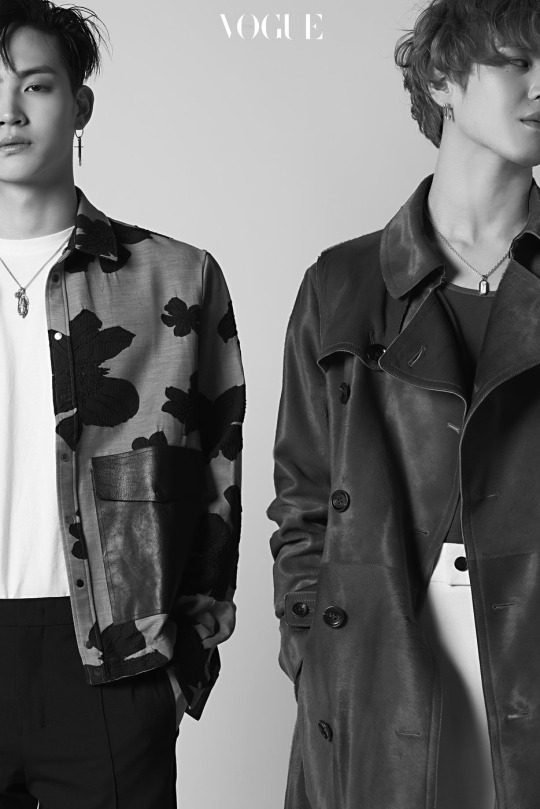
The unit's name was bound to be JUS2. It's only JB and Yugyeom, and it's a stage that can only be presented. "Actually, JUS2 means that it's both a performance and a song. We danced, sang, wrote and composed, and did everything." JUS2 is an example of a completely new creation without losing the members' identity in the group and reveal their talents and tastes.
Q. We are curious about the similarities and differences between you two.
JB: Our personalities are similar but our lifestyles are different. I really don't believe in blood type personalities but we're both type A and there is definitely a timid side to us. When you see us in reality we don't seem that timid. To sum it up, we're both timid and not timid at the same time (laugh). Both of us are considerate so we match well in some aspects. Yugyeom is all about 'let's live life having fun'.
Yugyeom: I don't put too much meaning behind the word 'happiness' and I'm a person who often feels happiness (doing little things).
JB: I like enjoying everyday life but I have a compulsion to not let my thoughts and mind slip alway so I tend to think a lot. There is music that we both like and there's also a point where (our styles) meet. I like strong/fast paced music and I also like calm smooth music, I like all kinds of music. Yugyeom likes the strong turn up kind of music and tends to lean towards the strong music.
Q. If GOT7's energy is bright and fresh, what would JUS2’s energy be?
Yugyeom: Jus2 would be having control and restraining yourself. If GOT7's energy is 'attacking' then JUS2’s energy is more like 'holding yourself back'.
JB: If GOT7 were the shooting star ice cream then JUS2 would be the Vanilla ice cream. Soft and smooth. Personally I like JJ Project's album the most. The story and track order contained all of what I wanted to say/include so it's the album I'm most proud of. After that is JUS2’s album which I'm highly satisfied with. Although there is no overall storyline, the theme of sensation was unraveled.

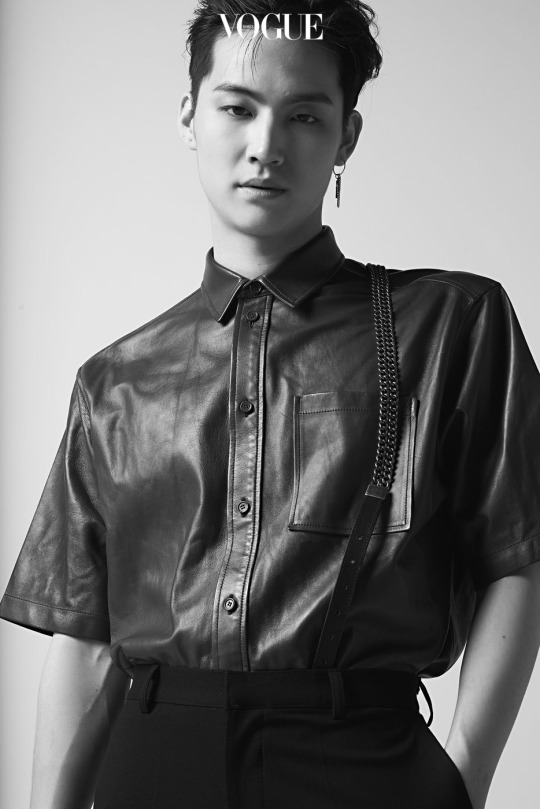
Q. You wrote and composed 'Focus On Me', if you could tell us about the collaboration process.
Yugyeom: We listen to the track and figure out whether to decide the theme first or make the melody first. The theme of FOCUS came up while writing the melody for Focus On Me and that's how it was settled. If anyone can think of a melody while listening to MR, they record it. "This part seems okay" then JB hyung sings it and I try singing it then we keep matching parts.
JB: At the start when I was working on the song and writing the chorus 'focus on me' stuck to me as matching. Since everyone else liked it we decided on it as the theme and wrote the lyrics. The first and second verse were written separately then the lyrics were put together.
Q. In what moments does inspiration tend to come to you?
JB: When I sense if a song's mood is a certain way, I think about what happened in the past or whať's happening now or what I've seen in movies and books. If I get inspiration first then I write it down in my notebook or phone. There are times when I turn songs on and look over what I have written down from the past. And sometimes the lyrics match what you want.
Q. What kind of lyrics do you think are good lyrics?
Yugyeom: the way you listen and the way you write is different. I'm the type to play a melody when I'm trying to write lyrics then I see what matches well in terms of pronunciation. JB hyung pays more attention to the lyrics so lyrics I could never think of came up (from JB). I would be into something else and hyung would come up with lyrics like ”Today you'll raise the white flag".
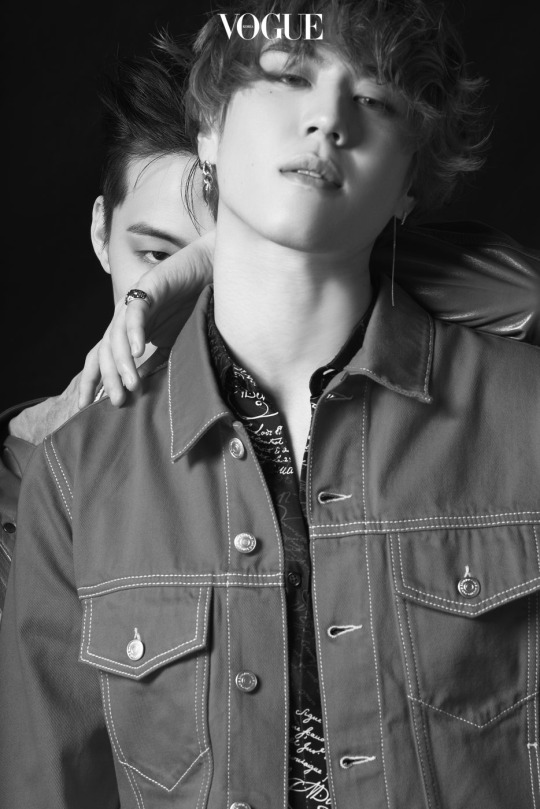
Q. What is a point you appreciate about each other's dancing?
JB: Yugyeom's dancing line is very clean cut. When he stretches out, the lines are really pretty and it also gives off a modern dance feel. He is the best at peculiar moves with his long legs. On the other hand my dance has more roughness.
Yugyeom: what's funny is, I realised this after watching the music video, that I dance with all my fingers out (?) together whereas hyung is the opposite
JB: (his fingers out together?) Yugyeom really likes this.
Yugyeom: That's what my favorite American dancer always did. It has become a habit.
Q. Yugyeom is always wearing black skinny pants in his Instagram dance videos, is it like a uniform?
JB: Not only when he dances, he just doesn't wear other pants in general. Yugyeom has lots of the same pants (laugh). He likes black skinny pants so much that he wears them even during practice. And he has stage shoes, which are more comfortable than sneakers, so he always wears them during practice too.
JB: For me I need the pants width to be big a little. And I always need to have sneakers on. Yugyeom likes skinny style while I'm the type to like a flimsy style.
Q. Things you talked about the most while preparing for JUS2.
JB: It was 'How should we organise/format the album”. Since it's our first time doing a minimal sound, we wondered if it would go well and we worried a lot about the album. We had lots of public relation meetings too (laugh). Looking back, it was fun. Feels like I've been travelling abroad for a few months. To be honest, I haven't been able to travel abroad much but whenever I travel even for a short time I feel really excited, but rather than an amusement park kind of fun I would feel a calm kind of fun. To paraphrase that, it's similar to the feeling.
Yugyeom: It was really fun. Seeing hyung almost everyday, we also talked a lot. I also liked the times where we would go grab a drink after finishing writing songs. Since JUS2 participated in songwriting and also outfits and choreography so it has lots of meaning. The teasers were also captured freely with a film camera while listening to music. Many new unique attempts were made in the preparation process.
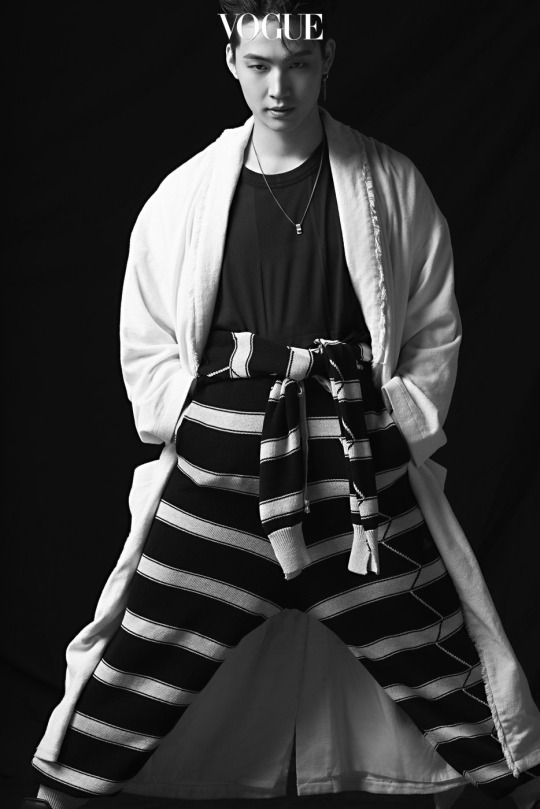
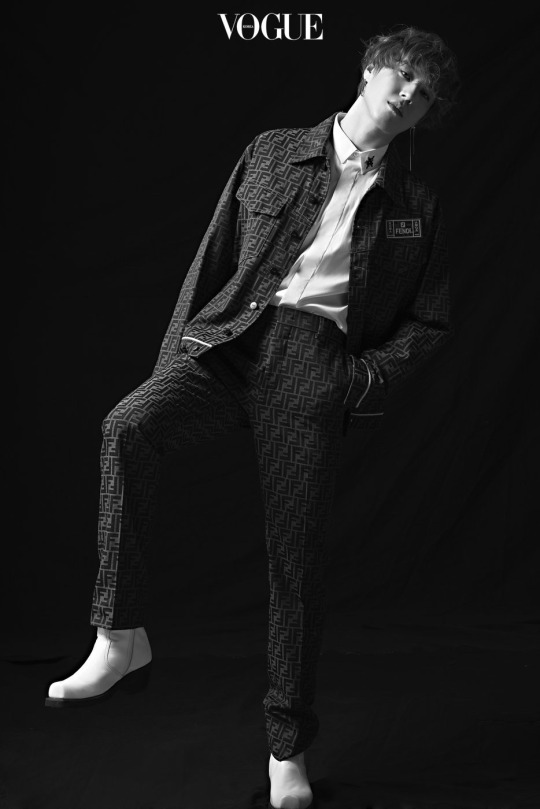
Q. Feels like you have expanded a lot musically. Is there something you do to keep growing?
JB: When I see people I respect or people who are doing well think I should have more thoughts of ’Why is this all I can do'. That's how it works. I think. “Let's have a lot of experiences that will touch me, both indirectly and directly” When I have a chance, I go to exhibitions and think about the agony of the artists. I also wonder how I can use the SNS, which is so full of things, for my development. l once wondered how l could use so much SNS for my development. I take note of places and exhibitions recommended by people, I thought it would be good to get ideas from impressive artwork or videos.
Q. You've been a part of GOT7 for more than 6 years but this is your first time working together with just the two of you. Is there something new you learnt?
Yugyeom: There is no such thing. If I really try to find one, I thought hyung only ate Korean food but he actually likes eating even cream, curry and udon now.
JB: I feel like I've gotten influenced by the other members. I thought my preference for Korean food would never change but I've come to an acceptance point. Last time when we went to Paris, Bambam wanted to try snails. I rejected saying I could never eat snails but it was actually more delicious than I expected. That's the case, I have even eaten snails.
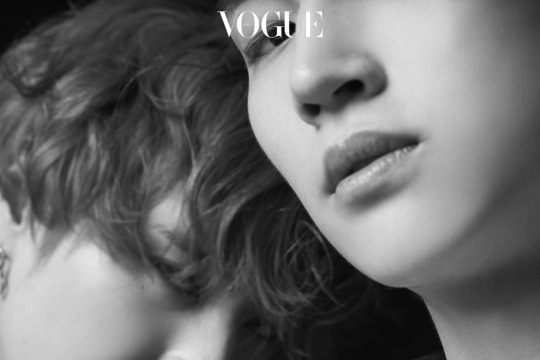
Q. If you were to pick the happiest moment in your day?
JB: When I clean the cats' dung. I see with my eyes that I can do something for someone else. I feel joy seeing the cats in a good shape/image. When I see the bin full of their dung, pride overcomes me as l know (they) have become cleaner.
Yugyeom: I'm the type who likes having lots of schedules but there are times when I become tired physically. I consult with my company and decide on a day off, and the moment I step foot into my house I feel really happy. A break once in a while could be so sweet. I'm happy when I can sleep late after working on songs all night.
Q: Is there anything you've discovered or thought about differently recently?
JB: On the way home after producing yesterday, the taxi driver took a wrong turn and we ended up at Yeouido. Looking out at the buildings through the window, this thought came to me. Within those buildings, people may be fighting or happy but the buildings seen from within the taxi only just look beautiful. I thought maybe the world looks more beautiful if you see it from a distance instead of up close. I thought we too might need some distance in our life as well.
Q: Is there anything you've discovered or thought about differently recently?
Yugyeom: I have always thought this but recently there's something that I've felt more strongly.I must really love music a lot (laughs). I would go crazy if I don't listen to it. If lI'm not listening to music, it feels like I have to and l'd keep thinking about the music I want to listen to. I've been producing songs lately and they've been very healing to me. Listening to and making good music in itself is a source of healing to me. So l realised once again. Ah, I must really love music.

Q. Do you feel the stress of writing while listening to music you like?
Yugyeom: not at all. I've never had such thoughts. There's a song I'm into lately. I really like Travis Scott's Can't Say' so l keep listening to it and watching the music video.
Q. JUS2 will have a world tour in April. GOT7 also proved themselves through a world tour too. What is the meaning behind world tours.
JB: It is like the result of one's efforts. Something that tells me how hard I've tried. An album allows me to witness the response to my agony/thoughts and a world tour allows me to experience that response.
Q. JB you've been uploading mixtapes on music sites for a few years now. How did this experience influence JUS2 work?
JB: I think it made me want to try doing what I really like. In fact, when you make music and keep storing them and going back to edit them, that way you won't have any results. Even if I get a beating (get punished) let's just show them!' that kind of mindset. The fans liked it but people around me reacted coolly. They said I put too much strength in it. I'm also considering different formats. Using the name Def. I wanted to differentiate between me who is in public and me who likes hip-hop R&B. Def. means the best with a full stop after it, ending it with the best. I wanted to convey the meaning that it's only over after I do my absolute best. Moving forward, of course l'll work hard doing the things I'm doing but I really want to show the image of me doing the things I like.
Q. What you want to achieve through JUS2.
JB: Music site ranking was not our goal. "Leť's show a fun and cool different colour”, let's show a completely different image from GOT7 were our goals. Actually even now I'm satisfied. As much as the album was well made, I like it/feel good.
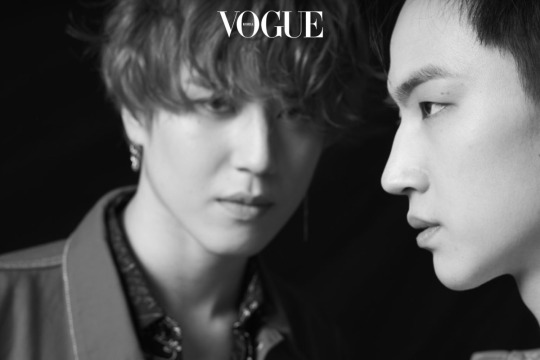
Translated by: defdaily and doobseedoda
#got7#GOT7 JB#GOT7 JAEBEOM#GOT7 INTERVIEW#GOT7 TRANS#JB INTERVIEW#JB TRANS#JAEBEOM INTERVIEW TRANS#DEFDAILYinterview
6 notes
·
View notes
Text
Here’s something I’ve been wanting to discuss for a long time because I wish people were talking about it a little more explicitly so that our culture could find a way to better deal with it. There’s this characteristic of certain people’s personalities that I can’t pin down a particular word for but as many people in my experience have this in one degree or another there certainly should be a word for it. It has to do with feeling compelled on a fundamental level to be, I guess I’ll call it, verbally entertaining, as much as possible in social situations.
In my life I’ve known several people who I would say have extreme forms of this condition. They have such a deeply-ingrained compulsion to turn every moment in each conversation into a clever or provocative joke or verbal spar that their minds seem to be incessantly working at manufacturing them on a subconscious level and eventually they spit out attempts that hit the mark only occasionally and often land far from anything actually funny. The primary obligation they put on themselves is to just make sure they keep putting in the effort -- they can worry later about whether what they said was actually funny or might have offended someone, just as long as in the moment they keep throwing things out there. And it’s reached the point of being mostly a subconscious compulsion that’s hard to control, even if they know that they’re annoying people and mostly failing at very funny or interesting. It gets to the point that it seriously affects relationships. As far as I’m concerned this characteristic is so marked in some people that it deserves the status of a named disorder, and in fact I wouldn’t be entirely surprised if it actually does become something diagnosable in the not-so-distant future, given that the direction of progress is always towards providing more diagnostic explanations for behavior. (Although I certainly don’t posit that it’s entirely or mostly innate; see below.)
I’ve known way, way more people with much milder but very apparent cases of this. Most comedians probably have it to some extent. It’s about feeling under constant pressure (at least in certain social contexts) to keep producing verbal wittiness, enough to outdo or at least stay on par with anyone else in the vicinity, and when pure wit won’t go far enough, being as outrageous and provocative as possible (without actually getting into trouble for it of course). These people treat every social interaction like a test at how consistently amusing they can be and as a contest as to who can be most impressively quick-thinking in this endeavor.
Now in my experience, this is, uh, not quite distributed evenly across genders.
Yes, you guessed it, pretty much 100% of the people I’ve encountered in my life that this post describes are men.
To me there’s a pretty obvious explanation of this based on certain traditional gender roles that still haven’t changed much to the present day. Part of the male gender role, in a very broad sense, is to work at some skill that can be shown off in order to impress women or in order to outdo each other. Men perform; women appreciate and applaud. Men are judged for failing to perform, and women are often met with resentment for failing to sufficiently applaud a man who felt like he put a reasonable amount of effort into performing. These gender roles, like all gender roles, are enforced so that both men and women routinely suffer for failing to conform to them.
In the absence of visible wealth, musical instruments, a game being played, or daunting amounts of knowledge on something that happens to be directly applicable to a given conversation, perhaps the most easily available means of Generally Being Impressive is verbal wit. And so men are far more likely than women to feel under pressure to display it as much as possible at all times. And when sheer dryness isn’t sufficiently in supply in the heat of the moment, a much quicker way to stand out and turn heads is to maximize for shock value. Naturally one strategy for maximizing one’s overall score is to get as close to the line as possible without actually crossing it -- that obviously shows serious skill!
As is the case with most confining gender roles, it’s not simply that one gender is enforcing this on the other. The typical guy probably faces more pressure to go this route from his male peers than from girls, and in the most extreme cases I described above, it’s obvious that most women and even most men around him don’t want him to go anywhere near that far -- it’s a burden that that person is almost entirely forcing upon himself, making it all the more frustrating to witness.
I think it’s not unreasonable to say that for a lot of guys growing up, contests to see who could be the most shocking and outrageous and edgy in their humor (often to the expense of actual wit and comedy) are sort of a cornerstone of their social interactions. And this is relevant to a lot of societal concerns that have been coming up in the political climate of the past few years, especially concerning seeds of the Pepe-type alt-right trolling culture that’s become visible to the mainstream (although I think there’s another much more sinister component to that, but that’s something I’ll save for another post).
I’ve been meaning to write about this for months if not years, but the particular event that finally spurred me to write this is this week’s controversy over Harvard rescinding its offer to one of the Stoneman Douglas shooting survivors after one of his classmates exposed a bunch of racist mumbo-jumbo he wrote in a Google doc shared with a project group two years ago. I only bring this up because it’s such a clear-cut example of what I’m talking about: his racist rants were clearly devoid of any intellectual content whatsoever (e.g. he wrote the N-word in capital letters about a dozen times in a row and commented that practice was making him better at typing it or something) and includes anti-Semitic rallying cries despite the fact that he and his family are Jewish. His explanation that this was all part of a contest to see who could write the most shocking or extreme thing is completely credible to me given what I know about that situation and about culture (and while I don’t know who else was in his study group, I’d place my bet on them all or mostly having been boys). But beyond that, nobody really seems to be addressing the issue in a way that can ameliorate the tendency for young people to get sucked into this kind of behavior, which obviously has the potential to be hurtful and contribute to a toxic high school atmosphere and then bleed into adult behavior. (As for how I feel about Harvard’s decision, I can’t really blame them as unfair as I think it is on that student; I kind of do want to blame his classmates though.)
The way I see it, this social norm needs to be addressed in a reasonable way that recognizes its origin for what it is: a burden placed on men (often by themselves and each other) which are then acted on in a way that harms the other people around them. Unfortunately, the attempts to round it off (as so many other things are rounded off nowadays) to privilege and actual racism and deliberate malice don’t look like they’re going to result in much forward progress.
32 notes
·
View notes
Text
What disorder did Lenora have in Russian Doll?

(NOTE: Fictional Diagnosis delves into the minds of fictional characters. The diagnoses given are a way to learn more about psychological disorders and give an individual viewpoint of made-up people. The intention of these blogs is in no way to belittle or mock the severity and real consequences of these disorders, but to simply provide a unique way of learning about diagnostics and the DSM-5. People cannot truly be diagnosed unless they are working directly with a clinician. What follows is merely the opinion of a bored masters of psychology student who watches too much TV)
Many of us over the last week have binge-watched Russian Doll on Netflix. Despite the sci-fi premise, this show portrays a beautiful metaphor displaying the effects our psychological hangups can have on our lives. Nadia, in her never-ending time loop, is forced to take a deep look at herself and her past traumas related to her mother in order to free herself and keep on living. Although Nadia herself would be an interesting enough character to delve into the mind of, I found myself more interested in the ongoings of her overly eccentric mother, Lenora. That is why this Fictional Diagnosis will focus on Lenora Vulvokov.
Before diagnosing anyone there are a few questions that must be answered: What are the symptoms, when did they present, what is their severity, and what is their duration (i.e. how long has the most recent episode lasted). Our knowledge about Lenora comes from brief flashbacks and present conversations between primarily Nadia and Ruth, Lenora’s former therapist and surrogate mother of Nadia. Due to this there is a lot of information that has to be inferred.
We do not know when Lenora’s symptoms first appeared, nor how long her episodes (if she had them) lasted. We do get the sense that Lenora’s behavior was pretty stagnant. There is no mention of “happier times” or what is was like before these behaviors started. The descriptions that Ruth gives of Lenora seem to indicate that she always seemed to present in the fashion we see her in during her flashbacks, though we do get the idea that sometimes her symptoms do get worse (the watermelon incident seems to be a standout memory for that reason).
As Lenora is not going from periods of stability to instability, there are many disorders we can rule out. Bipolar type II involves high highs and low lows, but also has periods of normalcy in between (by normalcy I refer simply to not symptomatic, not normal from a cultural standpoint). Bipolar I, though not requiring any symptoms of depression, also involves periods of normalcy. As the descriptions we hear about Lenora do not seem to indicate a back and forth like this, we can likely rule bipolar disorder out.
Depression, anxiety disorders, and obsessive compulsive disorders can be ruled out here for similar reasons. Lenora’s symptoms do not seem episodic, but chronic. Because of the continuous nature of her symptoms, it is very likely that Lenora is suffering from a personality disorder. There are many personality disorders in the DSM-5, but only a few could possibly work for Lenora. This is the part of diagnosing that we really want to focus in our her symptoms. Lenora seems sensitive to the perception of others, and is emotionally labile (her emotions change drastically and quickly). We see her distraught over an employee at a store appearing concerned for her daughter, and watch her destroy her home over Ruth’s noticeable annoyance of her new watermelon fixation.
And speaking of the watermelons, we have a pretty key symptom here. Lenora tells Nadia while they are out buying them that “this is the day we get free.” What we can gather from this is that Lenora has made a connection between these watermelons and getting out of some situation. These connections, paired with her going with gut feeling, make me think she is experiencing “ideas of reference” a psychology term that refers to a belief that coincidences or unrelated events are somehow related. As an example of this, maybe you think your partner is cheating on you. While you’re out you see a restaurant telling you to cheat on your diet. With ideas of reference, that might lead you to believe that your fears are correct and that sign proves it. We do not know why Lenora believes these watermelons will somehow “free” her, but a causal link would be hard for most to find. Her statement that she has a “good feeling” about the deli on 12th in relation to her goals could show some form of “magical thinking,” a belief that your thoughts can somehow control the world around you. In this thinking pattern, if you believe something to be true, then it must be. A good example of this is if you wished ill upon someone you don’t like, and a week later they get sick or injured. Magical thinking would be a belief that you were the one causing that harm, instead of the likely event that the things were unrelated.
Lenora also seems to be paranoid, as she tells her daughter to not let anyone tear them apart. Her getting free seems to have something to do with leaving the city as she states she’s not spending another winter in the city and plans to donate all her coats. We do not know why she is so desperately trying to leave, but are led to believe that her reasonings are likely imagined as Nadia never recalls or mentions a genuine threat to her and her mother.
These magical beliefs and paranoia leave us with a few possible contenders, namely: schizoid personality disorder, schizophrenia, and schizotypal personality disorder. At this point we would need to go symptom by symptom in the DSM to see what fits best. Having done so I have landed on schizotypal personality disorder being the best bet. As schizophrenia and schizoid personality disorder frequently have the symptom of constricted affect (lack of expressed emotion), this seems extremely unlikely for Lenora. Lenora is full of emotion and does not hold back in her expression. Furthermore, ideas of reference are not commonly associated with those two disorders. Symptom by symptom, schizotypal simply fits the best. In order to receive this diagnosis, five out of nine symptoms of schizotypal personality disorder must be present. The nine are:
Ideas of reference
strange beliefs or magical thinking
abnormal perceptual experiences
strange thinking and speech
paranoia
inappropriate or constricted affect
strange behavior or appearance
lack of close friends
excessive social anxiety that does not abate and stems from paranoia rather than negative judgments about self.
We already know she has ideas of reference, magical thinking, and paranoia based on above. We are not certain if there are abnormal perceptual experiences based on the information given, and don’t see an inappropriate or constricted affect (though her emotional reactions are overblown, they are no inappropriate to the situation. Laughing while being yelled at, or crying at a joke would fit this criteria). Her thinking and speech are not strange, though her beliefs are (i.e. we understand what she is saying and she speaks coherently). We can ascertain she does not have many if any friends beyond her therapist and daughter so lack of close friends is safe to say (also considering her therapist was the one to take Nadia in, she likely had no other options, backing up this believe). The excessive social anxiety can also be seen based on her overblown reaction to the sales clerk “yelling at her.” This seems to be tied to paranoia based on her telling Nadia that no one can tear them apart. With all this in mind, Lenora meets the necessary five symptoms, and possibly several more. With this in mind we can with some confidence attribute her behaviors to schizotypal personality disorder.
#russian doll#psychology#disorders#diagnosis#disorder#personality#netflix#natasha lyonne#nadia vulvokov#lenora vulvokov#amy poehler#dsm#therapy#counseling#learning#education#pop culture#television#streaming#schizotypal#personality disorder
67 notes
·
View notes
Text
true happiness is so neeeeaaaar
a special thanks to @bethanyactually for reading this over and @notbang for talking some of this out with me. 💖
During my latest watch of Crazy Ex, I kept an eye out for the first time each character breaks into song without Rebecca present or directly involved. It’s well-covered ground that her arrival in West Covina sent ripples through our cast of characters. Inspired by Rebecca’s pursuit of happiness, they started asking themselves—consciously or subconsciously—what would make them happiest. So when does each of them adopt her musical lens, and how does the song they sing inform their journey toward happiness?
Greg – Not surprising considering he wears his unhappiness on his sleeve, Greg is the first one to break into song without Rebecca in episode 1.06 with “What’ll It Be?” The song isn’t really a revelation because there’ve been plenty of hints at just how dissatisfied he feels with his life. Greg hates West Covina (as evidenced by him telling Rebecca it’s not a compliment that she’s starting to fit in around town) and he hates the circumstances that he feels keep him from making any meaningful changes (at the party in the first episode he wastes no time complaining to Rebecca about missing out on Emory because of his sick dad).
Still, “What’ll It Be?” acts as Greg’s thesis statement for that unhappiness. Despite knowing exactly what it is that’s causing his unhappiness, he feels powerless to change it, instead blaming outside forces for keeping him in his current situation. “Hey, West Covina, look what you’re doing to me.”
The unfortunate part is that Greg himself is actually the largest obstacle standing between him and happiness: not his dad, not his job, and not the people of West Covina. His dad, while he seems to appreciate Greg’s presence and care, has clearly decided he’s going to pursue his vices instead of actually maintaining his health. Since he doesn’t actually need to be looked after—he’s made the conscious choice to be unwell—he gives up Greg pretty easily when the time comes in 2.02. Though Greg asserts that he’s going to be upset by his leaving, Marco’s behavior (i.e. chastising Greg for wasting his savings on him because he was supposed to use it for school) actually point to the fact that he’d be happy to see his son leave even back in 1.06.
As for his job, yes, all food service professions suck on a certain level, and Greg’s certainly not getting rich for the drudgery he has to endure. However, in 1.06, we see that Greg’s attitude is really what makes the job such a drag. Kevin, his boss, is in fact a pretty understanding and amiable guy. He takes feedback well and genuinely wants his employees to succeed. The fact that Greg feels so smothered there has as much to do with how he approaches the situation as it does the nature of the job itself.
Finally, the people of West Covina/the town itself only seem like they’re keeping Greg trapped because he actively dismisses and looks down on it all. In reality, the people he associates with most closely—White Josh, Hector, Rebecca, and again, even his father—actively encourage Greg to make changes with an eye toward pursuing business school, as well as call him out on his most destructive behaviors. It’s just that Greg can’t take their encouragement at face value because he’s dwelling on the negativity in his life and can’t seem to break that habit.
Of course, alcoholism plays its part in the unhappiness equation, and that’s no small thing. But, again, that’s something Greg has to deal with and overcome internally. It has little to do with his external circumstances, as the Greg who’s singing “What’ll It Be?” would have us believe.
It makes sense, then, that when he finally takes ownership of his hand in his own shitty situation, he’s able to break the pattern and actually pursue the career of his choosing. He removes himself from the environment that tempts him back into stasis and takes control of his life. No longer feeling powerless, Greg is at least on the path to knowing happiness.
Paula – Paula’s the next one to get caught up in the music with “His Status is Preferred” from 1.07. On the surface, this song seems like a trite expression of unhappiness, of simply wanting a more exciting life, but, as we know, the situation’s a lot more nuanced than we think.
During the course of season one, it becomes clearer and clearer that Paula’s over-involvement in Rebecca’s pursuit of Josh has more to do with her than it does Rebecca and Josh being genuinely good for each other. I believe 1.03 is the first time we see Paula and Scott interact and boy is it uncomfortable. Scott is distracted, Paula’s passive-aggressive, and the kids are a mess.
The further we move into the show, the more we understand Paula’s state of mind. She’s been raised to believe that starting a family is the most important thing she’ll ever do (“My dad was right, I’m a breeder not a leader”), but she feels very disconnected from both her kids and her husband. Part of the reason is that she thinks she missed out on her fairy tale romance, so how is anything she actually built supposed to compare to that? On some level, Paula’s always living in a fantasy realm where everything worked out with Jeff and she’s truly happy.
It should be pointed out, though, that while Jeff gives Paula’s yearning for something different a face, the problem itself is not specifically that man. Any fantasy would do in keeping Paula from fully accepting how her real-life relationship played out. In point of fact, Calvin fills that role here in 1.07. He’s just another expression of Paula chasing a fantasy to avoid dealing with her reality.
As such, Paula’s just as much a product of the damaging “patriarchal love narrative” as Rebecca. The notion that real and true love is all about the spark, that it’s a force of nature you can’t possibly fly in the face of, that it’s something easy and all-consuming keeps her from doing the hard work necessary to maintain a relationship with her husband and family. And, because she feels the spark with Calvin, she gets caught up in the fanciful notion that being with him will make her feel happy, important, and valued — “My whole life has been stuck in economy, I have waited and waited to someday be upgraded, to spread my wings and fly…”
Of course, we have Rebecca swoop in and point out that Paula’s pursuit of Calvin isn’t an authentic or healthy remedy to her true unhappiness before anything regretful happens. Because it’s Rebecca imposing her own revelation on Paula though, this is far from the last time the issue comes up. At this point, Paula hasn’t learned the lesson herself, and she needs to fumble a little more before she does.
We still haven’t seen the final resolution to this conflict, and I don’t think there will be one scene or moment that wraps it up with a nice bow. Deep-seated issues like Paula’s unhealthy relationship to what it means to be a mother and a wife don’t simply go away. 3.07 showed us that she’s mindful of what her patterns are, but we have yet to see evidence that the work is being done to avoid falling back into them. She’s finally let go of the fantasy, but that doesn’t mean she’s ready to feel content with reality.
Valencia – In 1.09, Valencia is the next character to break out into song by herself with “Women Gotta Stick Together.” When I first sat down to write this meta, the fact that Valencia was the third most affected by Rebecca’s pursuit of happiness seemed surprising. They have such a complicated, antagonistic relationship at this point, it’s kind of jarring to imagine Rebecca having a hand in connecting Valencia with her happiness.
Upon further reflection though, it makes perfect sense. Valencia has constructed a life that makes her so deeply unhappy, of course Rebecca swooping in and going after the foundation on which Valencia’s built her on-paper fantastic life would bring all her dissatisfaction to the surface. “Women Gotta Stick Together,” then, is Valencia’s acknowledgement of everything that keeps her feeling trapped, just buried under a few layers of satire and subtext.
You see, Valencia is a classic case of how female socialization teaches us to view all other women as threats because we’re competing for male attention, and this perceived competition has kept her from truly connecting with other women. However, as we know from her interactions with Rebecca in 1.02 and her eager initiation into the #GurlGroup4Evah, Valencia actually craves female friendship above all else. She regrets losing her high school friends because she was given male attention instead of them (read: sexually assaulted, yikes). She is willingly wooed by the potential relationship with Rebecca even though she was clearly skeptical about ulterior motives. And she throws herself into the group activities—embracing everything from going to the bathroom in pairs to awkward sex toy parties with vigor.
So, even though she’s using satire to mask it, Valencia definitely desires the picturesque, supportive relationships she describes in the beginning of the song: “Females helping females for the greater good. Sisters helping sisters, that’s called sisterhood.” Unfortunately, at this point, she’s also unable to get past her compulsion to attack and belittle every other woman with the end goal of proving she’s the most desireable.
It should also be noted that Valencia’s wholehearted acceptance of the competition narrative is born of her need to ignore her attraction to other women. Though I personally think Valencia’s coming out arc was a travesty because it was handled so poorly, it still confirms in canon that her relationship with Josh was a big, honking example of a woman struggling with compulsory heterosexuality. For evidence, look to V’s 2.05 speech about how she knew the relationship was dead a long time ago—she felt it necessary to keep pushing this relationship forward without love and affection from Josh because a) love and affection was not actually what she wanted from any man and b) she feared having to adapt to the change and examine her life if her and Josh broke up, forcing her closer to the truth that she’s a lesbian—and the scene between Valencia, Josh, and Beth in beginning of 3.12 where it’s revealed that Valencia had a problem with Josh touching her but has no such reservations when it comes to Beth.
That being said, her constant putting down of other women and their appearances functions as a way for Valencia to distance herself from her attraction. It’s easier to remain locked in competition and criticize other women’s bodies than it is to accept her attraction. (Valencia’s clear overcompensation is the reason it’s totally OOC for her coming-out process to be easy and easily glossed over.) But, of course, without acknowledging her true self, Valencia can never be truly happy with her relationships.
Finally, “Women Gotta Stick Together” hints at the unhappiness Valencia feels trying to live under the pressure to look physically appealing to men. There are clear mentions throughout the series of Valencia’s disordered eating (in 1.06 with the “I’ve been starving since 1998” line and plenty of dialogue in 2.05 and 2.07, to name just a few examples). Not only is she overcompensating for her attraction to women by dissecting their appearance, she’s overcompensating for her clear discomfort with her own body by building herself up in relation to how much skinnier she is than her “competition.” Not only is she starving her physical body of sustenance, she’s starving herself of the chance to be content.
Darryl - In 1.10—consequently, right after he spends time with Rebecca socially for the first time by crashing her bus trip to the beach—Darryl gets his solo number. “Having a Few People Over” is far from the deepest song the show’s ever done, but it is still a very clear statement of Darryl’s unhappiness.
The man is obviously lonely, and he tries way too hard to manufacture interpersonal relationships he feels will assuage his loneliness. He’s constantly pushing a friendship with Paula despite her implicit and explicit desire not to have one. He inserts himself into Rebecca and Paula’s private conversations because he wants so desperately to be involved. In 1.10, he hires a bunch of escorts so the guys won’t be bored enough to bail on the evening. He even goes so far as to bully Maya because he sees the same unflattering desperation in her.
And the fact that he tries so hard, that he uses flashy bells and whistles to attract people to him, shows a deep dissatisfaction with who he is at his core. Darryl doesn’t think that his personality, alone, is enough to earn the bond and acceptance of friendship. He feels he has to dress up his company in something fancy—like, say, an EDM song—to be good enough.
Because this is such a consistent character trait of his, I was disappointed with the framing of his season three storyline. At this point in his life, Darryl has forged more meaningful bonds than he had before with White Josh and the people at Whitefeather. I wish the writers had taken the opportunity to let Darryl explore why he still felt so unhappy with his interpersonal relationships, gone more of a “if I still feel lonely with WhiJo around, if i feel like I need to manufacture a more serious relationship with a baby, what would it actually take for me to find happiness?” route.
Heather - Heather is just about the last person to break into song without Rebecca present with “Don’t Settle for Me” in 1.13. As possibly the most self-examined character on the show, her expression of unhappiness has nothing to do with internal conflict. Instead, she expresses dissatisfaction with her situation. Heather knows her worth, and won’t allow Greg to keep them both in a relationship if he’s not being honest about his intentions.
Interestingly enough, though Heather has an identity crisis in season three because she likes being a student, the arc of her conflict centers on her not knowing what the world has to offer her besides the opportunity to learn. While the character feels unmoored from her identity, she still approaches the situation with a kind of self-assuredness everyone else lacks. Her unhappiness in season three, again, has more to do with external circumstances than deep-seated emotional trauma or hangups.
And it’s fitting, then, that the resolution to this specific storyline is that Heather creates her own place in the world. She sees an opportunity and takes the chance to become gainfully employed at a job that still allows for creative expression through the various hobbies and special interests she wants to pursue.
Josh - Pretty much for the opposite reason as Heather, Josh is the last main cast member to get his own musical number with 1.17’s “Angry Mad.” The reason he’s so late to join everyone else in their examination of unhappiness is because Josh is typically pretty satisfied. He’s not looking for any deeper meaning or purpose. All his conflict in season one is surface stuff, like feeling too adult to celebrate Christmas.
And even when he does start to feel unhappy about something—i.e. losing Rebecca’s affirming attention and affection when her focus shifts to Greg—he doesn’t have the self-awareness to really explore what’s at the root of that emotion. He’d rather not acknowledge or face the problem head-on. As a result, “Angry Mad” expresses that Josh is unhappy because he’s unhappy instead of taking a closer look at why seeing Rebecca with Greg makes Josh uncomfortable.
This inability to take stock of his life definitely bites Josh in the ass more than once. It’s what gets him in over his head with Rebecca in season two. It’s what leads him to leave Rebecca on their wedding day instead of calling off the wedding (or perhaps never proposing in the first place). It’s what stops Josh from taking action to halt his downward spiral in season three because the poor oaf doesn’t even realize he’s spiraling until it’s too late.
That being said, season three did a major disservice to what little interiority the character had. I hope season four regains some focus when it comes to Josh, and he’s at least set on the path toward understanding himself and his needs better.
Nathaniel - Finally, we have our late-comer Nathaniel. It takes him eight episodes to get a solo without Rebecca being there with the 3.03 number “I Go to The Zoo.” This puts him right between Paula and Valencia in terms of how long it took Rebecca to influence his worldview enough to get him breaking into song.
Not surprising considering he’s one of the most emotionally stunted characters, his big number is essentially about retreating into childhood comforts when he’s feeling upset. The thing is, while Nathaniel’s trying to find solace in the simplicity, his upbringing is also the source of his unhappiness. His withholding parents never gave him the tools he needed to process his feelings and deal with them healthily. The effects of this have reached well into his adult life as he seems incapable of forming lasting, meaningful bonds with any person—from his disinterest and mistrust of long-term relationships in season two to his series of dick moves with Mona in season three.*
Even his interactions with Rebecca, the person who he confesses makes him want to be better at feeling his feels, lack authenticity eighty percent of the time. His confession of love in 3.04 is an inarticulate mess that devolves into a tangle of misused cliches. He’s clearly working off the Patriarchal Love Narrative, trying to be the definite-article Love Interest, instead of allowing himself to have a genuine moment with Rebecca. In the season finale, their duet is, at least on one level*, a big long joke about how little progress Nathaniel has actually made in accessing his emotions and feeling more empathetic.
Though he’s made progress toward being more open—look to the final scene of 3.06 or even his confessions during the masquerade—he still can’t seem to consider how his actions or emotional needs might affect others. Once, he might have considered this machiavellian approach to interpersonal relationships a strength. Now that he’s found some people he really wants to form lasting emotional bonds with, though, it’s the weakness that’s standing between him and happiness.
*I’d like to clarify that I’m not trying to make the argument that Nathaniel’s upbringing in any way justifies his behavior, especially when it comes to the affair, but it does give us at least a better understanding of his motivations, a clearer lens through which to view the character. And I think that’s another important element of Nothing is Ever Anyone’s Fault. While taking empathy for people’s trauma to the extreme makes it almost valueless and a mockery of itself, the ability to understand why people behave the way that they do is fundamental to liking any of the characters on this show. The line that you have to walk, then, becomes messy and complicated, but it makes for a truly fascinating look at human nature.
#crazy ex girlfriend#crazy ex meta#greg serrano#paula proctor#valencia perez#darryl whitefeather#heather davis#way too badass to be someone you settle for#josh chan#nathaniel plimpton#yes i gave my meta a cutesy title#what of it?#also#now i can stop talking about how i should finish my crazy ex happiness meta#because BAM#i finally actually did it
86 notes
·
View notes
Text
The Dos and Don’ts Of Living A Happier Life.
There’s no shortage of how-to guides on making money and seeking fame and fortune, but these guides tend to leave out a crucial element: what to do when all that money and success still leaves you feeling empty and unfulfilled.
You might wonder how someone with endless amounts of money could possibly feel unhappy with their life, but, as experts explain, money is no harbinger of happiness. In fact, money, fame, adoration, awards and the newest cars, clothes and gadgets can’t bring anything but a fleeting sense of happiness in the guise of pleasure.
To find sustained and meaningful happiness, we must look beyond money and the shiny new toys it can buy. We must look within ourselves, and to the steps we can take to change our perspective on the world around us, and not lose sight of the things that really make life worth living. Ahead, you’ll find a variety of tips and methods to help you develop a happy mind and a happier life.
Many people believe that happiness depends on external factors, but it doesn’t.
If someone asked you to define happiness, what would you say? Most of us assume we know what happiness is, but, if we stop to think about it, the concept becomes fuzzy. Let’s take a closer look to see if we can pin down what it is, as well as what it isn’t.
One common misconception is that happiness depends on external factors, such as material goods or events. People tend to associate happiness with nouns, like cars, vacation destinations and sexual partners, or moments in time that mark a personal or professional triumph.
What all these things have in common is that they provide only temporary moments of pleasure. As a result, people develop the impression that their happiness is tied to other people, or to whether or not a future event will occur.
This isn’t ideal, because, when your happiness is inextricably linked to external factors, you have no control over your happiness in the here and now.
You don’t have to look too hard to see that this arrangement doesn’t bode well for sustainable good cheer. In fact, the more you turn to external sources for happiness, the less happy you’ll be.
For millennia, people have lived under the misguided assumption that they can buy happiness, if only they had enough money. Yet there are numerous studies that show that wealthy people are just as miserable as anyone else.
When the average person sets out to gain money, they do so to buy all the luxury items they associate with the good life: big houses, fancy cars, massive TVs and stereos. But these things don’t just fail to bring lasting happiness, they also end up putting people into debt. The resulting financial pressure can easily send a person spiraling into more anxiety and depression than they had before they bought all their fancy toys.
Happiness isn’t found in the future or the past, and it won’t be delivered by other people.
While life is an amazing gift, it’s far from perfect. On any given day, we can be confronted with illness, heartbreak, an unexpected financial calamity or any number of anxiety-inducing events.
As a way to escape these difficult moments, we often resort to activities that take us out of the present. If you’re looking for happiness, this method of escape is actually a mistake, because happiness can only be found in the present.
When your mind isn’t focused on the present, logic dictates that you’re either ruminating on the past or fantasizing about the future. These are common places to be, since it’s easy to daydream about finding a perfect job, going on a perfect date or winning the lottery so you can pay off your student loans. Other times, you might be caught up in the past, lingering over memories of better days or cringing over a regretful thing you wish you hadn’t said at the company picnic last weekend.
Spending time in the past or the future may seem preferable, especially if there are ongoing problems in the here and now. But you can only find happiness in the present, because that is where the experience of life takes place.
In addition to spending too much time in the past or future, another common pitfall is expecting other people to bring happiness along with them when they enter your life. Many people think: if only I could find that perfect Ms. or Mr. Right, everything would be in harmony!
Of course, when that perfect person does come along, they inevitably discover that happiness didn’t magically appear. Instead of realizing that other people aren’t the key to contentment, they decide to bring yet another person into the mix: if only we had a child, then everything would be perfect!
No matter how strongly you believe someone else is the key to your happiness, the fact is that no lover, friend or child will ever be capable of providing you with the sustained, lasting happiness you seek. That kind of peace of mind can only be achieved by going inward and finding it within yourself.
Happiness is different than pleasure, and happy people have common traits.
If you have a sweet tooth, your idea of happiness might be a delectable bar of Godiva chocolate. The chocolate may be delicious, but this way of thinking reflects another common mistake: confusing pleasure with happiness.
Like money or material goods, pleasurable sensations are fleeting experiences that will never add up to a satisfying or lasting state of happiness. That doesn’t mean there’s anything wrong with pleasure, or that we shouldn’t celebrate and enjoy it. But you must keep in mind that pleasure is a sensation, and therefore unstable; in the scales of life, it will always be balanced out by sensations of pain and discomfort.
Happiness, on the other hand, can be sustained and experienced separately from the changing circumstances of your life. In other words, happiness can be relatively stable, as long as you stay in the moment and keep your attention on the positive elements. That way, even if there are feelings of pain and discomfort, it is possible to remain content and happy in life.
You may be wondering, how is this possible? This kind of steady happiness can be attained by staying aware of your emotional state, and embracing the experience of life as it is happening. Let’s say you’re feeling lonely. Instead of immediately turning on the TV to distract yourself from this feeling, stay present and accept the loneliness as a perfectly natural feeling. If you relax and tune in to yourself, you’ll find that the steadiness of happiness can exist alongside your temporary feeling of loneliness.
While there are no rules or shortcuts that work for everyone, experts have found some commonalities in those who have managed to sustain their happiness.
Happy people tend to appreciate the simple things in life: they’ll admire picturesque scenery and appreciate a good night’s sleep. They also have professions that they find motivating and engaging, and they make a point of looking after their health and wellness.
Moreover, happy people are content to be on their own, which means they tend to be selective about who they spend time with. Those they do let in as friends or partners are supportive – not the bad company that unhappy people often keep. If you think that more people will make you happier, you might be more willing to keep company with some shady characters.
Unhappiness and harmful behaviors can be triggered by survival-related fears.
Now that we have a better idea about the nature of happiness, let’s take a look at the other side of this emotional coin and see the different reasons we can end up unhappy.
One of the mysteries preoccupying modern researchers is why so many people who live an affluent life with plenty of money and creature comforts remain unhappy. One suggestion is that there are fears about survival behind this unhappiness.
When evolutionary psychologists look at the neurological wiring of the modern human brain, they see plenty of primitive connections that are still active.
A significant part of our brains’ development took place during the stone age or earlier – times when survival rates were relatively low, and we needed all the mental help we could get. Big threats to survival included getting kicked out of the tribe, or losing access to resources. Either experience could easily have been a death sentence.
These days, our survival instincts continue to be triggered by threats to our social standing, or the potential loss of valuable resources like money. If a coworker gives us the cold shoulder or the phone bill suddenly doubles, we can feel a sense of life-threatening panic that isn’t necessarily warranted by the relatively benign problem at hand. But as we inevitably encounter many of these social or financial problems throughout our days, we can experience a constant level of stress and unease that adds up to a general unhappiness.
Is it any wonder that, with all this daily anxiety, we engage in compulsive behavior intended to calm our nerves? Ironically, however, such behaviors – like binge eating junk food – tend to be far more harmful than the cold shoulder from the coworker.
Our fears are so strong that the attempt to avoid them can lead to long-term harm and unhappiness, such as when we stay with an abusive or manipulative partner. Our desire to be connected, even to someone who is bad for us, is directly related to our instinctive desire to avoid the fear of being cut loose and left to fend for ourselves.
Ultimately, if our instincts believe it to be a matter of life or death, then our happiness can suffer. Unfortunately, much of that suffering is needless these days.
Childhood trauma can increase the likelihood of chronic unhappiness, but it can be treated.
If you know someone who’s in a perpetual funk, you may feel the urge to tell them to just snap out of it. Surely they’d start feeling better if they would just get out of bed and get some sunlight, right?
Just because this kind of response works for you when you get the blues doesn’t mean it will work for someone whose past experiences have left them with a more chronic unhappiness.
A constant depressive disposition may be the result of childhood trauma.
If someone has a traumatic event in their past, especially if it occurred in their first six years, it can significantly increase the severity of those instinctive fears and inform how that person will react to rejection or scarcity.
Therefore, the quality of parenting during those formative years can greatly influence how a person will respond to the common stressful situations of everyday life. If someone’s parents provided unconditional love and support early on, they’ll have a wholly different perspective on life than the person whose parents were abusive, absent or emotionally unavailable. Indeed, not being loved as a child can be very traumatic – so much so that the effects can last a lifetime.
However, this doesn’t mean that people with a traumatic childhood are doomed to be unhappy.
Even though trauma has been linked to the mind’s instinctual response system producing more anxious reactions to the world, other areas of the brain such as the neocortex offer hope. The neocortex is the center of our conscious decision-making as well as our emotional and cognitive intelligence, and it allows us to take in new information and choose our responses.
Take someone with a history of trauma. When they stumble into a financial hole, their survival-related fears could kick into overdrive. If they take a moment to let the neocortex do its job, instead of letting the instinctual response take over, they can put the problem into perspective and come up with a solution. Rather than succumbing to fear, the person could choose to come up with a better monthly budget.
The more the neocortex is used, the stronger it gets. It can also be helpful to see a professional; therapists can help us change our perspective and look at things in a positive way.
Being happy is up to you, and it helps if you have a plan.
Money is something we can spend, borrow, loan to one another or save up for a rainy day. But happiness isn’t something we can take or borrow from another person. If you want more happiness, the only place to look is within yourself.
There are things that are out of your control, like the ups and downs of the stock market. How you respond to those peaks and valleys in life is, however, completely within your control. Since you won’t find happiness from external sources, you need to accept that it’s purely your responsibility.
Simply put, you can’t wait for the world to change and meet your expectations of a bright and happy universe. You need to take it upon yourself to shift your own perspective. Imagine the pursuit of happiness as a step-by-step process, and one that you can work on from moment to moment – with the optional support of therapy.
You can cultivate happiness by taking the time to create and maintain a solid life plan. It’s so easy to get caught up in daily, time-consuming struggles that you never find the right peaceful moment to come up with a clear-headed plan for your life. Carve out some time in your schedule, even just thirty minutes at the end of every day, to focus peacefully on your plan and on what’s going on in your life.
Your plan should include clear goals for all aspects of your life, including personal, professional and free time. When you think about these things, ask yourself: Is there too much stress in a particular area and not enough time to spend on hobbies. Is there too much sitting around and not enough income being made?
With a plan in place, you’ll be able to direct your energy to where it’s most needed, thereby taking responsibility for your happiness and well-being. You should still focus on staying grounded in the present moment, but, as you put your plan into action, you’ll have the comfort of knowing where you’re headed and what needs to be done.
To be happy, practice daily gratitude and keep things new and interesting.
There’s an old saying, “You never truly appreciate what you have until it’s gone.” Imagine losing absolutely everything: your possessions, your friends and loved ones – even your health and freedoms like traveling and voting. You’d miss them, right? Now imagine slowly getting each of these things back. How grateful would you be?
You shouldn’t have to lose things in order to be grateful for all you have. Gratitude should be something you experience daily, as it’s a powerful way to bring more happiness into your life. After all, why would you want more things in life if you’re never appreciative of what you have?
You can make a daily habit of practicing gratitude for the good things in life. A good way to get things started is by making a list of the things you currently have that you’re grateful for. Be careful not to overlook the common things that are often taken for granted.
Many people take their health for granted. Only after recovering from the flu or another illness are they reminded of what lucky people they are to live a life free of any restrictive health issues.
Also remember to take note of the small, joyful moments in life, such as finding a perfect avocado at the store or crossing paths with the stranger who has a nice smile and holds the door open for you.
Another helpful practice is to avoid falling into a mundane routine by keeping things fresh and exciting.
When your life falls into a monotonous routine, you’re essentially making sure that nothing new and exciting happens. It’s easy to forget that there is a huge and exciting world out there to discover – even in your own neighborhood! Make the effort to shake things up every so often.
If you walk to work, try taking different routes from time to time. Make sure you notice the world around you. Having an exploratory attitude toward life will stimulate your curiosity and open up your senses to the world, all of which is good for promoting higher levels of happiness.
Happiness can be found in shedding needless things and avoiding unrealistic goals.
How would you feel if you got to live in a mansion with expensive furnishings, five bedrooms, three bathrooms and a massive kitchen and yard? Now, what if you were responsible for keeping all the rooms, carpets, furniture and fixtures clean? What about maintaining that huge yard and its impeccable garden?
Having a lot of stuff comes with a lot of responsibilities, and can quickly turn into a stressful headache. No wonder many people have found happiness by heading in the other direction and letting go of the stuff they don’t really need.
When you look around your home, do you see lots of clutter? Are your closets filled with clothes you have no intention of ever wearing again? Are your shelves so filled with junk that you no longer see the stuff that really brings you joy?
Take some time to sort through your belongings and get rid of the clutter that turns a happy room into an eyesore. Not only will you discover more space, you’ll also gain a better appreciation of the books and clothes that really bring you joy. This process can happen in every room of your home, and it should apply to everything from furniture and cooking utensils to knicknacks and gadgets.
While you’re at it, think about how you can declutter your mind as well.
We are happier when we get rid of unwanted feelings, like that nagging jealousy over a friend’s recent streak of good fortune. To let go of these unwelcome thoughts, acknowledge them when they surface and then make a conscious decision to set them free. It might require several attempts before they finally stop showing up, and you might consider therapeutic help to make those efforts more effective.
In the pursuit of happiness, it’s also worth paying attention to ways you can avoid setting yourself up for disappointment.
That can easily happen when you set goals that are overambitious and far outside your reach. Of course, you should strive to be your best at work and in life, and to improve your skill set in order to make that happen. But if your goal is to play the cello better than Yo-Yo Ma in the space of five years, you may be aiming too high – and the inability to achieve your goal may ruin your enjoyment of playing the instrument altogether.
Avoid being overexposed to news media and blowing things out of proportion.
Do you ever find yourself getting tense and anxious while scrolling through a news feed full of articles about political conflicts, violence, corruption and discrimination? It’s valuable to stay informed, but your feed doesn’t always provide you with the most accurate perspective on the world.
In fact, to stay happy, it’s advisable to limit your exposure to negative media altogether.
Many media outlets put a negative or extreme spin on the news to get more attention. They all know that the public has a negativity bias, which means we focus more on a negative news story than a positive one. The reason for this goes back to those primitive survival instincts. We had to listen when someone talked about a friend getting eaten by an alligator to avoid a similarly gruesome fate.
The media shamelessly exploits our very human weakness for bad news, often ignoring the good stuff to focus disproportionately on the bad. As a result, it’s easy to look at the news and feel anxious and unhappy, since it seems like there’s nothing but misery everywhere.
Fortunately, you can prevent the media from manipulating your feelings. Knowing about this purposeful imbalance is a good start. It also helps to be mindful of which news sources you let in, and to block your exposure to especially imbalanced sources.
Finally, be aware of your own tendency to create drama and blow things out of proportion.
If your partner isn’t very good at cleaning up, you might come home after a challenging day at work and tell them that you’re fed up with how messy they are – that it’s a sign of how little they respect you. Things quickly escalate, and, before you know it, you’re having a big argument. One thing leads to another, and the result is that a loving and healthy relationship is needlessly tested.
There is a healthier perspective to have in this situation. Remember that different people have different ideas of what constitutes an unreasonable mess; failing to do some chores is not necessarily a sign of selfish behavior. The next time your loved one does something annoying, remember all the loving things they have done recently. Sustaining any relationship is a challenge, but keeping the good things in mind will help you to stay happy.
Our happiness is in our own hands. Yet, rather than looking within, people tend to seek happiness from external sources like money, gadgets and relationships. Lasting happiness will never come from these things over which we have no control – it can only come from inside. To sustain happiness, we must stay grounded in the present and have a positive outlook on the world. We must cultivate gratitude. In order to overcome our instinctive survival-related fears, we should plan and focus on realistic future goals that provide sustainable happiness in our personal and professional lives. By focusing on well-being and personal fulfillment, rather than wealth and power, we can work toward seeing the beauty around us and achieving peace and happiness.
Action Plan: Keep a bullet journal. Making a plan for a workable path to happiness is all well and good. But each and every day carries with it the potential for surprises that can send you off track, as well as plenty of distractions, like that Netflix series you’ve been waiting for.
The solution here is to keep a bullet journal, which is essentially a calendar that allows you to list daily goals, like exercising, meditating and reading. Each task can then be ticked off when you’re done, and at the end of each month you can feel the warm, happy glow of satisfaction at being able to see all you’ve accomplished.
0 notes